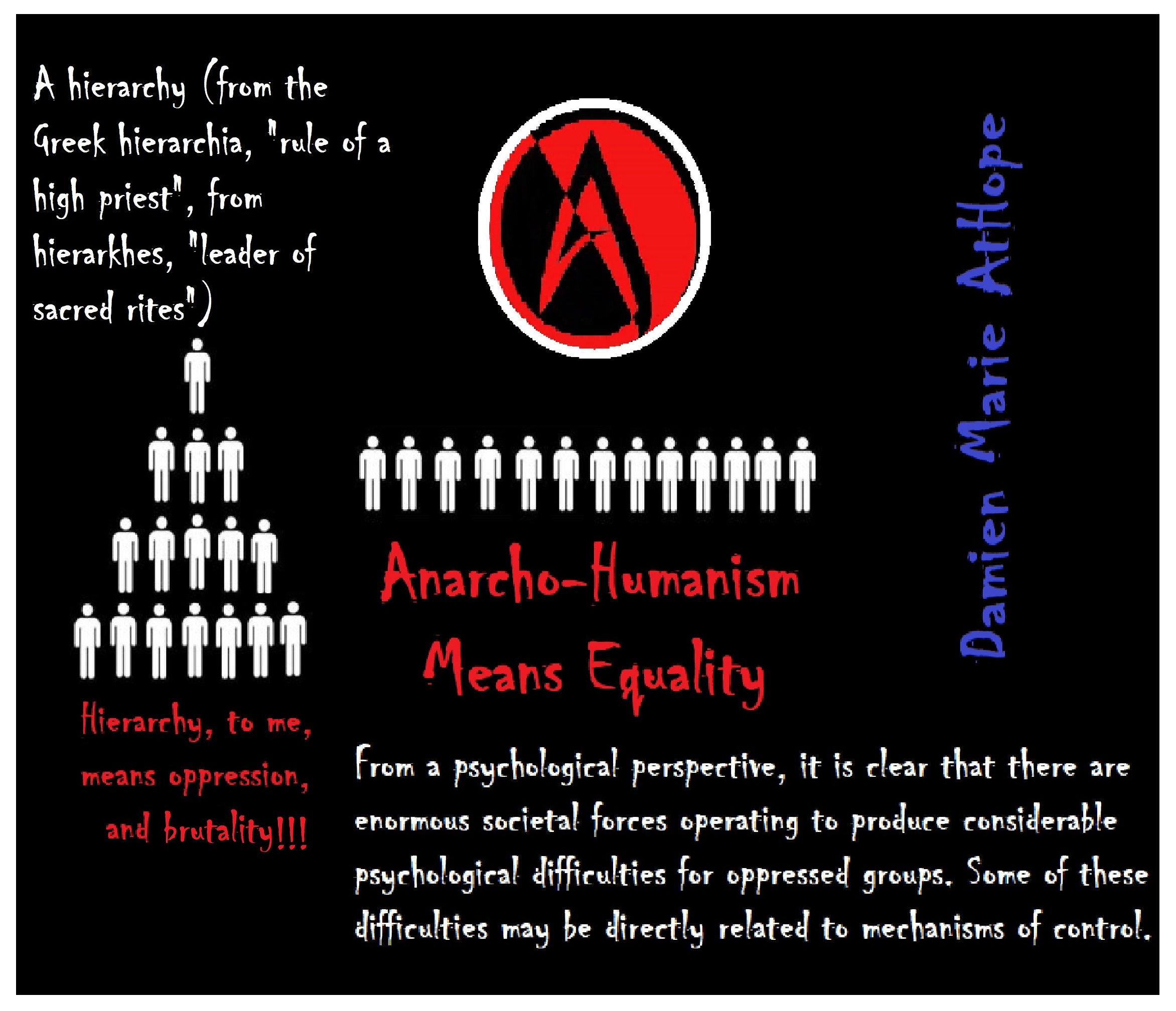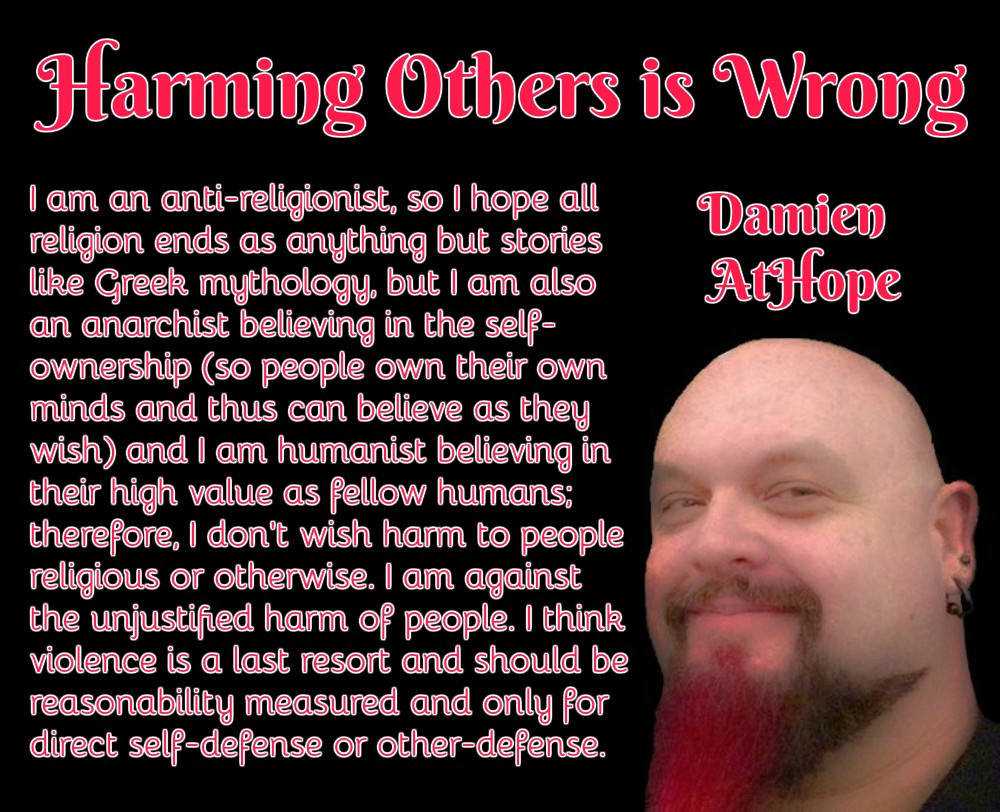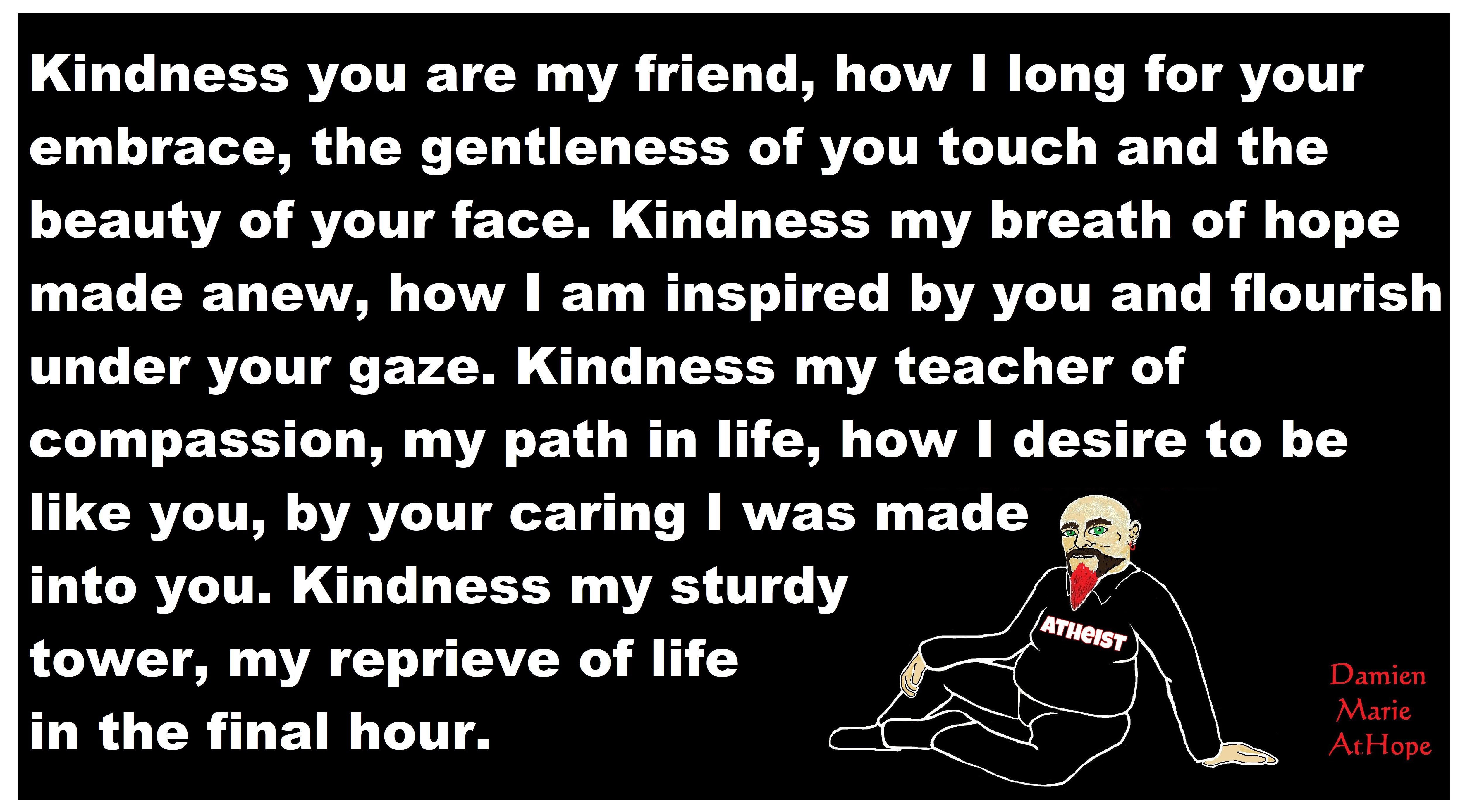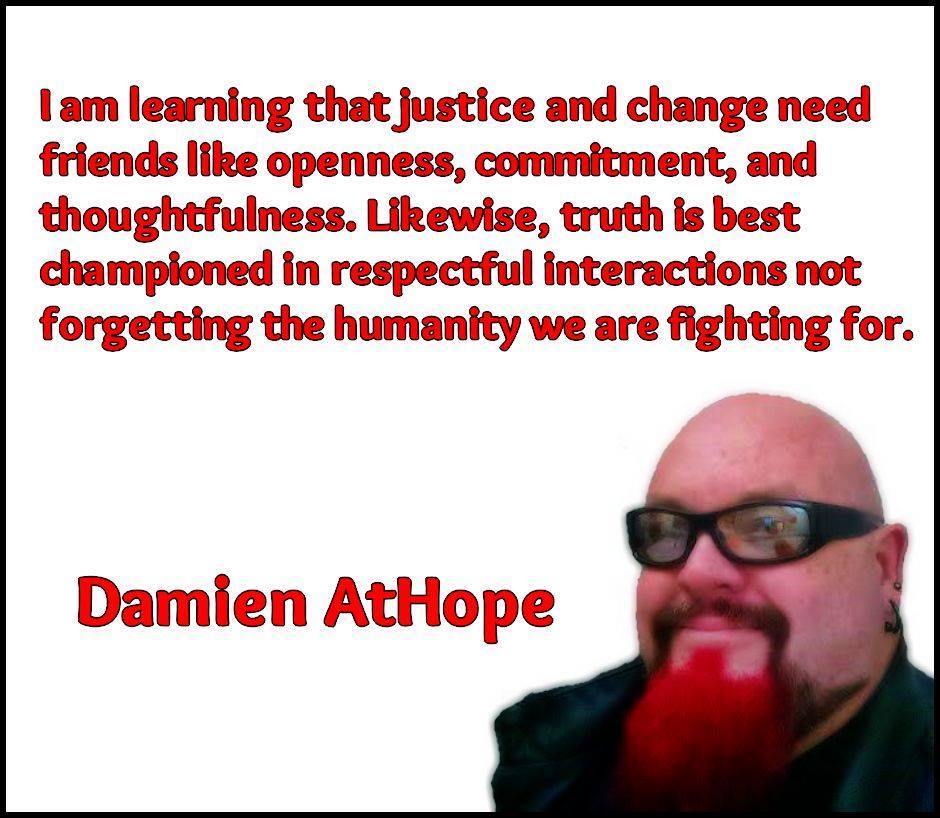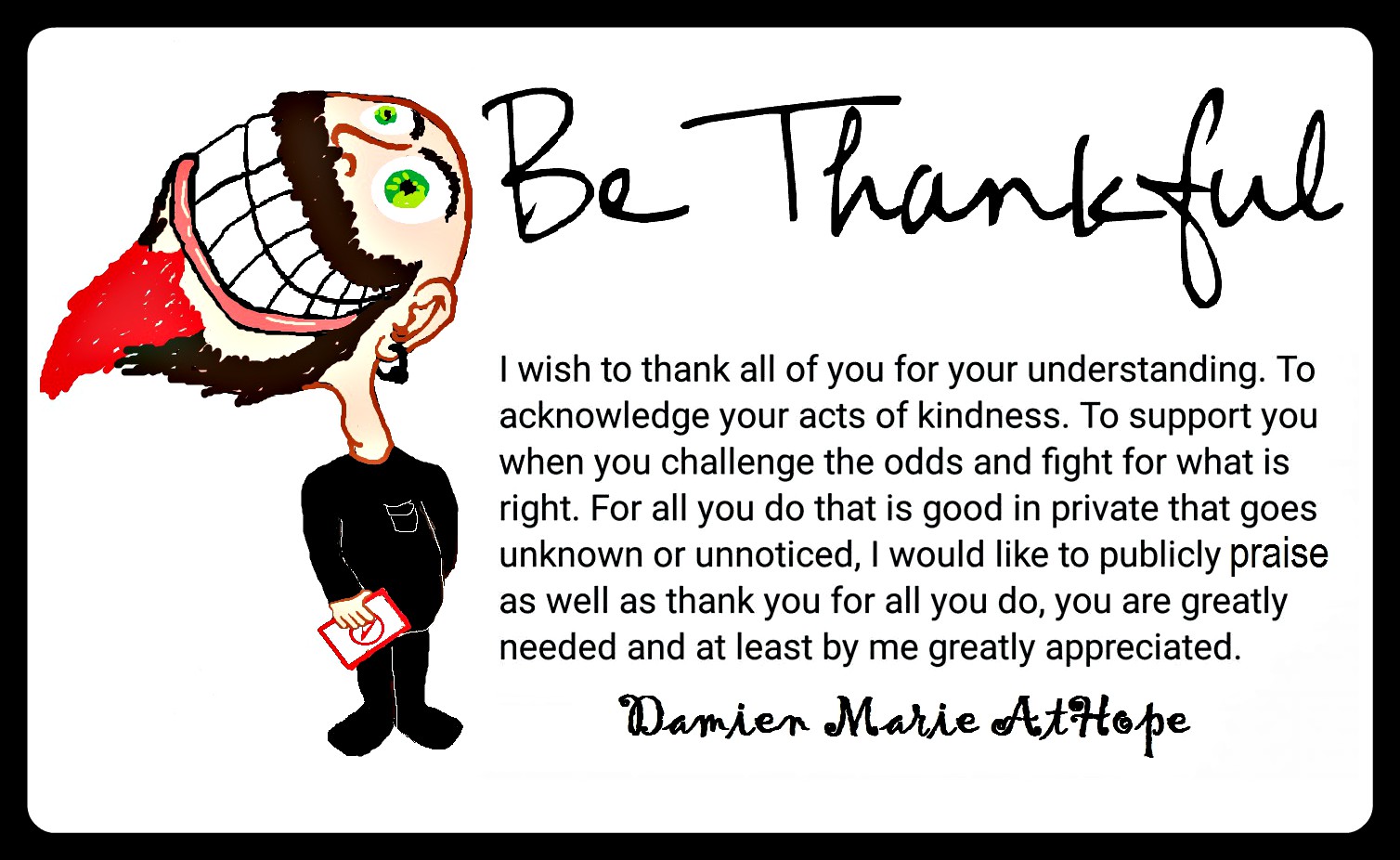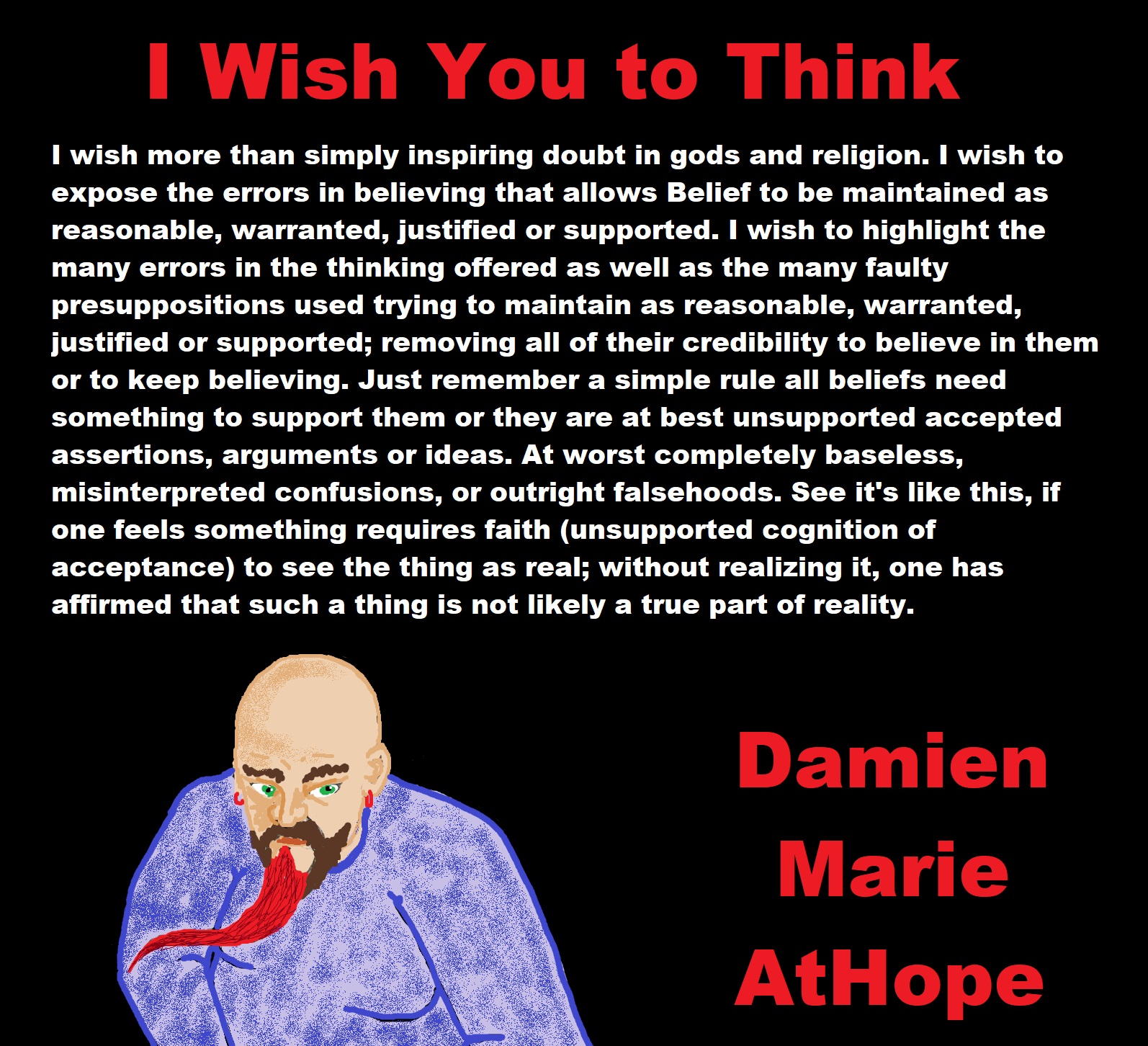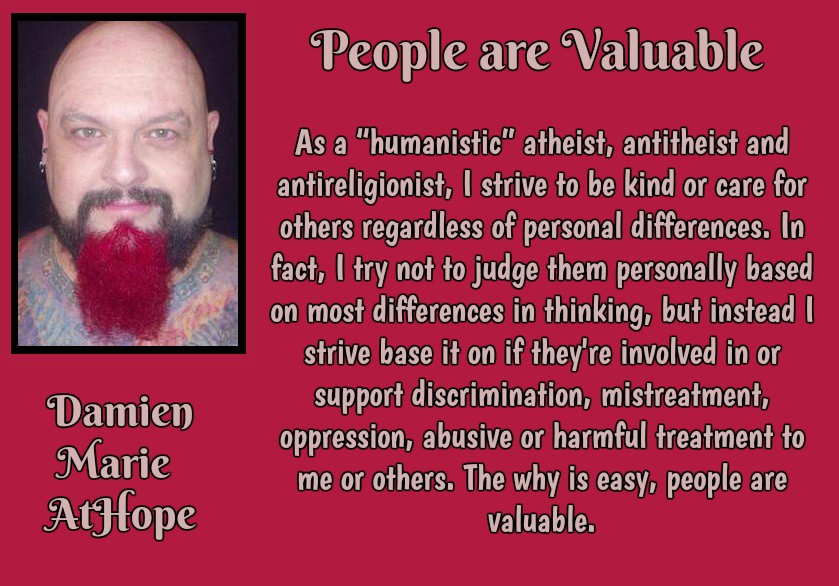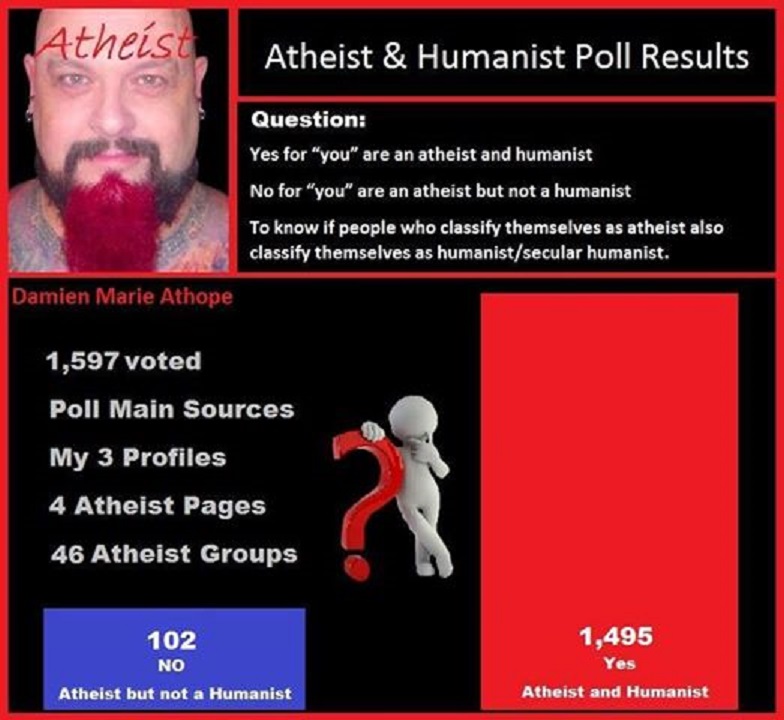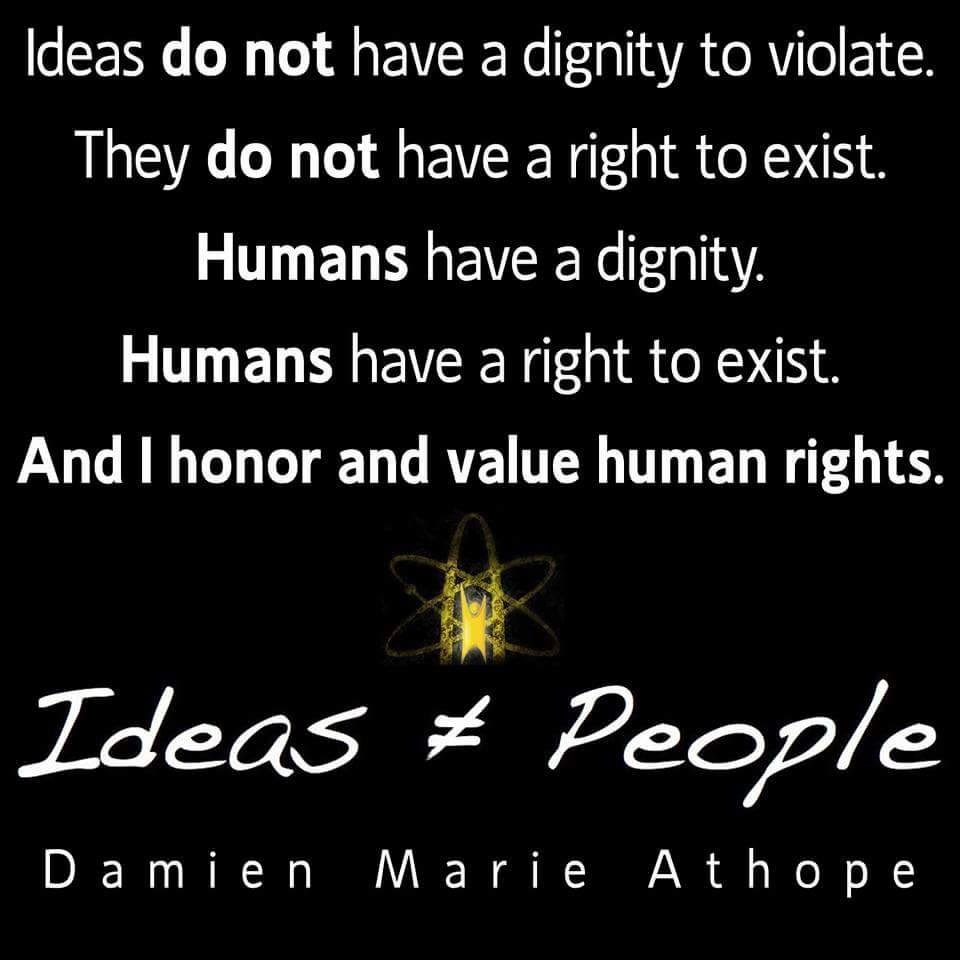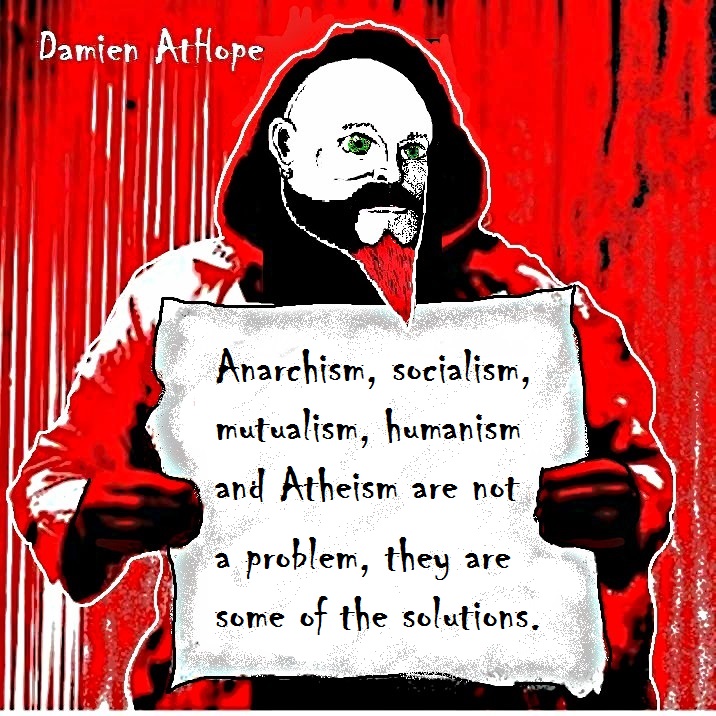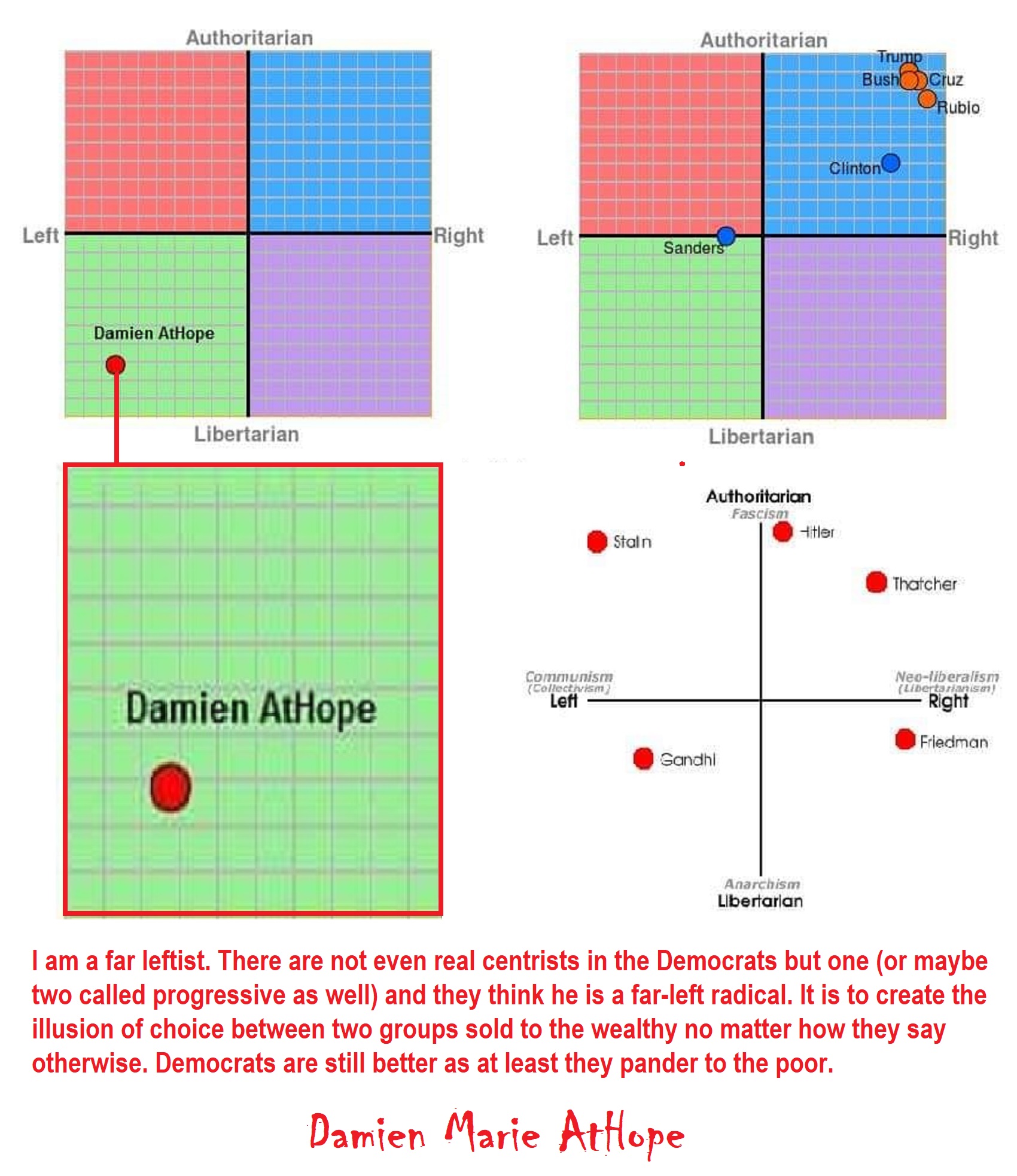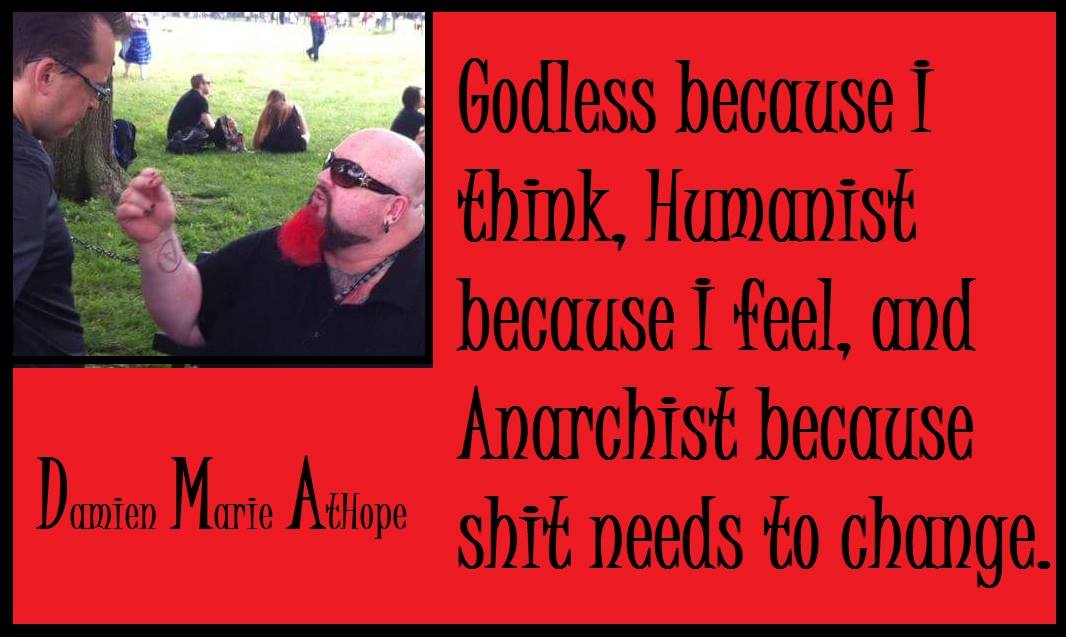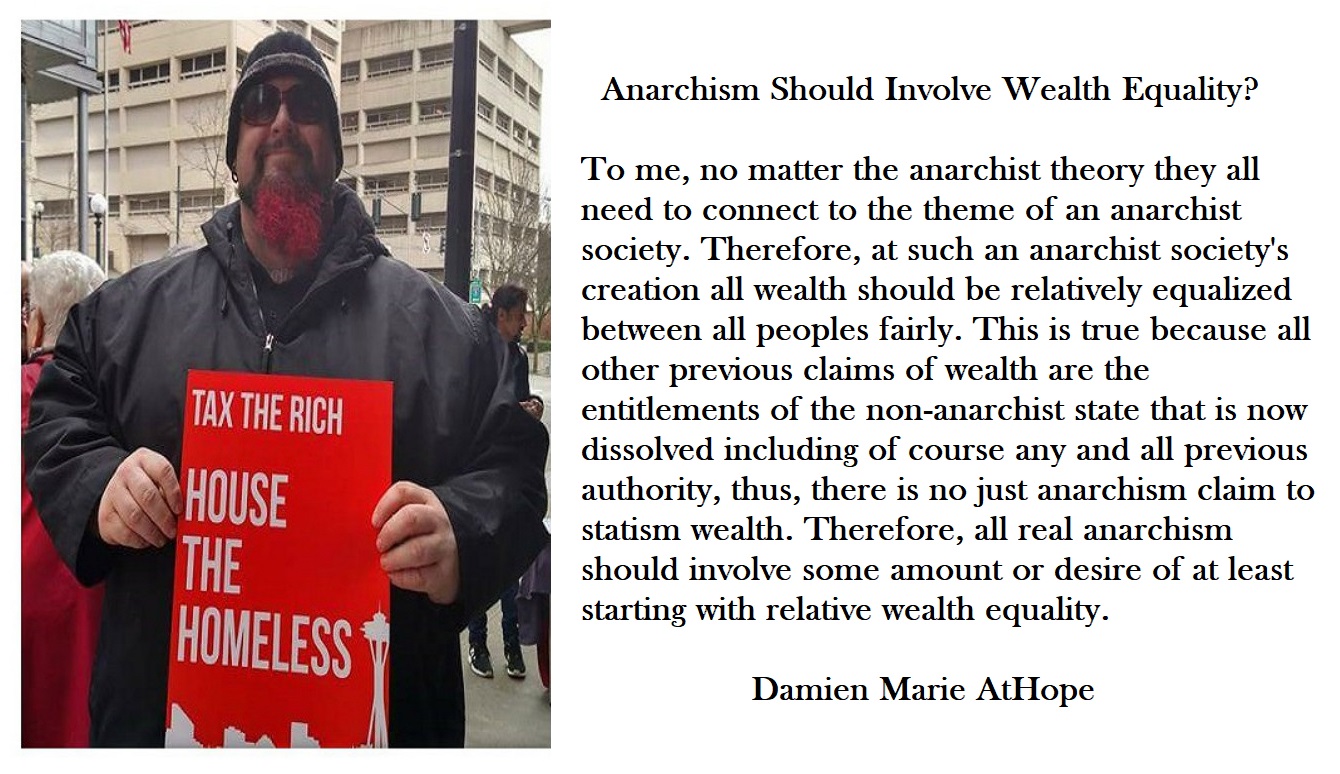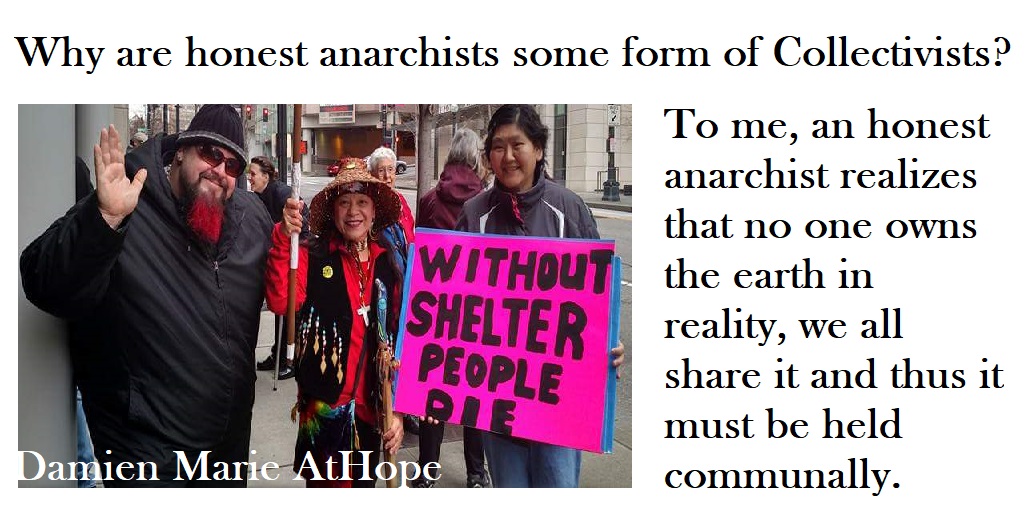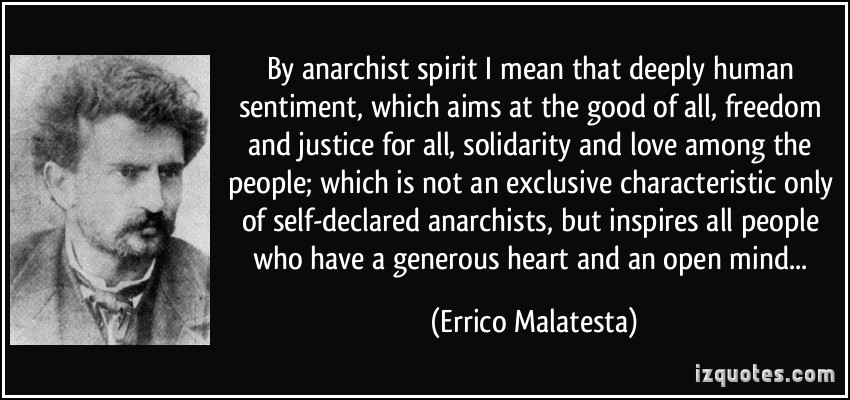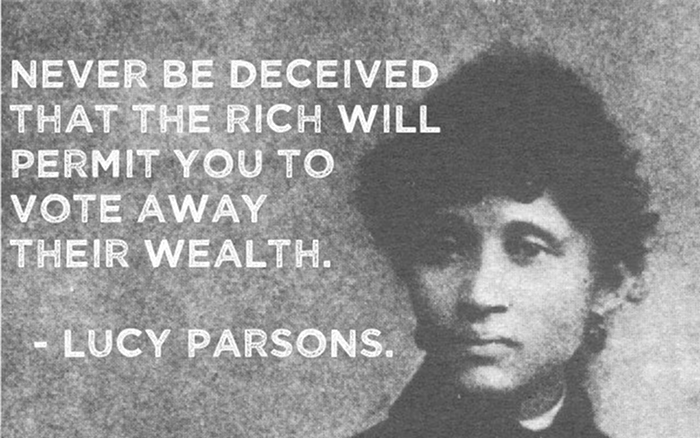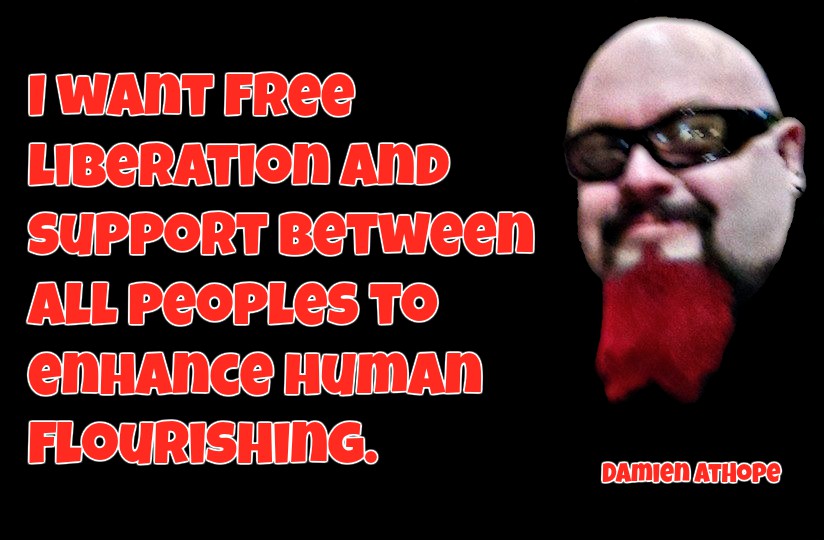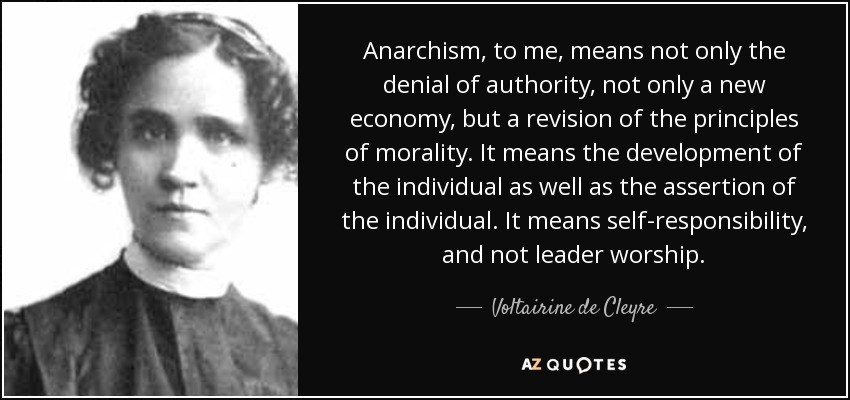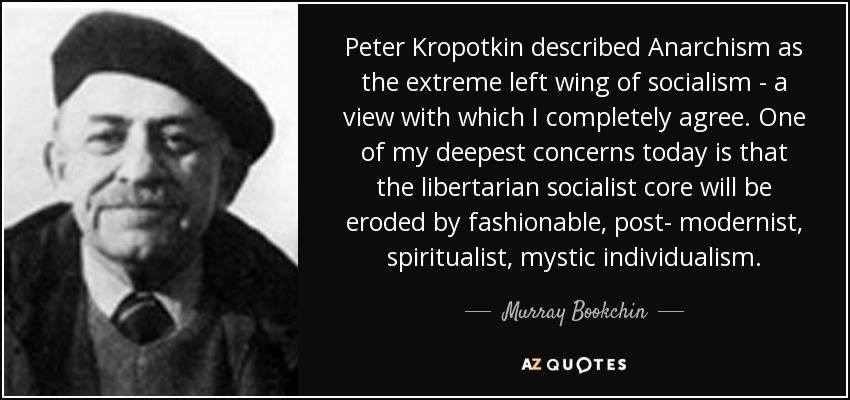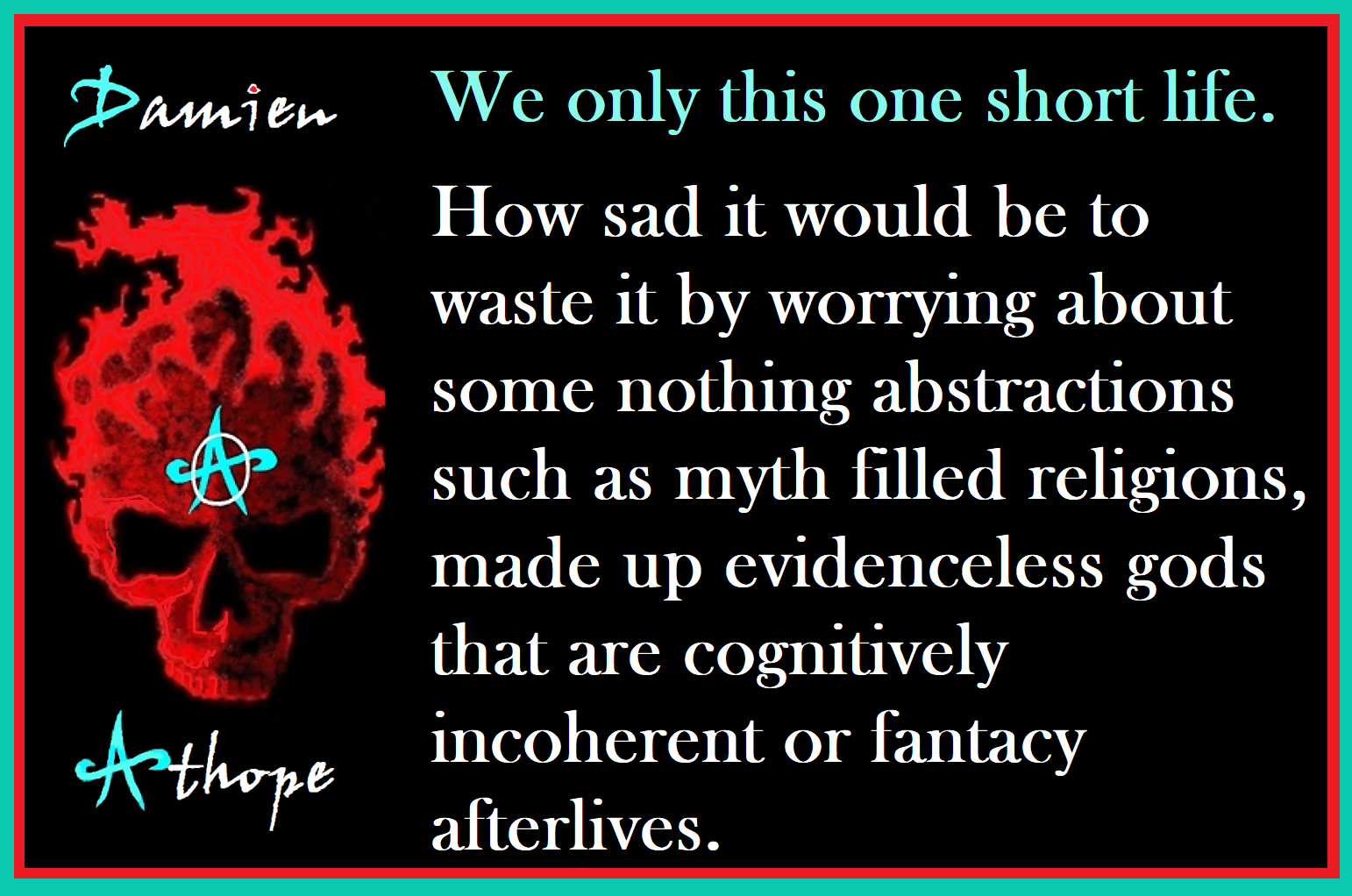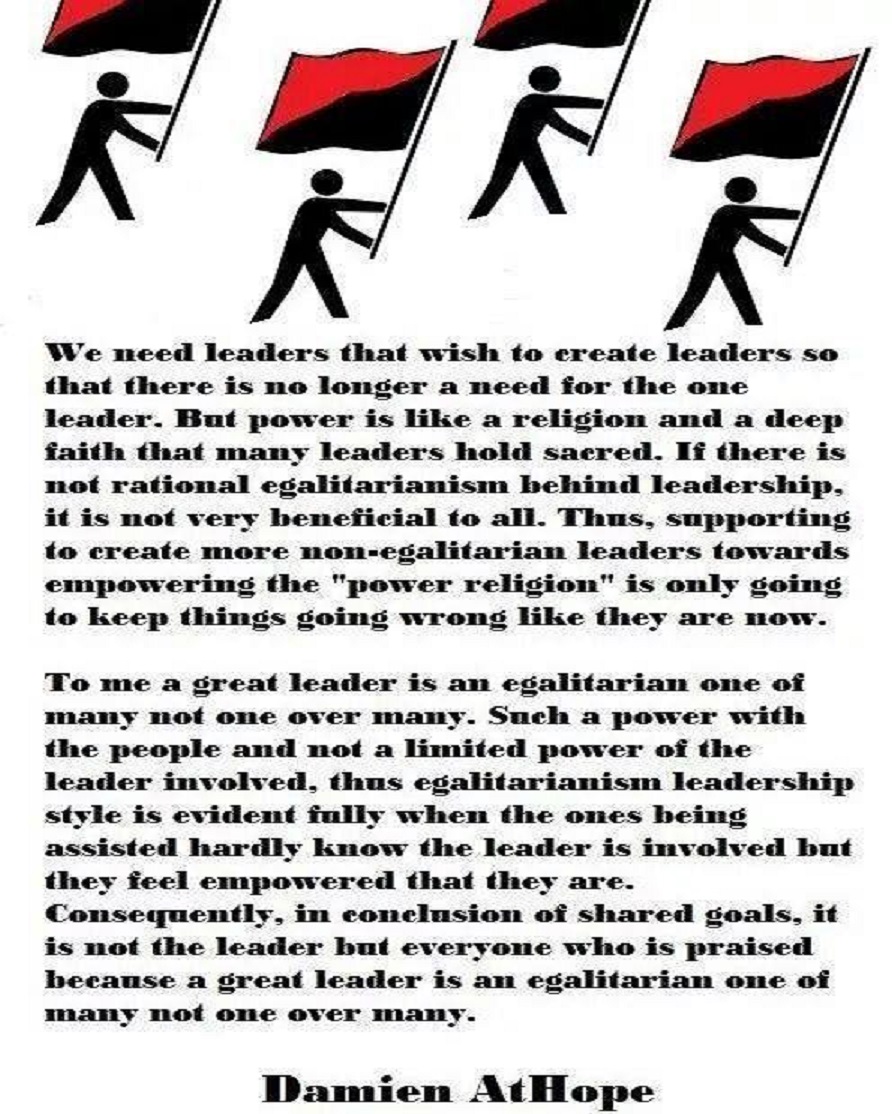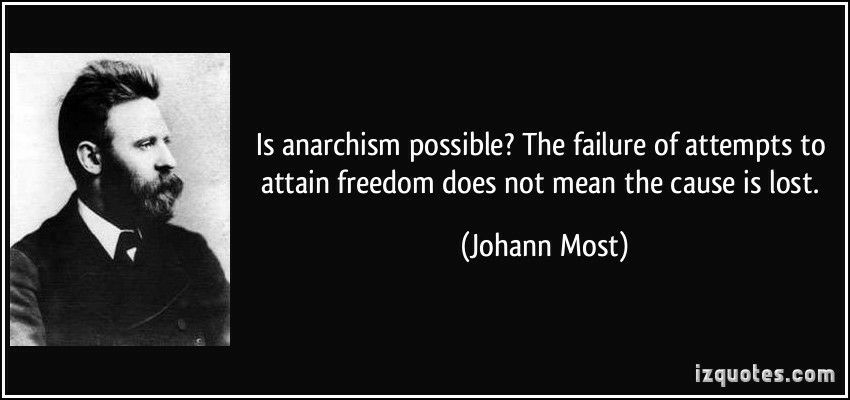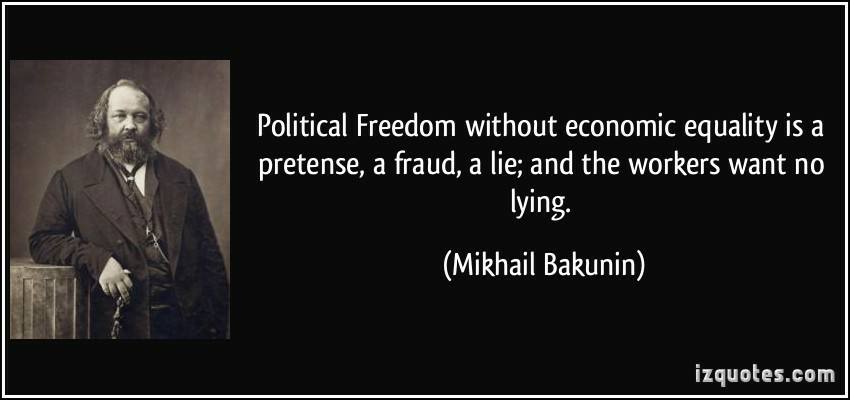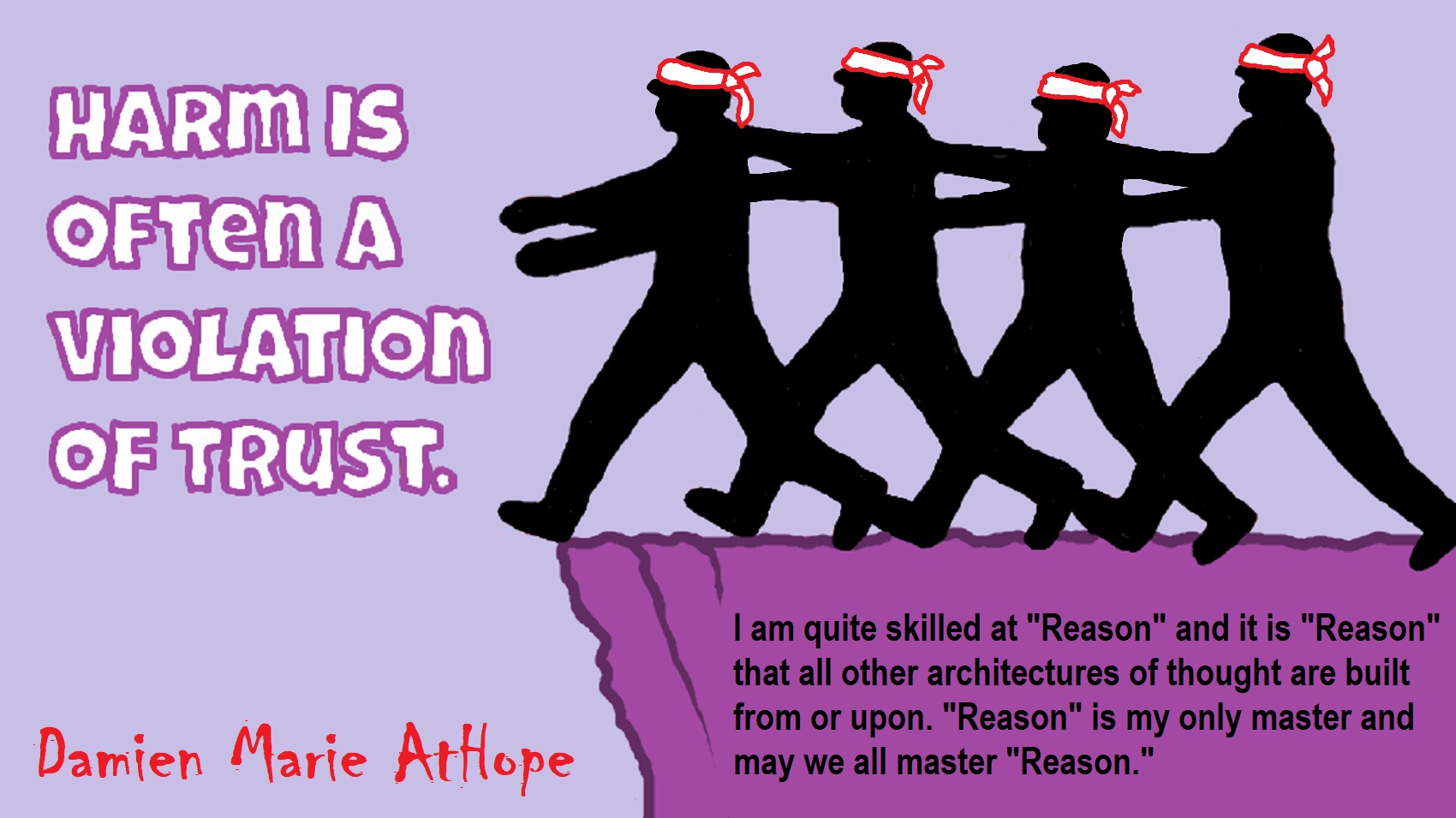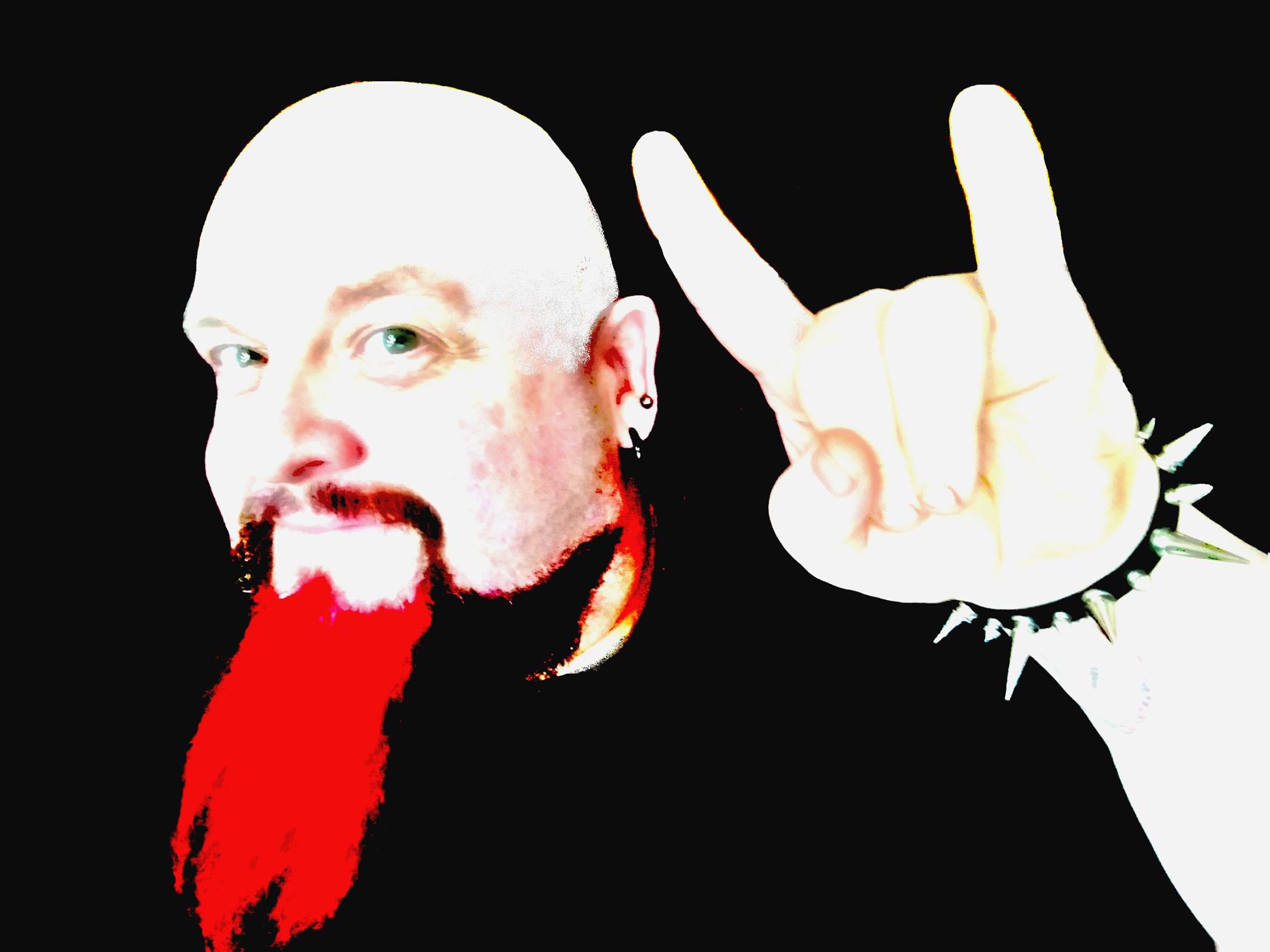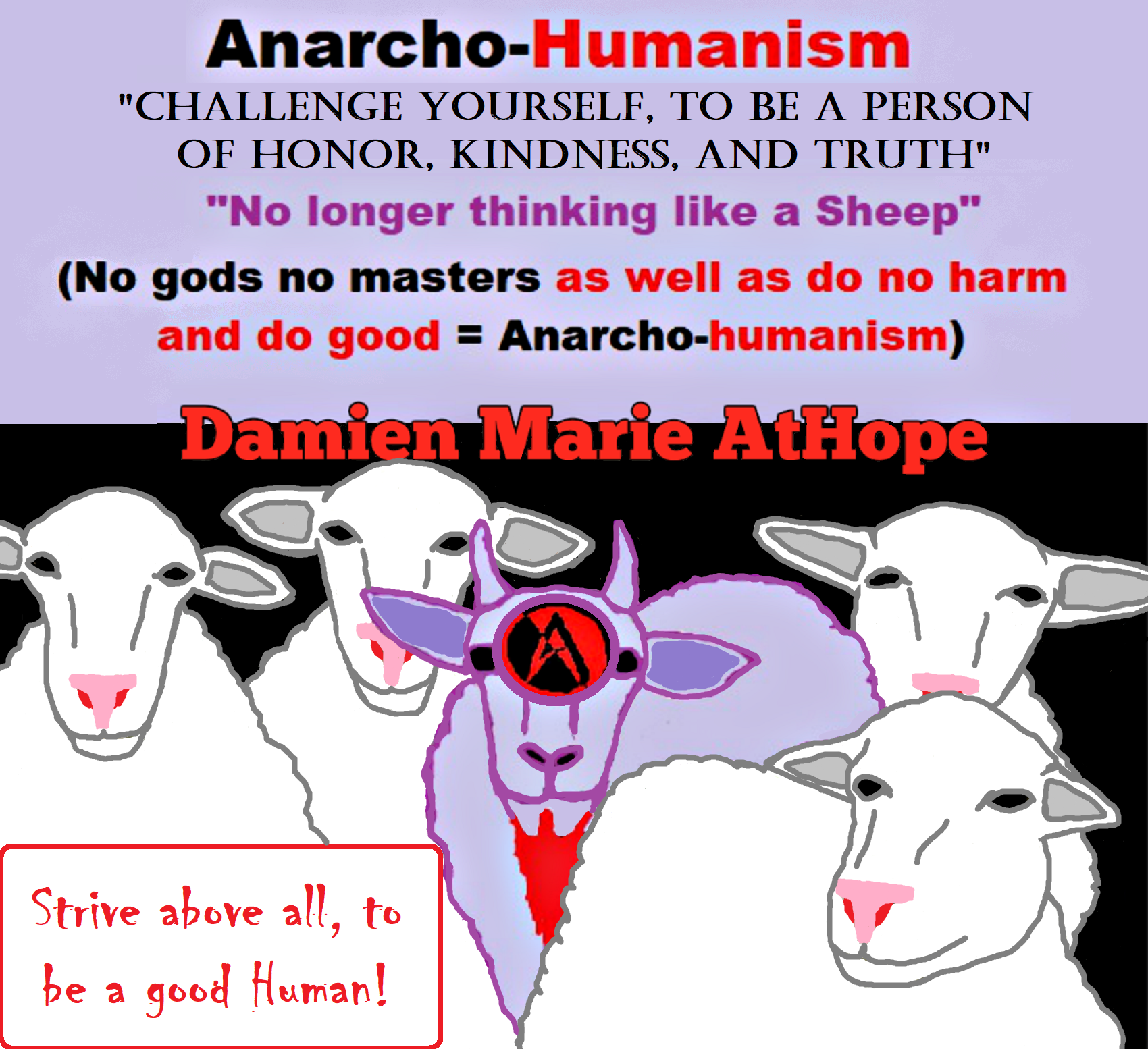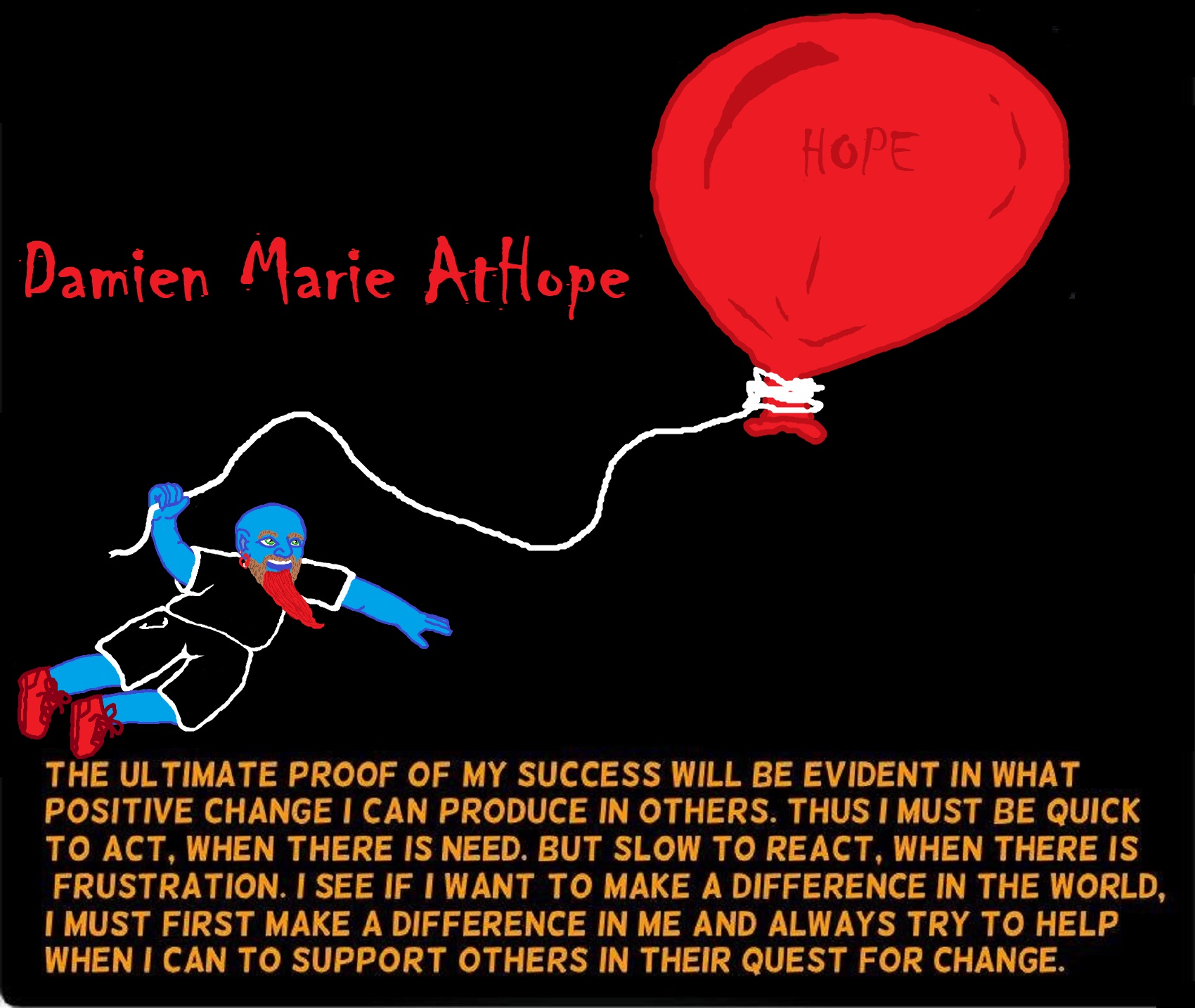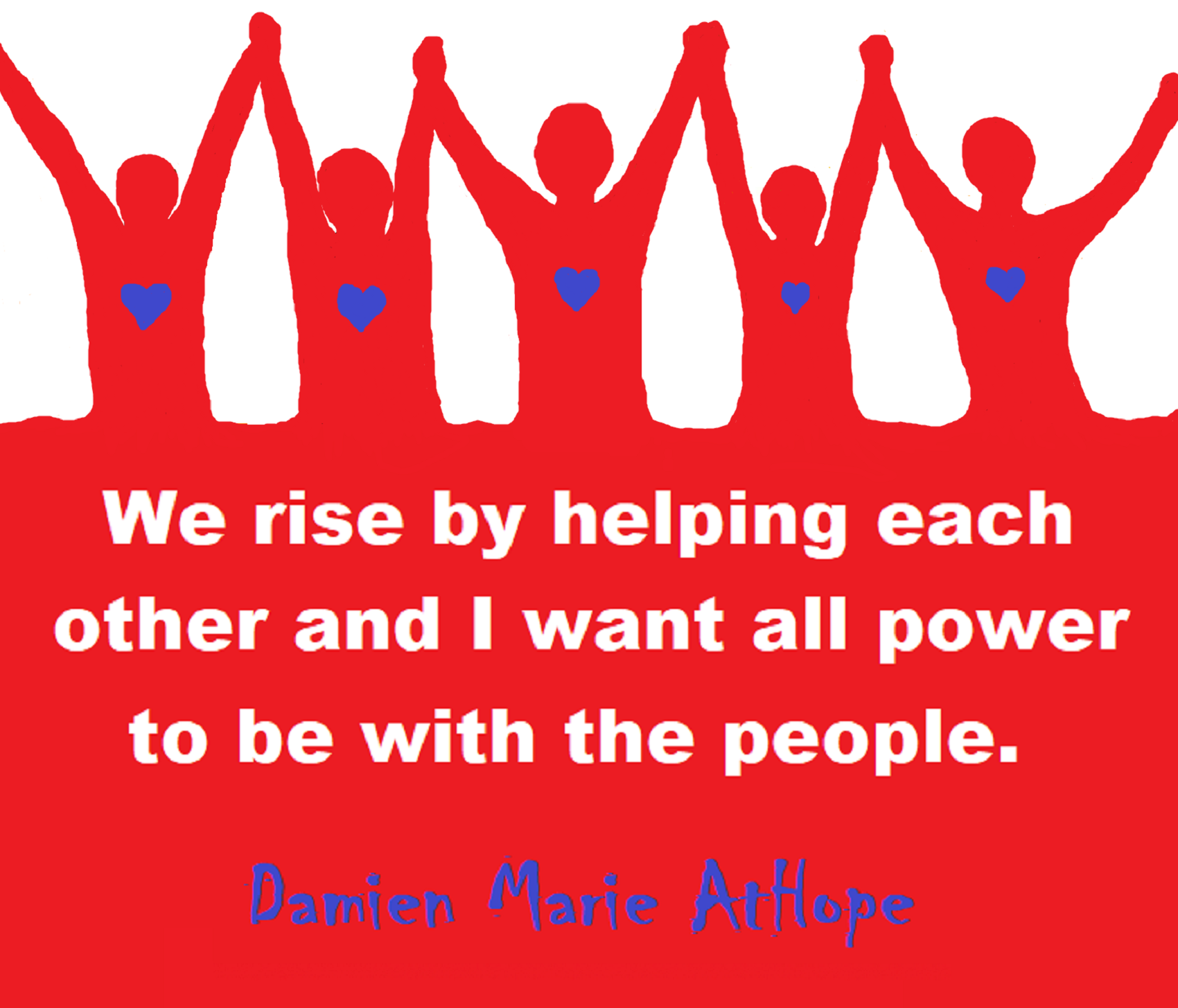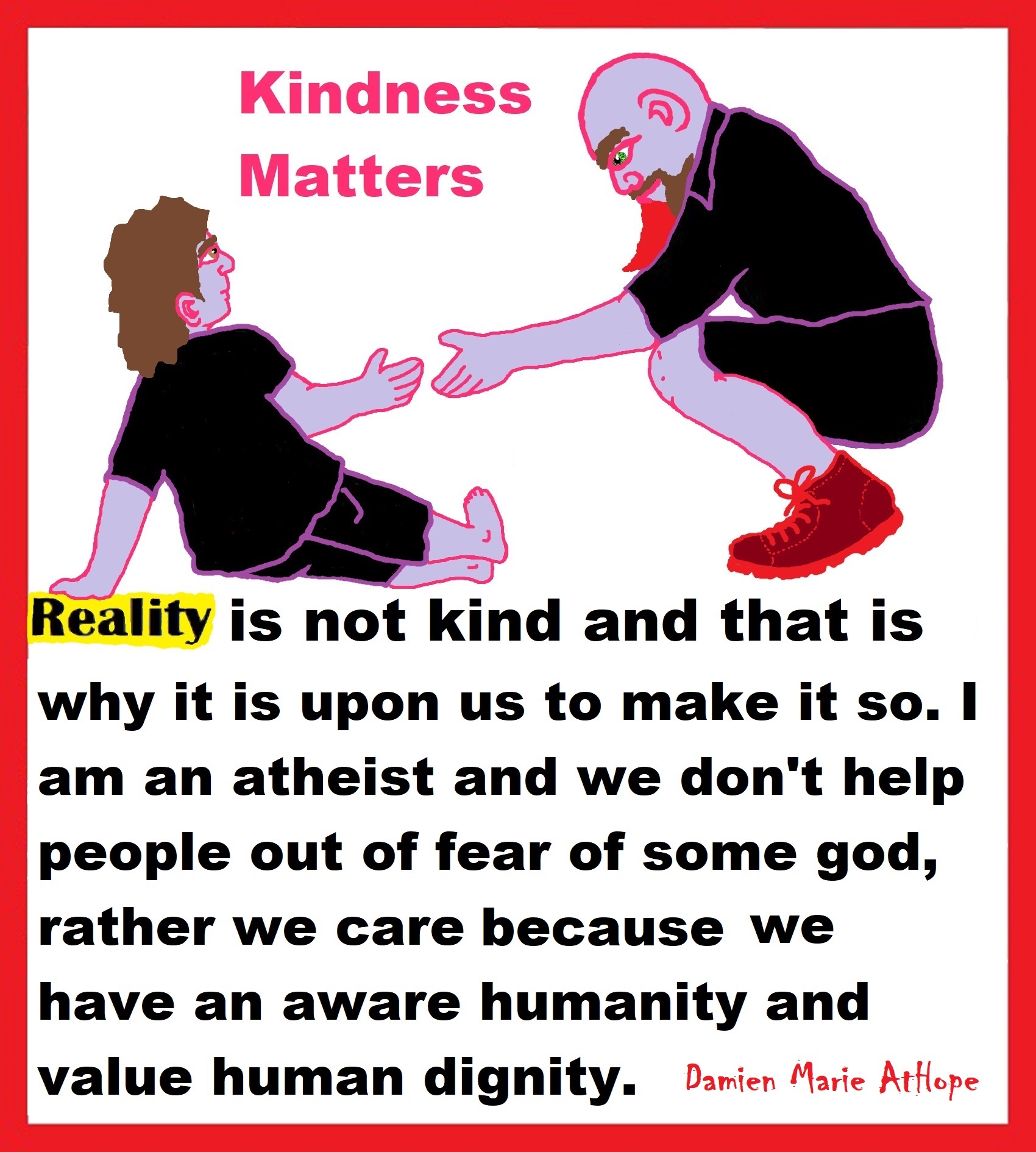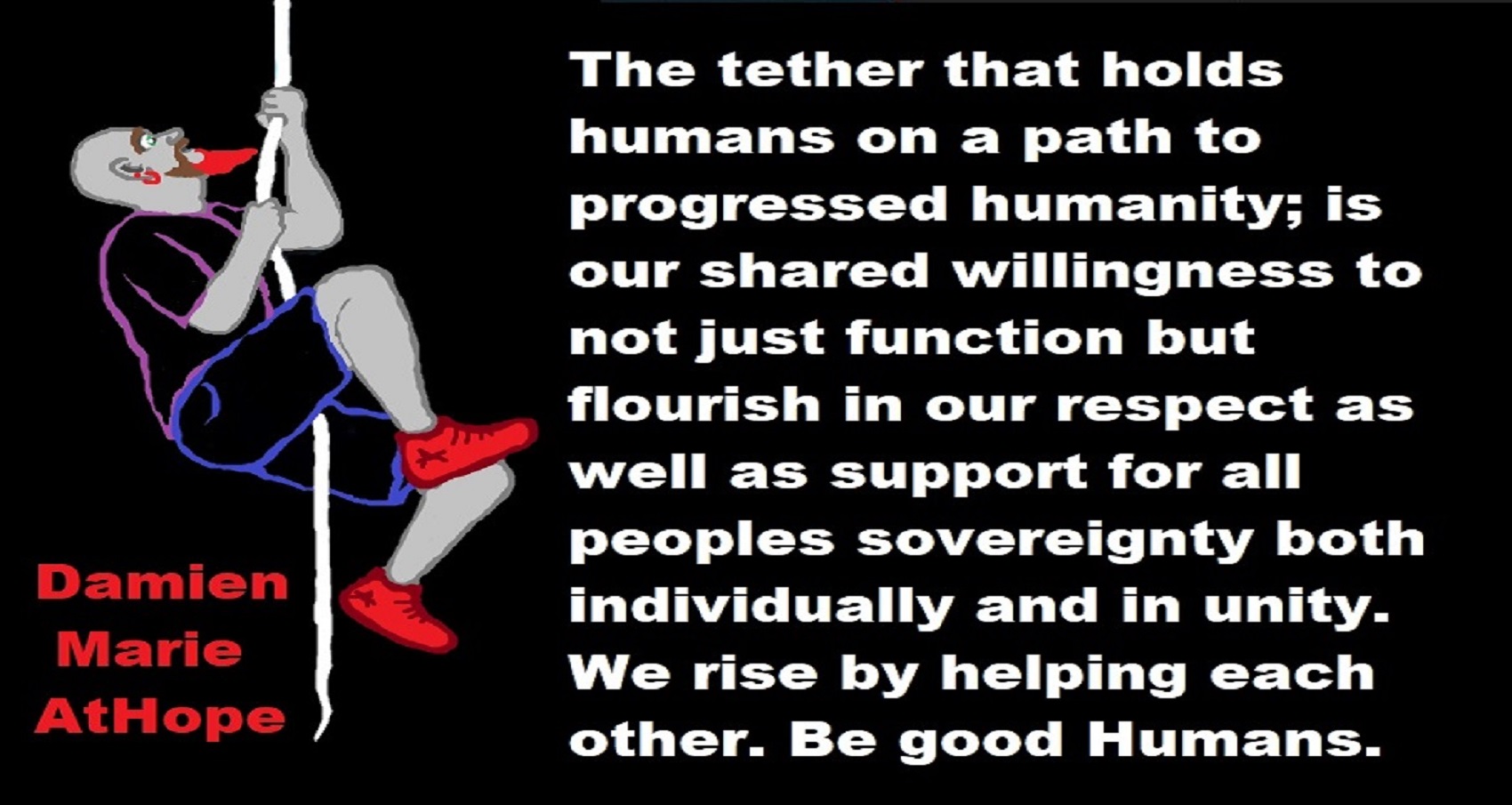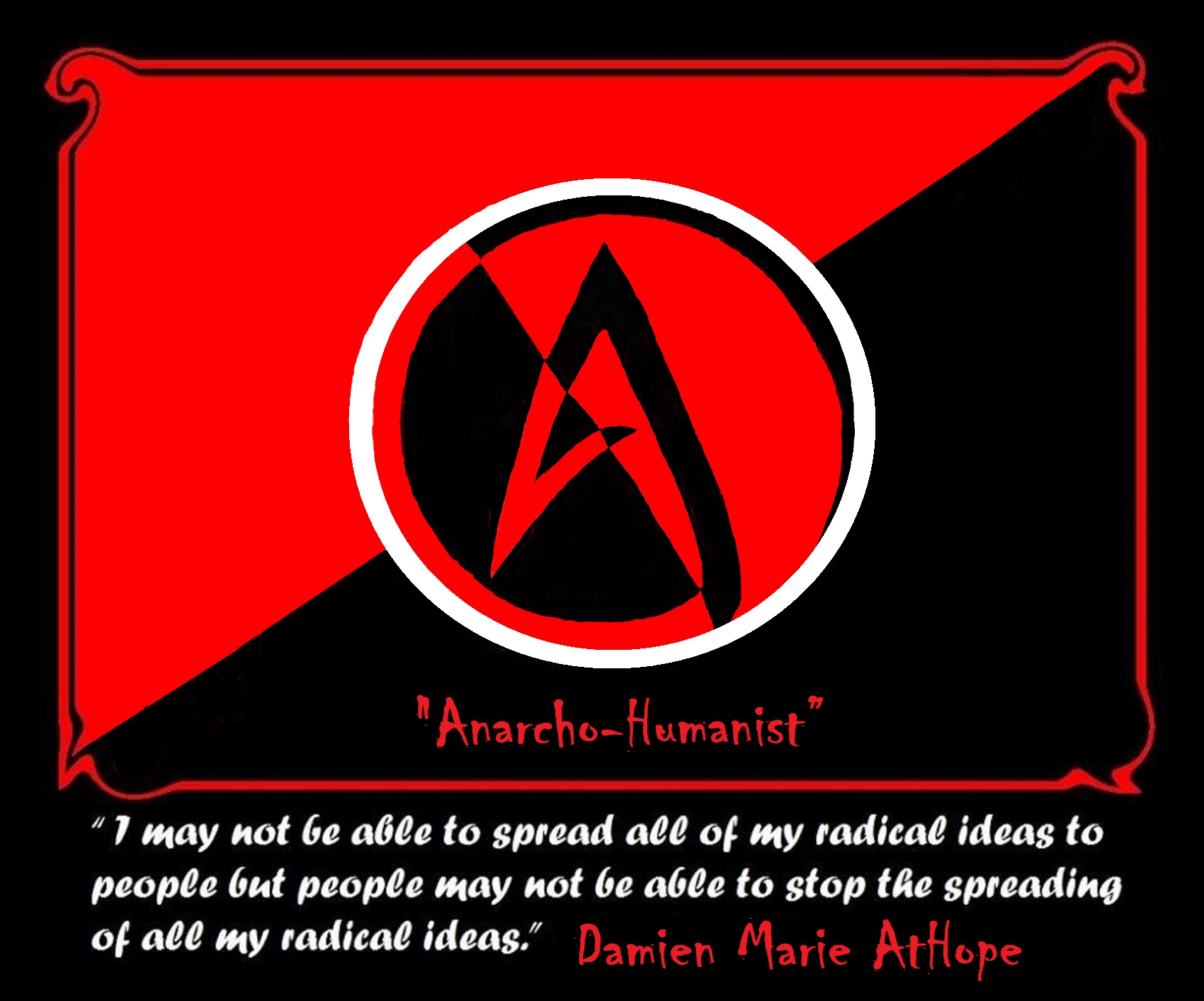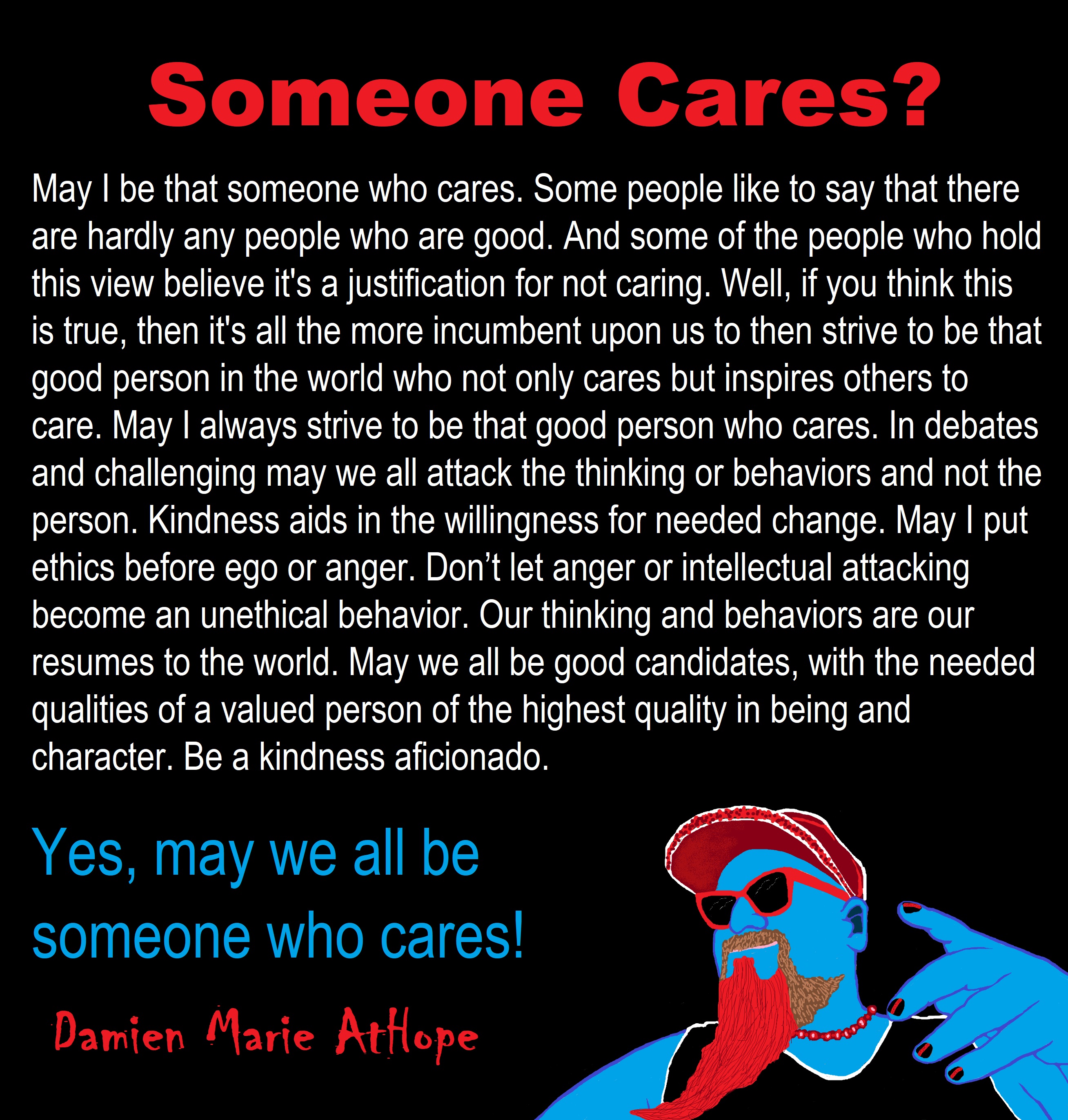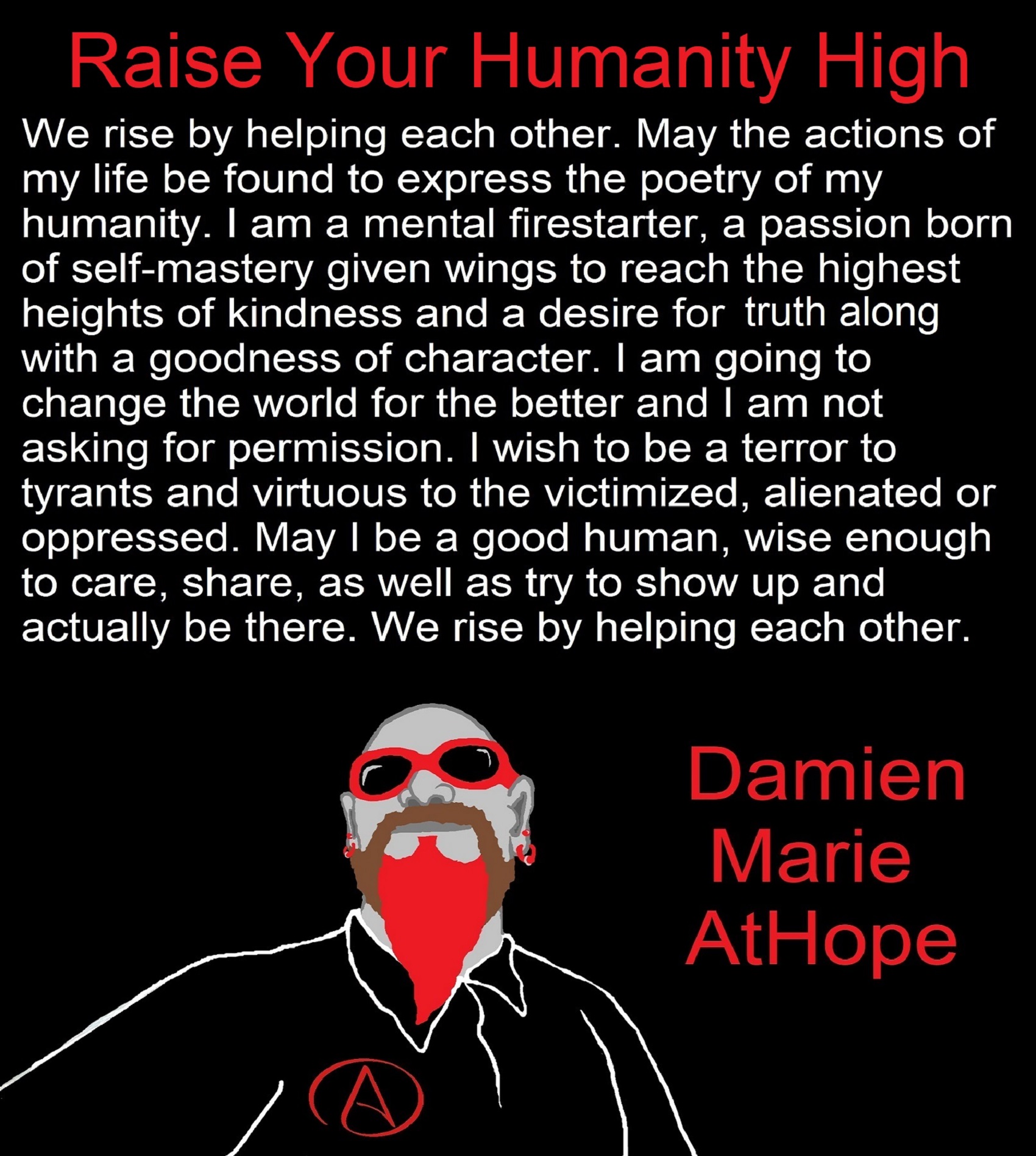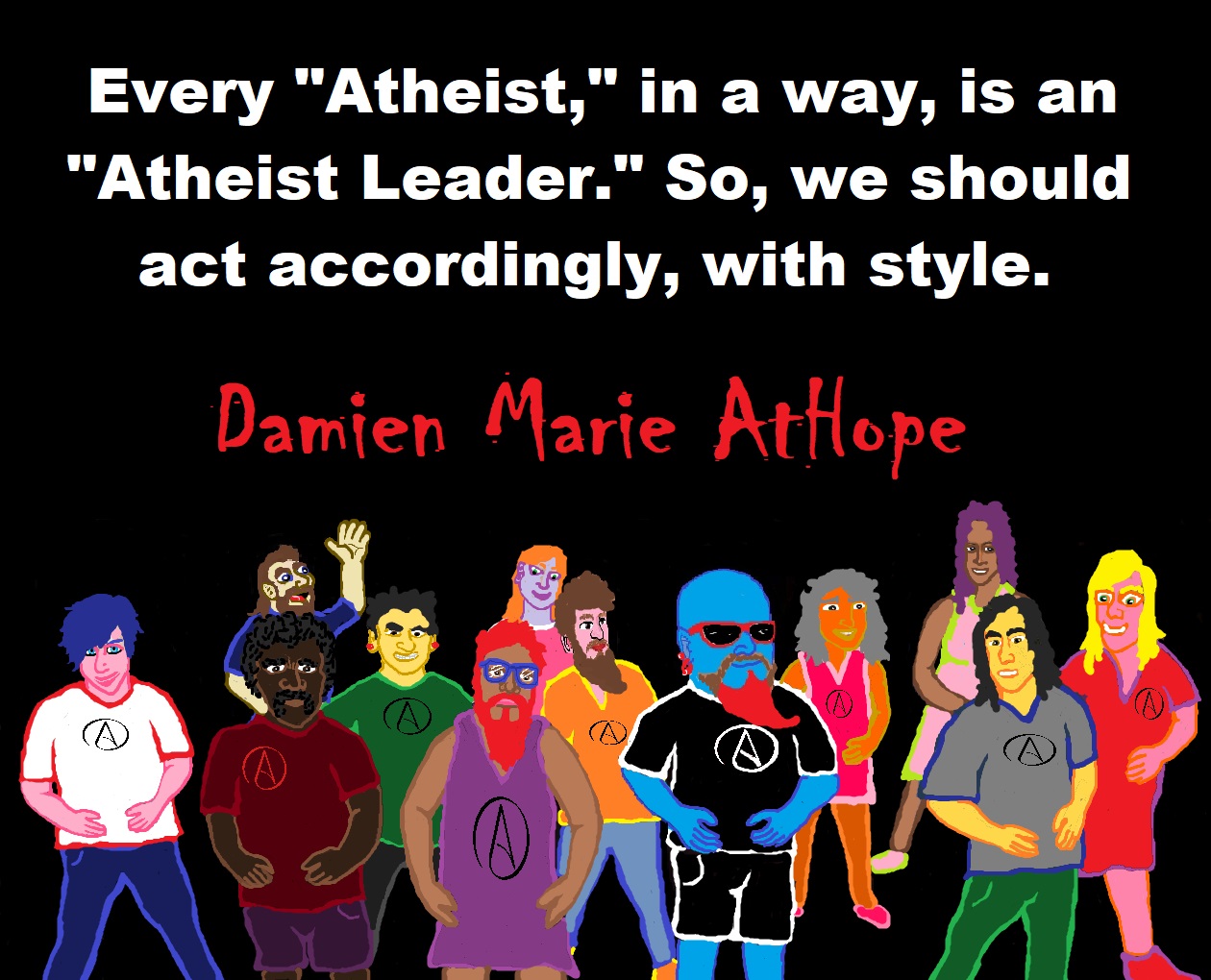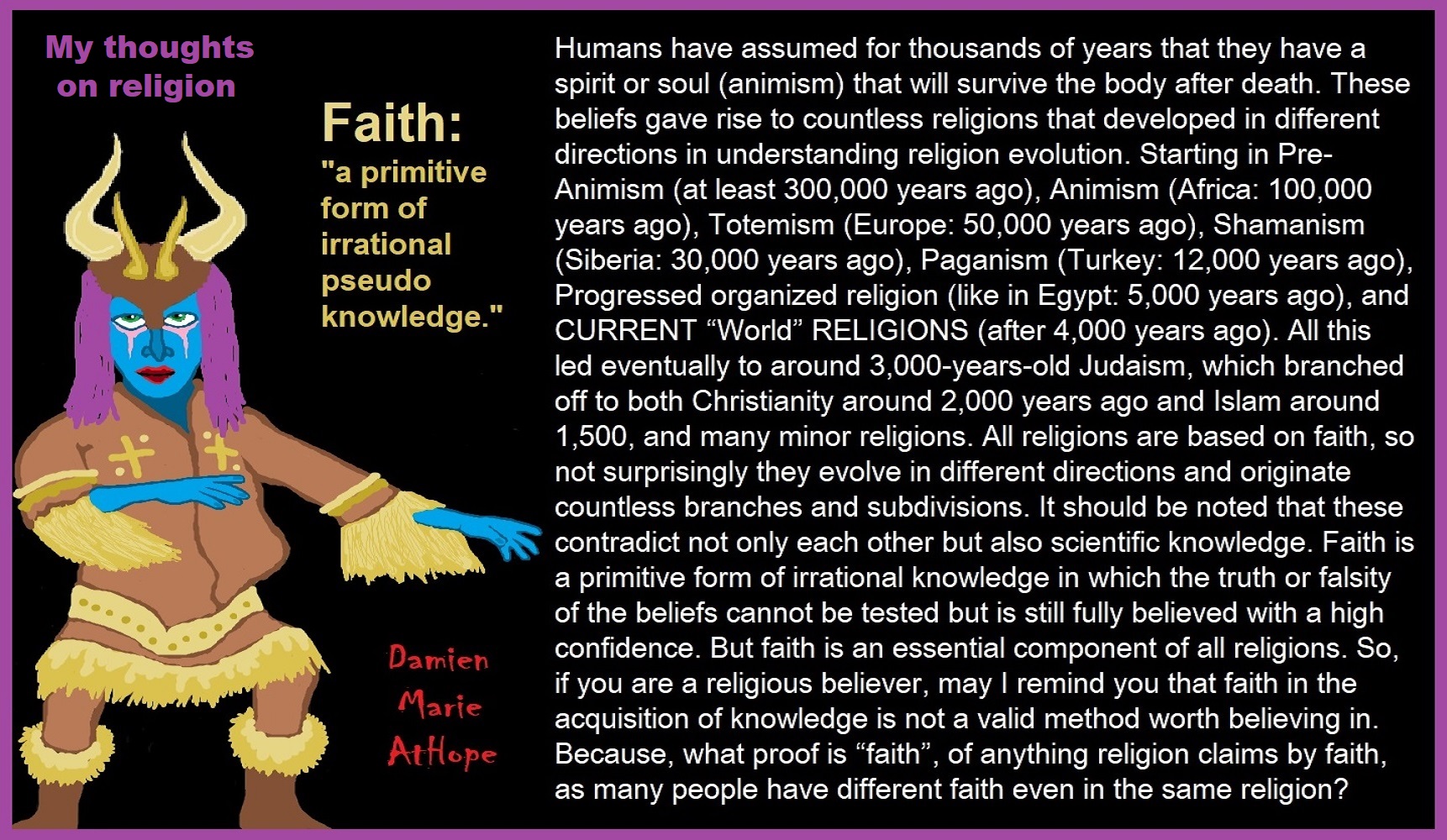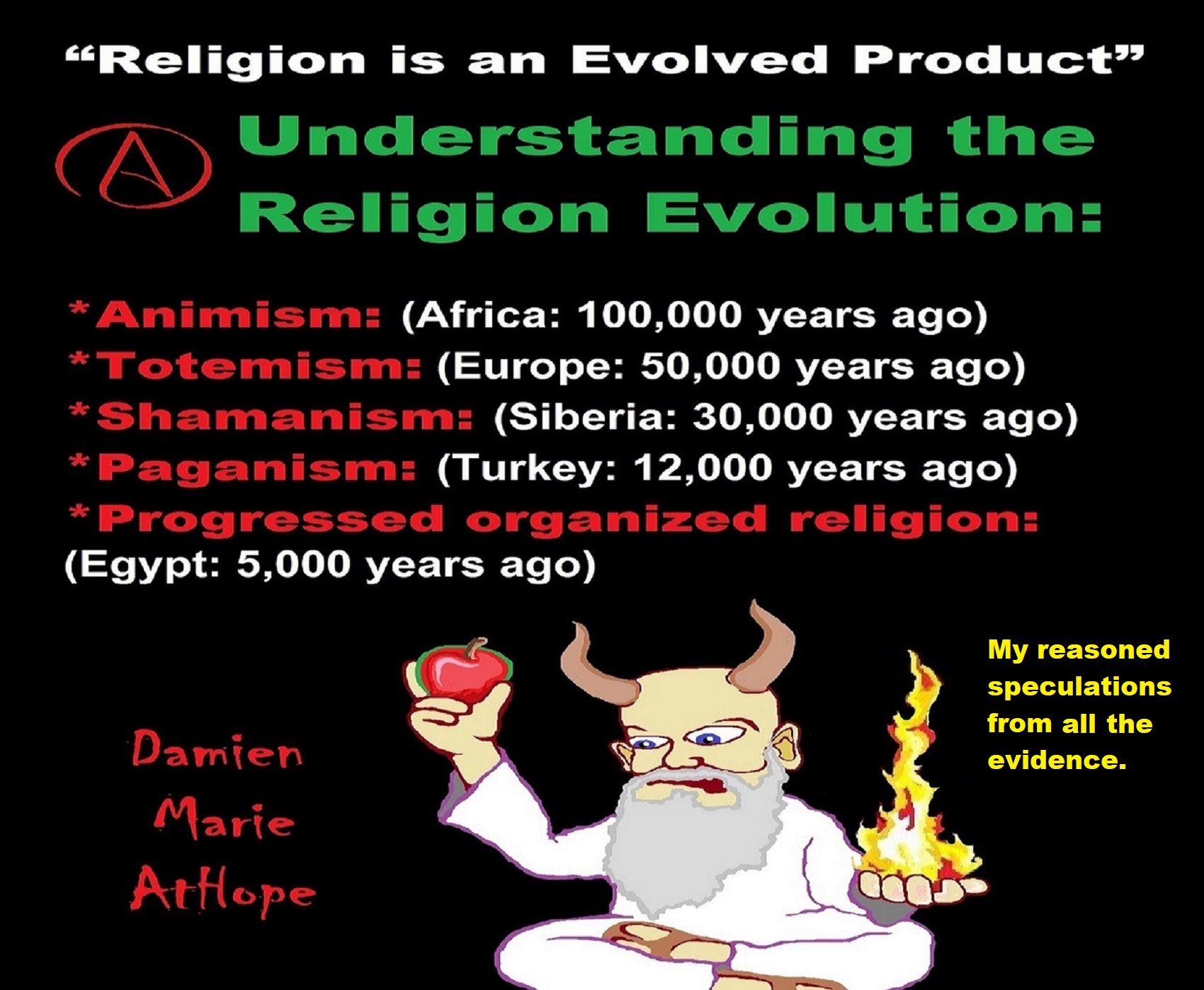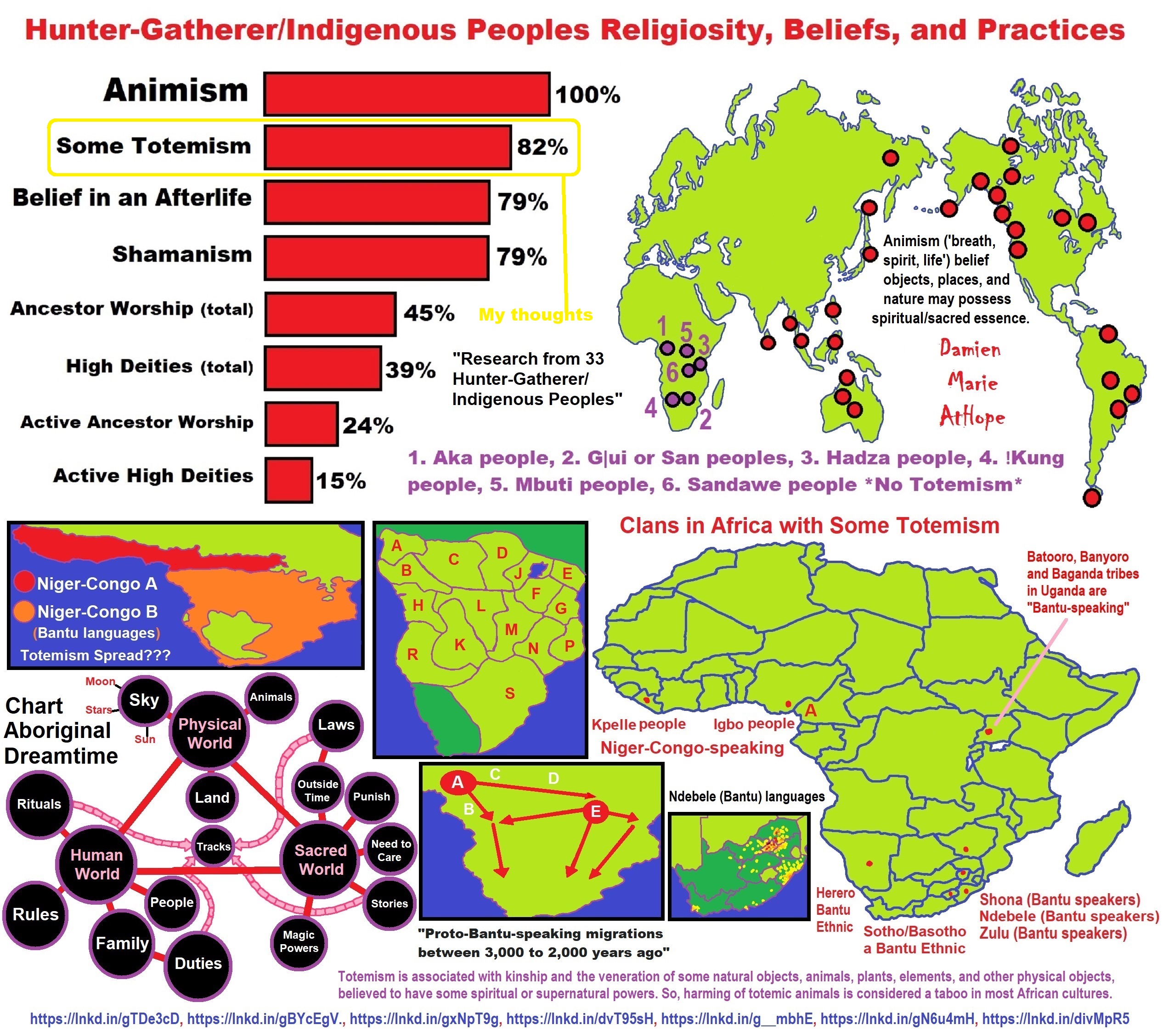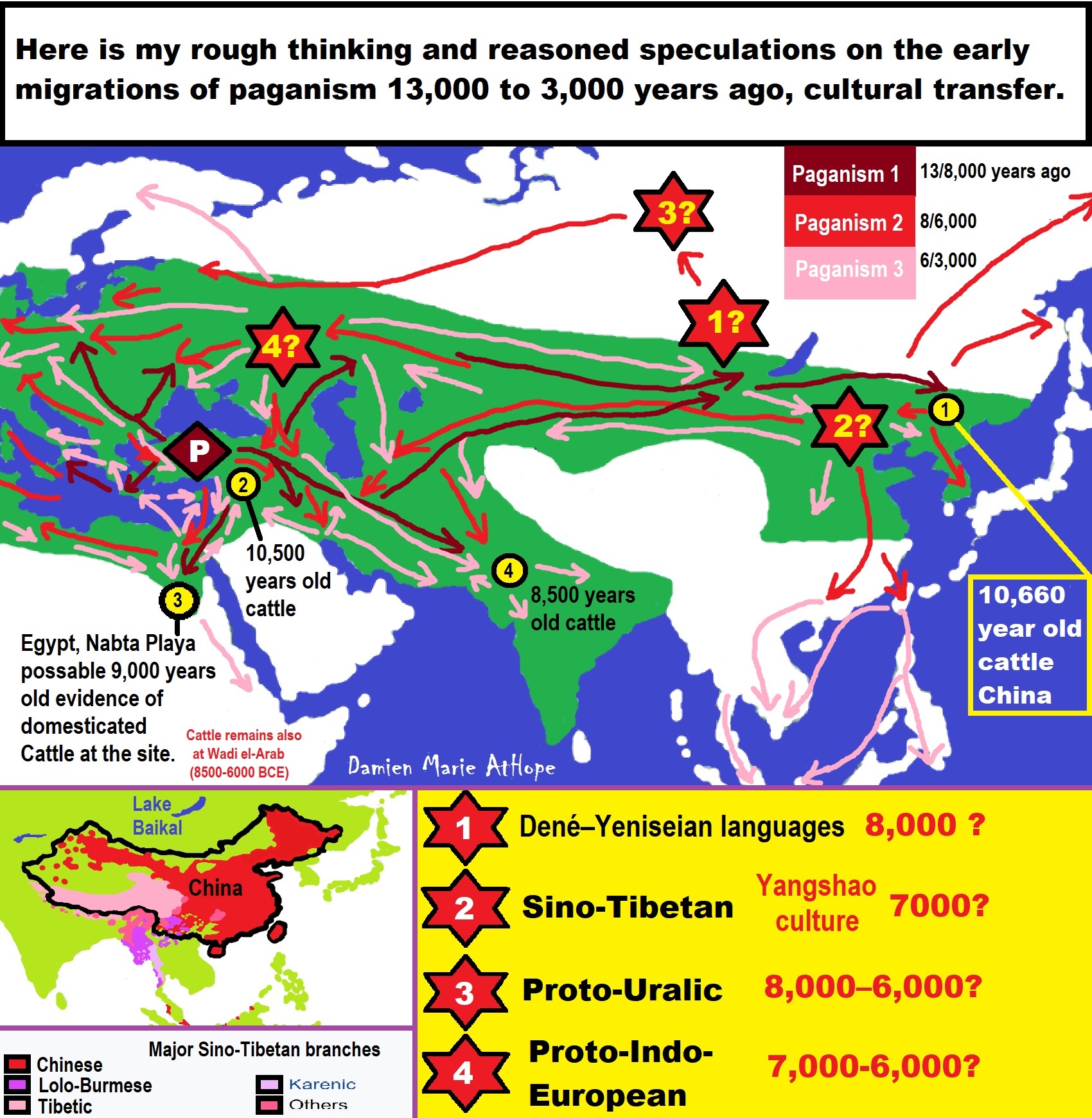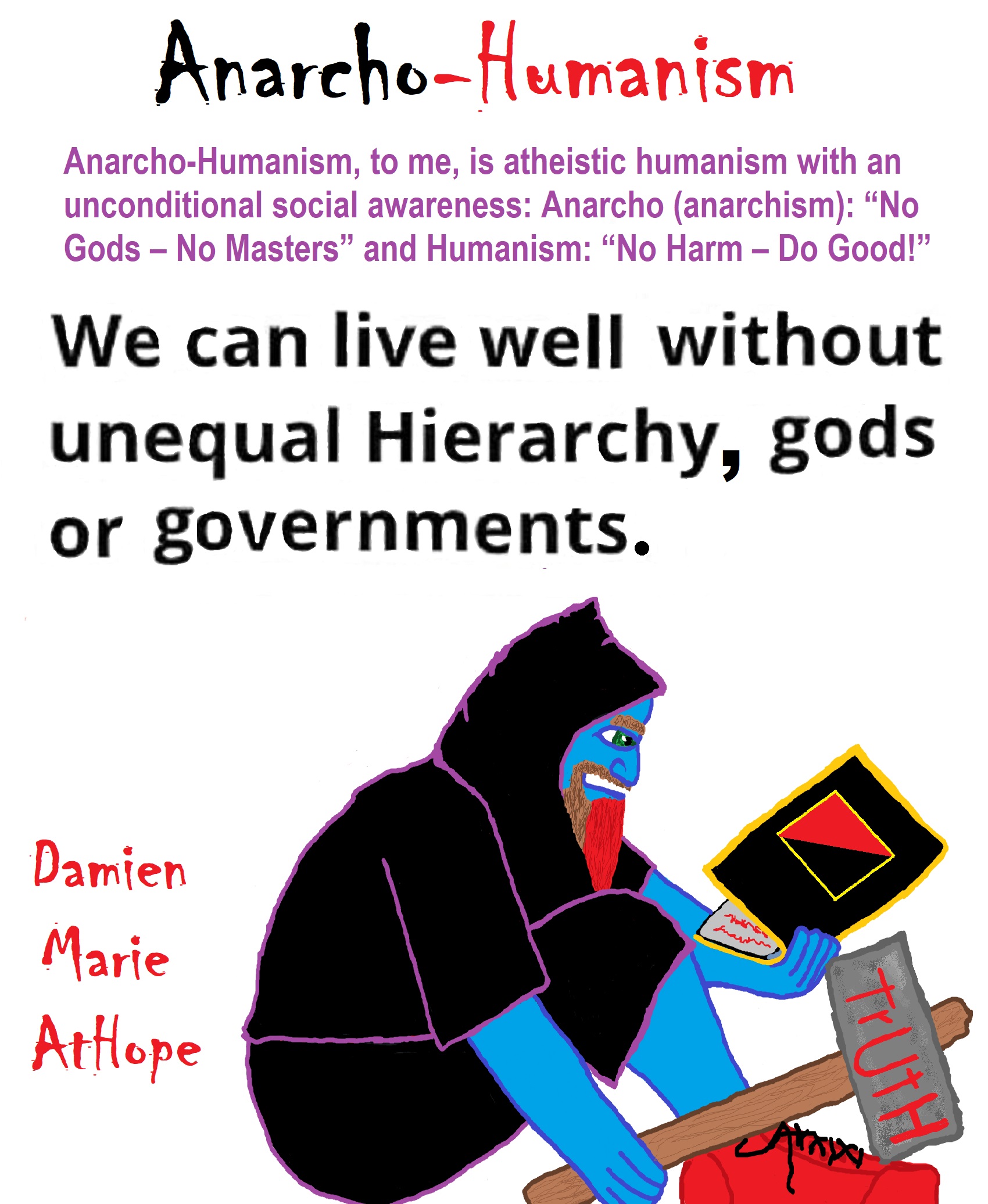
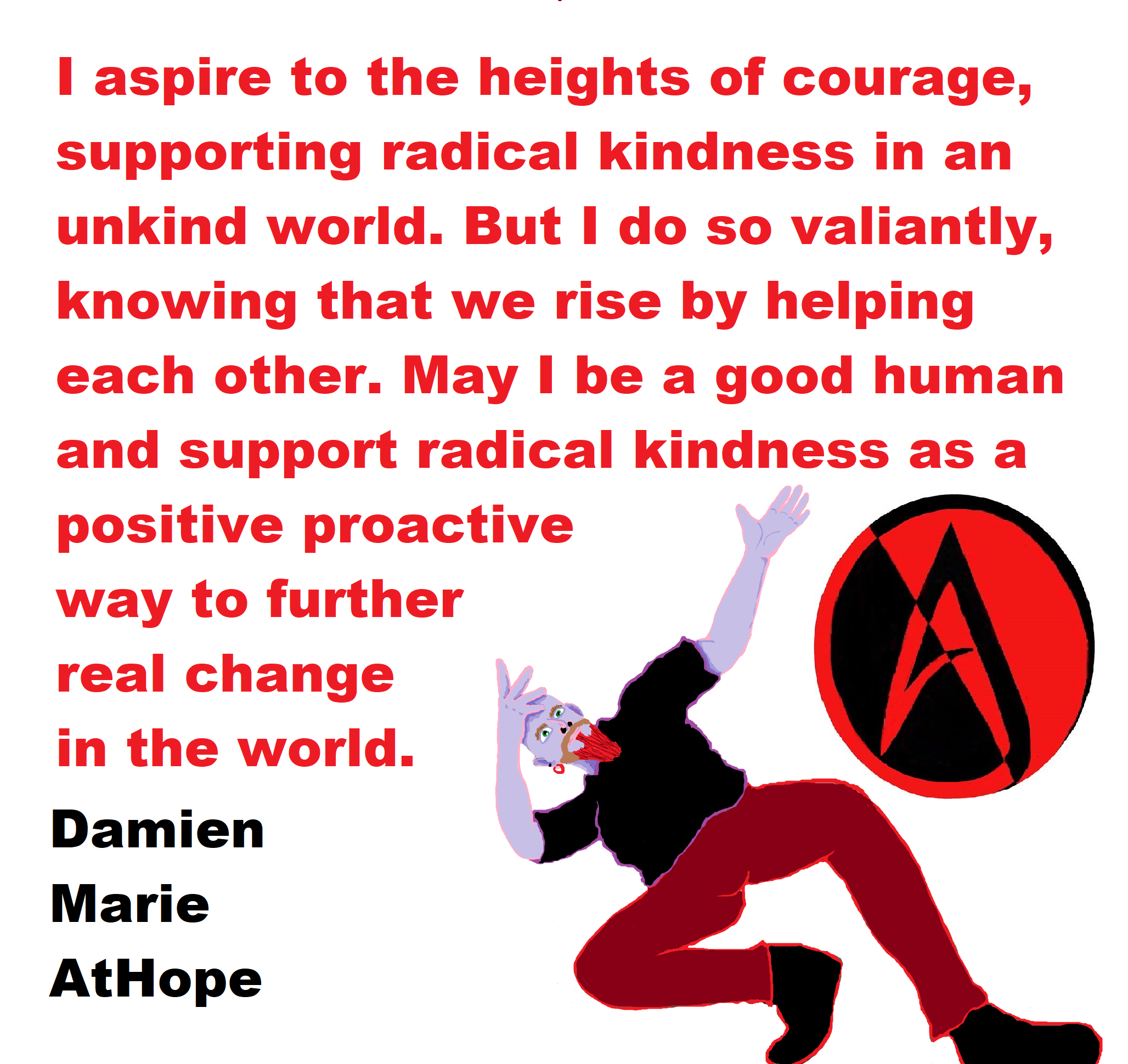

I Am a Atheist-Humanist Anarchist
“Hierarchy to me means oppression and brutality.”
States may often have powers, but only citizens have the glue of morality we call rights. And, as they say, in my “dream society”, lots of things are free (aka. planting free food everywhere, free to everyone); but I wonder what you mean when people say you can’t just let things be free, I think, yeah, how can I take free stuff from a free earth.
Anarcho-Humanism, to me, is atheistic humanism with an unconditional social awareness:
Anarcho (anarchism): “No Gods – No Masters”
Humanism: “No Harm – Do Good”
HUMANISM: the philosophic thinking that humans can solve human problems by human means, without feeling a need to appeal to the likes of holy books, mystical anything, nor the belief in gods or religions. But, instead, aspires to a true belief in humanity, viewing it with a persuasion of equality. This caring realist thinking found in humanism utilizes an unstated assumption or aspiration, to do no harm as much as posable and to do good whenever one can.
Rationalism, Freethinker, Humanism & Secular humanism?
My core definition of humanism is that humans can solve human problems by human means. I am not saying other things can’t or shouldn’t be added to it but to me, a definition of humanism must always contain something coherent to such a thinking or not contradict such as I have offered. Thus, why it is appropriate to say “good without god” when one is a humanist.
We rise by helping each other.
I was a republican before voting at 18 and was christian until 36 (2006) and had started becoming an anarchist a little before that hating first republicans, then democrats, then libertarians, then anarchist then do to interactions with anarcho-capitalists and voluntaryists, I realized I was not them further realizing I was a relatively a socialist anarchist. Then I evolved my own eclectic anarchism persuasion socialist-anarchist-collectivist-mututlism I call anarcho-humanism. Humanism, to me, can be summarised as humans can solve human problems with human means, not needing to appeal to religions or the gods they claim as real. Rather humanism, I feel is a positive awareness of the reality of humanity needs, with a seeming general goal valuing others and striving to make a positive ethical difference. Humanism should involve respecting and helping others seeing them as fellow dignity beings. I see humanism as and ethical caring that moves beyond the selfish thinking about only me, choosing to improve one’s self and others as well, it’s the humanity persuasion I aspire to fully emulate, an awakened humanity.
My Life Unplugged: “Losing My Religion and Finding Myself”
I lost my religion and faith addiction in 2006 after going to college. However, I don’t know if I should be called a just an atheist as this is too limited to define my disbelief. Thus, I am best described as an Axiological atheist: (Ethical/Value theory Reasoned and Moral Argument driven) Atheism, Anti-theism, Anti-religionism, and Secular Humanism I also value Ignosticism or igtheism.
The word (bible writings claiming an inspiration or revelation from the religion’s god) is so important that God himself is claimed to author the Ten Commandments on stone with a lightening finger. Yet, we are to believe that Jesus comes to earth and does not write a word. Was he illiterate? If he was, how could he be God? Jesus never asked anyone to write anything more in the Torah. Maybe he just forgot since he was so busy or maybe he was not God. He had 12 disciples; why did not all of them author a book on his behalf? Ir even one? NO NOT ONE Instead they too are silent. If Jesus and his disciples were silent, maybe he was not God. Of if he was God, maybe he was silent because the Torah was already perfect. That would make the Christian Bible heresy. I will end with saying I believe in no gods, goddesses, or religion mythologies that are true. I simply believe in universal ethics and an aware humanity, no god required. I would also say I am a born again hedonist and I follow my own life doctrine. I will write a book on morality I will title fallen Morals Uplifted Ethics about what I call, “TRUE”…The Rational Universal Ethic.
“Life is just too damn short to not be kind.”
Would it make any difference how you treated others was really dependent on how empathizing you can be with them as well as how much emotional intelligence can you muster or demonstrate? What if you knew that a person was going to die in an hour would you feel more compelled to be kinder almost no matter what? I would like to think I always would. I know for some this is too extreme, but think about it like I do and you may just start to see the reason life’s just too damn short to not be kind. A main goal of mine in this life is to first not forget to enjoy it, but secondly is strive to make the world a little bit better because I was alive. We can make a big difference with little actions. In the end all we really have is each other and life is too damn short to not be kind.
True (real) morality is a valued behavior we do that interacts with others; it is not really related to what we do to ourselves. Which is why I do not agree with the so-called golden rule as it is what you don’t want do to others but this fails in that its focused on ourselves which is us focused and true morality needs to be other focused on what valued behavior we do that interacts with others. I say treat others the way they should be treated. People have self-ownership, self-rights, right to dignity, freedom, and equality. True morality is a valued behavior we do that interacts with others starting with the conception that people matter, they have worth and value, It is in this way they should be treated.
Pseudo Morality is seen when holy books or people “cognitively reconstruct” an inhumane idea or behavior to make it into something different from than it is, to something more moral than what it actually is. Or turn something highly immoral into something highly moral. One way to do that is to cloak the behavior “in moral wrappings” or “in divine authority” such as god hates gays, gays are evil, thus killing gays is doing good by destroying evil. This thinking is obviously pseudo morality as gays are not evil but killing them is an evil and inhumane idea or behavior thus very immoral. The god justified immoral into moral is some of the most common pseudo morality though political and others in power tend to employ it as well. They all are using “pseudo-moral justifications” to describe something immoral as moral. To me, true morality is not starting with an us or me focused morality, as morality is a social interaction exchange thus it must be other focused. “treating others as they should be treated.”
To me, I see everyone as owning themselves all equal in this right as humans. Moreover, to me morality is behavioral and a social property, there is no immoral thing one can do to themselves as one cannot violate themselves or their own consent as they choose their own actions. Thus, to me, all morality is about others and our interactions with them and them with us. So, morality arises in a social context with all things not that all things have the same moral weight. Therefore, moral relationships with life outside humans have a different moral weight or value. Such as, killing 100 humans is not the same as killing 100 dogs, killing 100 fish, killing 100 flies, etc.
Of course, the method of killing used should inflict the least amount of suffering to the animal or plant. And to not do that could make it immoral. Such as torturing them to death is immoral even if the killing was not. Harm is often a violation of trust and a violation of expected trust makes bad things even worse like if I told you a child was killed, you would feel it was terrible but if I further told you it was the child’s doctor that murdered the child out of anger. You would be more angered as doctors are expected to care for people not harm them. And if you think that is bad what if I further told you the doctor who killed the child was her mother would you hold her even more in contempt as mothers also are expected to care and not kill children, so a violation of trust is terrible and even makes things worse.
Therefore, we can see why people that hold places of trust should never abuse them, and that we should hold them accountable if they do violate such trust by harming others. Morality first, that is morality should be at the forefront in all I do. I hope I am always strong enough to put my morality at the forefront in all I do, so much so, that it is obvious in the ways I think and behave. To better grasp, a naturalistic morality one should see the perspective of how there is a self-regulatory effect on the self-evaluative moral emotions, such as shame and guilt. Broadly conceived, self-regulation distinguishes between two types of motivation: approach/activation and avoidance/inhibition. one should conceptually understand the socialization dimensions (parental restrictiveness versus nurturance), associated emotions (anxiety versus empathy), and forms of morality (proscriptive versus prescriptive) that serve as precursors to each self-evaluative moral emotion.
Confusions in Atheism and Humanism
Categories and Versions of Humanism
Axiological Ethics not Pseudo Morality
Real Morality vs. Pseudo Morality
Religions Promote Pseudo-Morality
Think there is no objective morality?
True Morality Not the Golden Rule…
Axiological Atheism Morality Critique: of the bible god
T.R.U.E. “The Rational Universal Ethics”
Moral fear and Moral love (which together motivate my axiological ethics)?
My Atheistic (socialist-anarchist) Humanism?
Moral fear and Moral love (which together motivate my axiological ethics)?
“Sometimes justice has to outweigh care and sometimes care has to outweigh justice.”
And one may ask or question how do you discern the appropriate morality course of action between what is ethically right? To me, it takes Axiology (i.e. value consciousness: value judgment analysis of ethical appropriateness do to assess value involved).
MORAL FEAR (fight or flight “justice perspective”):
To feel a kind of morality “anxiety” (ethical apprehension to potentially cause harm) about behaviors and their outcomes empathy (I feel you) or sympathy (I feel for you) about something moral that may be done, is being done, or that has been done, thus feeling of distress, apprehension or alarm caused by value driven emotional intelligence concern; moral/ethical anxiety to the possibility; chance (to do something as a moral thinker and an ethical actor) or dread; respect (to take the sensitivity of a personal moral choice that leads one to choose an ethical behavior(s) and grasping the moral weight of the actions involved and potential outcomes this engagement can or will likely create (using data from learning whether theoretical or practical to lessen the effect of an unpleasant choice as much as posable (morality development/awareness/goals/persuasion). “Moral Anxiety, improves us, while Social Anxiety kills. Some anxieties are indicators of healthy curiosity and strong moral fiber, while others are a source of severe stress. Knowing which is which can help you to navigate your personal, professional, and intellectual life more effectively.” Ref
Moral fear thus is a kind of morality “anxiety” that motivates a fascinating aspect of humanity, which is that we hold ourselves to high moral standards. With our values and emotional intelligence and moral development, we gain a developed prosocial persuasion thus “tend to self-impose rules on ourselves to protect society from the short-term temptations that might cause us to do things that would have a negative impact in the long-run. For example, we might be tempted to harm a person who bothers us, but a society in which everyone gave in to the temptation to hurt those who made us angry would quickly devolve into chaos. And once we accept that emotion plays some role in complex decisions, it is important to figure out which emotions are influencing different kinds of choices. Therefore, when we make these moral judgments to an extent we are somewhat driven by our ability to reason about the consequences of the actions or are influenced by their emotions to or about the outcomes of the consequences of the actions.” https://www.psychologytoday.com/blog/ulterior-motives/201308/anxiety-and-moral-judgment
*ps. MORAL FEAR (fight or flight “consequentialist ethics/utilitarian ethics”) is roughly referring to the fight-or-flight response, also known as the acute stress response, refers to a physiological reaction that occurs in the presence of something that is terrifying, either mentally or physically. The fight-or-flight response (also called hyperarousal, or the acute stress response) is a physiological reaction that occurs in response to a perceived harmful event, attack, or threat to survival. An evolutionary psychology explanation is that early animals had to react to threatening stimuli quickly and did not have time to psychologically and physically prepare themselves. The fight or flight response provided them with the mechanisms to rapidly respond to threats against survival. This response is recognized as the first stage of the general adaptation syndrome that regulates stress responses among vertebrates and other organisms. The reaction begins in the amygdala, which triggers a neural response in the hypothalamus. The initial reaction is followed by activation of the pituitary gland and secretion of the hormone ACTH. The adrenal gland is activated almost simultaneously and releases the hormone epinephrine. The release of chemical messengers results in the production of the hormone cortisol, which increases blood pressure, blood sugar, and suppresses the immune system. The initial response and subsequent reactions are triggered in an effort to create a boost of energy. This boost of energy is activated by epinephrine binding to liver cells and the subsequent production of glucose. Additionally, the circulation of cortisol functions to turn fatty acids into available energy, which prepares muscles throughout the body for response. Catecholamine hormones, such as adrenaline (epinephrine) or noradrenaline (norepinephrine), facilitate immediate physical reactions associated with a preparation for violent muscular action and :
- Acceleration of heart and lung action
- Paling or flushing, or alternating between both
- Inhibition of stomach and upper-intestinal action to the point where digestion slows down or stops
- General effect on the sphincters of the body
- Constriction of blood vessels in many parts of the body
- Liberation of metabolic energy sources (particularly fat and glycogen) for muscular action
- Dilation of blood vessels for muscles
- Inhibition of the lacrimal gland (responsible for tear production) and salivation
- Dilation of pupil (mydriasis)
- Relaxation of bladder
- Inhibition of erection
- Auditory exclusion (loss of hearing)
- Tunnel vision (loss of peripheral vision)
- Disinhibition of spinal reflexes
- Shaking
The physiological changes that occur during the fight or flight response are activated in order to give the body increased strength and speed in anticipation of fighting or running. Some of the specific physiological changes and their functions include:
- Increased blood flow to the muscles activated by diverting blood flow from other parts of the body.
- Increased blood pressure, heart rate, blood sugars, and fats in order to supply the body with extra energy.
- The blood clotting function of the body speeds up in order to prevent excessive blood loss in the event of an injury sustained during the response.
- Increased muscle tension in order to provide the body with extra speed and strength. Ref, Ref
Here is a little on Consequentialist ethics and Utilitarian ethics
*Consequentialist ethics: involves a class of normative ethical theories holding that the consequences of one’s conduct are the ultimate basis for any judgment about the rightness or wrongness of that conduct. Thus, from a consequentialist standpoint, a morally right act (or omission from acting) is one that will produce a good outcome, or consequence. In an extreme form, the idea of consequentialism is commonly encapsulated in the saying, “the end justifies the means“, meaning that if a goal is morally important enough, any method of achieving it is acceptable. Consequentialism is usually contrasted with deontological ethics (or deontology), in that deontology, in which rules and moral duty are central, derives the rightness or wrongness of one’s conduct from the character of the behaviour itself rather than the outcomes of the conduct. It is also contrasted with virtue ethics, which focuses on the character of the agent rather than on the nature or consequences of the act (or omission) itself, and pragmatic ethics which treats morality like science: advancing socially over the course of many lifetimes, such that any moral criterion is subject to revision. Consequentialist theories differ in how they define moral goods. Some argue that consequentialist and deontological theories are not necessarily mutually exclusive. For example, T. M. Scanlon advances the idea that human rights, which are commonly considered a “deontological” concept, can only be justified with reference to the consequences of having those rights. Similarly, Robert Nozick argues for a theory that is mostly consequentialist, but incorporates inviolable “side-constraints” which restrict the sort of actions agents are permitted to do. Ref
*Utilitarian ethics: involve an ethical theory which states that the best action is the one that maximizes utility. “Utility” is defined in various ways, usually in terms of the well-being of sentient entities. Jeremy Bentham, the founder of utilitarianism, described utility as the sum of all pleasure that results from an action, minus the suffering of anyone involved in the action. Utilitarianism is a version of consequentialism, which states that the consequences of any action are the only standard of right and wrong. Unlike other forms of consequentialism, such as egoism, utilitarianism considers the interests of all beings equally. Proponents of utilitarianism have disagreed on a number of points, such as whether actions should be chosen based on their likely results (act utilitarianism) or whether agents should conform to rules that maximize utility (rule utilitarianism). There is also disagreement as to whether total (total utilitarianism) or average (average utilitarianism) utility should be maximized. Though the seeds of the theory can be found in the hedonists Aristippus and Epicurus, who viewed happiness as the only good, the tradition of utilitarianism properly began with Bentham, and has included John Stuart Mill, Henry Sidgwick, R. M. Hare, David Braybrooke, and Peter Singer. It has been applied to social welfare economics, the crisis of global poverty, the ethics of raising animals for food and the importance of avoiding existential risks to humanity. Because utilitarianism is not a single theory but a cluster of related theories that have been developed over two hundred years, criticisms can be made for different reasons and have different targets. Karl Marx, in Das Kapital, criticises Bentham’s utilitarianism on the grounds that it does not appear to recognize that different people have different joys:
Not even excepting our philosopher, Christian Wolff, in no time and in no country has the most homespun commonplace ever strutted about in so self-satisfied a way. The principle of utility was no discovery of Bentham. He simply reproduced in his dull way what Helvétius and other Frenchmen had said with esprit in the 18th century. To know what is useful for a dog, one must study dog-nature. This nature itself is not to be deduced from the principle of utility. Applying this to man, he who would criticize all human acts, movements, relations, etc., by the principle of utility, must first deal with human nature in general, and then with human nature as modified in each historical epoch. Bentham makes short work of it. With the driest naivete he takes the modern shopkeeper, especially the English shopkeeper, as the normal man. Whatever is useful to this queer normal man, and to his world, is absolutely useful. This yard-measure, then, he applies to past, present, and future. The Christian religion, e.g., is “useful,” “because it forbids in the name of religion the same faults that the penal code condemns in the name of the law.” Artistic criticism is “harmful,” because it disturbs worthy people in their enjoyment of Martin Tupper, etc. With such rubbish has the brave fellow, with his motto, “nulla dies sine linea [no day without a line]”, piled up mountains of books.
An article in the American Journal for Economics has addressed the issue of Utilitarian ethics within redistribution of wealth. The journal stated that taxation of the wealthy is the best way to make use of the disposable income they receive. This says that the money creates utility for the most people by funding government services. Many utilitarian philosophers, including Peter Singer and Toby Ord, argue that inhabitants of developed countries, in particular, have an obligation to help to end extreme poverty across the world, for example by regularly donating some of their income to charity. Peter Singer, for example, argues that donating some of one’s income to charity could help to save a life or cure somebody from a poverty-related illness, which is a much better use of the money as it brings someone in extreme poverty far more happiness than it would bring to oneself if one lived in relative comfort. However, Singer not only argues that one ought to donate a significant proportion of one’s income to charity, but also that this money should be directed to the most cost-effective charities, in order to bring about the greatest good for the greatest number, consistent with utilitarian thinking. Singer’s ideas have formed the basis of the modern effective altruist movement. ref
MORAL LOVE (tend and befriend “voice of care perspective”):
To me, this relates to care/caring ethics, which affirms the importance of caring motivation, emotion and the body in moral deliberation, as well as reasoning from particulars.This moral theory is known as “ the ethics of care” implies that there is moral significance in the fundamental elements of relationships and dependencies in human life. Normatively, care ethics seeks to maintain relationships by contextualizing and promoting the well-being of care-givers and care-receivers in a network of social relations. Most often defined as a practice or virtue rather than a theory as such, “care” involves maintaining the world of, and meeting the needs of, ourself and others. It builds on the motivation to care for those who are dependent and vulnerable, and it is inspired by both memories of being cared for and the idealizations of self. Following in the sentimentalist tradition of moral theory, care ethics affirms the importance of caring motivation, emotion and the body in moral deliberation, as well as reasoning from particulars. One of the original works of care ethics was Milton Mayeroff’s short book, On Caring, but the emergence of care ethics as a distinct moral theory is most often attributed to the works of psychologist Carol Gilligan and philosopher Nel Noddings in the mid-1980s. Though there are notable thinkers who express early strains of care ethics such as those that can be detected in the writings of feminist philosophers such as Mary Wollstonecraft, Catherine and Harriet Beecher, and Charlotte Perkins. Offering a general charged that traditional moral approaches contain a kinda of male bias, and asserted the “voice of care” as a legitimate alternative to the “justice perspective” of liberal human rights theory. Annette Baier, Virginia Held, Eva Feder Kittay, Sara Ruddick, and Joan Tronto are some of the most influential among many subsequent contributors to care ethics. Typically contrasted with deontological/Kantian and consequentialist/utilitarian ethics, is that of care ethics.
*ps. MORAL LOVE (tend and befriend “care ethics (ethics of care)/reciprocity (reciprocal altruism) ethics”) is similar to the fight or flight which is also only part of a bigger picture, according to Shelley Taylor, Ph.D., a psychology professor at the University of California, Los Angeles, and her colleagues. In the Psychological Review, as in evolutionary psychology, researchers describe how stress can elicit another behavioral pattern they call “tend and befriend”–especially in females. Tend-and-befriend is a behavior exhibited by some animals, including humans, in response to threat. It refers to protection of offspring (tending) and seeking out the social group for mutual defense (befriending), tend-and-befriend is theorized as having evolved as the typical female response to stress, just as the primary male response was fight-or-flight. This kind of gender determinism within the field is the subject of some controversy but I see it as to limited as well because we tend to use multiple sstrategiesto further sucuresafty depending of avalable resorces and if one regardless of gender persuasion is not able to either adequately defend themselves/or others (the fight part of fight or flight ) or is not able to either adequately flee a given threat (the flight part of fight or flight ) then other options such as The tend-and-befriend theoretical model was originally developed by Dr. Shelley E. Taylor and her research team at the University of California, Los Angeles and first described in a Psychological Review article published in the year 2000.
Here is a little on Care ethics and Reciprocal altruism
*Care ethics: is a normative ethical theory that holds interpersonal relationships and care or benevolence as a virtue as central to moral action. It is one of a cluster of normative ethical theories that were developed by feminists in the second half of the twentieth century. Here is a link to Feminist ethics. While consequentialist and deontological ethical theories emphasize universal standards and impartiality, ethics of care emphasize the importance of response. The shift in moral perspective is manifested by a change in the moral question from “what is just?” to “how to respond?”. Ethics of care criticize application of universal standards as “morally problematic since it breeds moral blindness or indifference.”
Some beliefs of the theory are basic:
- Persons are understood to have varying degrees of dependence and interdependence on one another. This is in contrast to deontological and consequentialist theories that tend to view persons as having independent interests and interactions.
- Those particularly vulnerable to one’s choices and their outcomes deserve extra consideration to be measured according to their vulnerability to one’s choices.
- It is necessary to attend to contextual details of situations in order to safeguard and promote the actual specific interests of those involved.
Care ethics contrasts with more well-known ethical models, such as consequentialist theories (e.g. utilitarianism) and deontological theories (e.g. Kantian ethics) in that it seeks to incorporate traditionally feminized virtues and values which, proponents of care ethics contend, are absent in such traditional models of ethics. While some feminists have criticized care-based ethics for reinforcing traditional stereotypes of a “good woman” others have embraced parts of this paradigm under the theoretical concept of care-focused feminism. Care-focused feminism is a branch of feminist thought, informed primarily by ethics of care as developed by Carol Gilligan and Nel Noddings. This body of theory is critical of how caring is socially engendered to women and consequently devalued. “Care-focused feminists regard women’s capacity for care as a human strength” which can and should be taught to and expected of men as well as women. Noddings proposes that ethical caring has the potential to be a more concrete evaluative model of moral dilemma, than an ethic of justice. Noddings’ care-focused feminism requires practical application of relational ethics, predicated on an ethic of care. Ethics of care is also a basis for care-focused feminist theorizing on maternal ethics. Critical of how society engenders caring labor, theorists Sara Ruddick, Virginia Held, and Eva Feder Kittay suggest caring should be performed and caregivers valued in both public and private spheres. Their theories recognize caring as an ethically relevant issue. This proposed paradigm shift in ethics encourages that an ethic of caring be the social responsibility of both men and women. Joan Tronto argues that the definition of the term “ethic of care” is ambiguous due in part to the lack of a central role it plays in moral theory. She argues that considering moral philosophy is engaged with human goodness, then care would appear to assume a significant role in this type of philosophy. However, this is not the case and Tronto further stresses the association between care and “naturalness”. The latter term refers to the socially and culturally constructed gender roles where care is mainly assumed to be the role of the woman. As such, care loses the power to take a central role in moral theory. Tronto states there are four ethical elements of care:
- Attentiveness
Attentiveness is crucial to the ethics of care because care requires a recognition of others’ needs in order to respond to them. The question which arises is the distinction between ignorance and inattentiveness. Tronto poses this question as such, “But when is ignorance simply ignorance, and when is it inattentiveness”? - Responsibility
In order to care, we must take it upon ourselves, thus responsibility. The problem associated with this second ethical element of responsibility is the question of obligation. Obligation is often, if not already, tied to pre-established societal and cultural norms and roles. Tronto makes the effort to differentiate the terms “responsibility” and “obligation” with regards to the ethic of care. Responsibility is ambiguous, whereas obligation refers to situations where action or reaction is due, such as the case of a legal contract. This ambiguity allows for ebb and flow in and between class structures and gender roles, and to other socially constructed roles that would bind responsibility to those only befitting of those roles. - Competence
To provide care also means competency. One cannot simply acknowledge the need to care, accept the responsibility, but not follow through with enough adequacy – as such action would result in the need of care not being met. - Responsiveness
This refers to the “responsiveness of the care receiver to the care”. Tronto states, “Responsiveness signals an important moral problem within care: by its nature, care is concerned with conditions of vulnerability and inequality”. She further argues responsiveness does not equal reciprocity. Rather, it is another method to understand vulnerability and inequality by understanding what has been expressed by those in the vulnerable position, as opposed to re-imagining oneself in a similar situation. Ref
Reciprocal altruism: (the evolution of cooperation)is a social interaction phenomenon where an individual makes sacrifices for another individual in expectation of similar treatment in the future. Originally introduced as a concept by biologist Robert Trivers, reciprocal altruism explains how altruistic behavior and morality can arise from evolutionary causes, as evolution selects for the best possible game theory results. If the benefit is higher than the initial cost, then multiple reciprocal interactions can actually out-compete more “greedy” forms of relationships, thus providing an evolutionary incentive for altruistic behavior. At the same time (and in opposition to unlimited altruism), reciprocity ensures that cheaters are also harmed when they choose to do so and are gradually made less fit as a result of their own behavior. Modern ethnology seems to support at least part of this hypothesis, as many societies on all continents have developed highly complex forms of gift economy where gifts are given with no immediately obvious material return, but the implicit societal expectation of “repayment” in gift form at some later point in time. Amazingly, those societies work. The custom of giving gifts for birthdays in the West may be seen as a remnant of this. It’s not uncommon for someone to engage in this behavior with the object of their affection, i.e. being nice to them with the expectation of a sexual relationship. Since a lot of these situations tend to involve lonely, single straight men, the common term for this is “Nice Guy” — in other words, the suitor’s claim “but I’m a nice guy…” translates to “I went through all the motions and she still won’t sleep with me.” As a general rule, this is not an effective strategy, and often even drifts into stalking behavior. Women who engage in the same behavior do not get as much attention but are still known (naturally) as Nice Girls. Either way, such people are seldom actually nice, and frequently come off as manipulative and bitter without realizing it. The fallacy lies in their equating sexual relationship with being nice – if their expectation of tit for tat was actually equal, aka being nice for being nice and being honest for being honest (which they, coming into relationship with entirely different expectations than they communicate, fail at), they wouldn’t face such a problem. Ref
My Atheistic (socialist-anarchist) Humanism?
Axiological Atheist: Facebook Page
Want to understand my internal motivation in many if not most of what I do? Well, it can be summed up as “I get that we rise by helping each other” and do you really think a life of silence to injustice harms no one? What is the power of the heart? When we can stop believing the validity of many of our fears and are not just strong in our hope and will to succeed followed with determined as well as focused actions even against great odds, it is then that one achieves self-mastery. And blind hate is just as disgusting as blind faith. Science facts should make religious Faith-Belief impossible. Now the axiological validity of Gods:
There is no evidence for Gods.
But is their proposition outside of reason?
As always start in reality from the evidence we do know, such as never in the history of scientific research or investigation has any supernatural claims shown to be true. So it is completely outside of possibility and is utterly ridiculous. Therefore, belief should be rejected as there are no warrants at all and it is axiologically unworthy to such a preponderance to demand disbelief.
The following are some evidence against a caring god working in the world. A recent study of the current living conditions throughout Africa shows that more than one billion people do not have enough clean water to provide for their basic human needs. As a result, more than 2,500 children are dying each day. I guess it is that god gives us free will by keeping children from clean water in an unproportioned amount to the civilized science filled world. I ask you, does your god not hear their prayers? According to Missionaries of Africa (2008), there is a water crisis and diseases that are living in dirty water are wiping out entire villages and communities. Does god exist? Does the magic chanting of prayer seem to work? Suppose for a minute with the understanding of religious believe, if there was a loving god and it answered even some prayers, would not the most deserving be the non-sinning? Moreover, what living human could be said to be less sinning than a baby and thus the most deserving. In addition, babies or children are likely the ones religionists/fideists pray most often, for when they are in trouble. Belief changes nothing. Whatever circumstances you are in or not, has nothing to do with belief. If you are poor, belief does not make you not poor. If you are rich, you do not stay rich because of belief. You would think that poor people would have the benefit of the heavenly means and have god on their side, if anyone would, right? Overall, in 186 countries, first-day child death rates for babies are 6.9%. Where was god? In Angola, 8% of the babies die and 95% of the population is christian. In Congo, 7.5% of the babies die and 95.8 % of the population is christian. Whereas in Guinea-Bissau, 9% of the babies die and 10 % of the population is christian and in Niger 8.7% of the babies die and 5% of the population is christian. Therefore, being a christian and begging for an all-powerful all loving god myth to do something that any half-decent human being would hardly even need to be asked to help an innocent child, shows that belief seems to make no difference in the world because the world is godless and sadly babies die. Isaiah 45:7 “I form the light, and create darkness: I make peace, and create evil: I god do all these things.” Ref
Just think, the bible god “could” have banned slavery or shellfish and he chose to ban shellfish (Leviticus 11:12) and actually support slavery (Leviticus 25:44-46) even in the new testament (Ephesians 6:5; 1 Timothy 6:1-2) and Jesus clearly approves of beating slaves even if they didn’t know they were doing anything wrong (Luke 12:47-48) how crazy and immoral is that for a man-made fairy tales. I will openly say faith is foolish lacking credibility and it is stupid to hold on to beliefs that are disproved by science fact. However, I don’t usually call people names even ones saying things I believe are ridiculous nor do I belittle them instead I strive to and support attacking the thinking and not the person.
Do you believe in god?
What is a god? Are you asking me if magic exists? Well, my answer as an ignostic type of atheist is, first prove the actuality of simple magic before you try to ask anyone about the possibility of some supreme magic.
Are you a Believer or a Thinker?
When you can, with all honesty, say that you put a similar voracity to one’s own ideas as they demand for others then they are a thinker, not just a believer. And when you can quickly and eagerly relinquish any and all ideas, even the most cherished if they were not true; yes a willingness to discuss or discard if required, even if you like them is being a thinker and not just an unthinking believer.
What is a god? Just a Empty Label.
Doubt god(s)? No, I stopped believing Fairytales.
“Hierarchy to me means oppression and brutality.”
A hierarchy (from the Greek hierarchia, “rule of a high priest”, from hierarkhes, “leader of sacred rites”) is an arrangement of items (objects, names, values, categories, etc.) in which the items are represented as being “above”, “below”, or “at the same level as” one another. A hierarchy can link entities either directly or indirectly, and either vertically or diagonally. The only direct links in a hierarchy, insofar as they are hierarchical, are to one’s immediate superior or to one of one’s subordinates, although a system that is largely hierarchical can also incorporate alternative hierarchies. Indirect hierarchical links can extend “vertically” upwards or downwards via multiple links in the same direction, following a path. Possibly the first use of the English word “hierarchy” cited by the Oxford English Dictionary was in 1880, when it was used in reference to the three orders of three angels as depicted by Pseudo-Dionysius the Areopagite(5th–6th centuries). Pseudo-Dionysius used the related Greek word (hierarchia) both in reference to the celestial hierarchy and the ecclesiastical hierarchy. The Greek term “ἱεραρχία” means “rule by priests” (from “ἱεράρχης” – ierarches, meaning “president of sacred rites, high-priest” and that from “ἱερεύς” – iereus, “priest” + “ἀρχή” – arche, amongst others “first place or power, rule”), and Dionysius is credited with first use of it as an abstract noun. Since hierarchical churches, such as the Roman Catholic (see Catholic Church hierarchy) and Eastern Orthodox churches, had tables of organization that were “hierarchical” in the modern sense of the word (traditionally with God as the pinnacle or head of the hierarchy), the term came to refer to similar organizational methods in secular settings.All parts of the hierarchy which are not linked vertically to one another nevertheless can be “horizontally” linked through a path by traveling up the hierarchy to find a common direct or indirect superior, and then down again. This is akin to two co-workers or colleagues; each reports to a common superior, but they have the same relative amount of authority. Organizational forms exist that are both alternative and complementary to hierarchy. Heterarchy is one such form. A heterarchy is a system of organization where the elements of the organization are unranked (non-hierarchical) or where they possess the potential to be ranked a number of different ways. Definitions of the term vary among the disciplines: in social and information sciences, heterarchies are networks of elements in which each element shares the same “horizontal” position of power and authority, each playing a theoretically equal role. Ref
Psychological Patterns Associated with Hierarchy: Internalized Oppression?
Abstract
“From a psychological perspective, it is clear that there are enormous societal forces operating to produce considerable psychological difficulties for oppressed groups. Some of these difficulties may be directly related to mechanisms of control. For example, violence is associated with fear and restriction, economic dependency may be associated with psychological dependency, and negative stereotypes can create a sense of inferiority. Patterns identified in the previous chapter included fear, restriction, powerlessness, insecurity, distortions of sexuality, sense of inferiority and isolation, and these patterns have been discussed by writers on both feminist psychology and psychological aspects of colonialism. Other patterns include ambivalence, loss of identity, and vulnerability to psychological distress and madness. Furthermore, writers have also explored, although most often in passing, the psychological effects of domination, where patterns such as anger, arrogance, rigidity and unwillingness to admit vulnerability or emotional weakness have been described.” Ref
I am an anarchist in thought, yet not limited to some abstraction but rather as a full expression of my support for an equal humanity; no gods nor earthly masters. Thus, I am also a humanist, who is aspiring to the greatness and full human potential: freedom, liberty, and justice. How simple is it to feel free and how quickly it can be lost? It is with such a clarity of humanity about the importance of liberation over some bleak servitude that we are truly free. I am appealing to a cold controller glorifying world. I offer only a simple humanist manifesto, one of the heart. I am well aware, that one is embodying a humanist archetype when they accurately realize the desperate nature of humanity and the equality it needs in a world that is hell-bent on anti-humanism. This archetype of anarcho-humanism is evident, if one follows the thinking of “do no harm and do good” and this should be the letter of the unwritten law that is grounded on hopes of brighter futures. This desire for a free and equal society thrills me with renewed vigor by seeing how we are one but individually valuable, which is almost self-evident to a heart that is open in love and kindness as it is set free in liberation.
Anarchism should involve wealth equality? To me, no matter the anarchist theory needs to connect to the theme of an anarchist society. Therefore, at such an anarchist society’s creation all wealth should be relatively equalized between all peoples fairly. This is true because all other previous claims of wealth are the entitlements of the non-anarchist state that is now dissolved including of course any and all previous authority, thus, there is no just anarchism claim to statism wealth. Therefore the all real anarchism should involve some amount or desire of at least starting with relative wealth equality. Happy human? I am not trying to say or act as if I am perfect, but my goal is to strive to be a more caring and understanding human being, as well as try to help others do the same. This is our planet, all humans are my people, and I want to help the world if I can. We all need to see the benefit of showing more compassion, not to ideas but to people. Simply, we must be kinder to one another, even if we are different or believe differently, because people matter.
I am just a happy human who is good without god! Upon hearing I am a humanist one person once said, “Damien, humanism is a dogma.”, My response, if caring about humanity is a dogma then it’s a dogma I am proud to promote. The challenger went on, just be careful that caring doesn’t become imposing your will and dogma on others (for their own good). To which My response was, we are imposing our thinking all the time just like you are trying to do with your words appealing to me to follow your offered ideas so much so that you are even adding emphasis to push your thoughts into me like mental obligation, yeah, all the time so are you really aware of your own thoughts?
I am an axiologist/value theorist and that is expressed politically as relatively a collectivist Anarcho-Socialist-Mutualist:
“To me, individualism, represents Self-Reliance and Hostility to a Connected Humanity.“
What could motivate political Revolution?
What is really being asked is what would motivate such change? I am hoping the more people learn the more they will want to change things for the better. Like, the inequality of our unjust hierarchy government and how it’s not really a government of the people, by the people, and for the people. About 47 percent of Congress, or 249 current members are millionaires. …a Status Shared by Only 1% of Americans. In 2010, the estimated median net worth of a current U.S. senator stood at an average of $2.56 million,” according to the Center’s research. Ref
Disproportionate Representation: women make up 50.8% of the U.S. population but only make up 19.4% of the 114th U.S. Congress, 20.0% of the Senate and 19.3% of the House of Representatives. Ref
Or how 20 years of data reveals that Congress doesn’t care what you think. Like how your opinion literally does not matter to Congress demonstrated in a study which took data from nearly 2,000 public-opinion surveys and compared what the people wanted to what the government actually did. What they found was extremely unsettling: The opinions of the bottom 90% of income earners in America has essentially no impact at all. Put another way, and I’ll just quote the Princeton study directly here: “The preferences of the average American appear to have only a minuscule, near-zero, statistically non-significant impact upon public policy.” Really think about that for a second. If you’ve ever felt like your opinion doesn’t matter and that the government doesn’t really care what you think, well … you’re right. But, of course, there’s a catch. …unless you’re an “economic elite.” If there’s one thing that still reliably gets politicians’ attention, it’s money. While the opinions of the bottom 90% of income earners in America have a “statistically non-significant impact,” Gilens and Page found that economic elites, business interests, and people who can afford lobbyists still carry major influence. How could it be that our government, designed to function as a representative democracy, is only good at representing such a small fraction of the population? Just follow the money. Why? Because purchasing political influence is 100% legal. For example: Let’s say a big bank wants a law that would force taxpayers to bail them out again if they repeat the exact same reckless behavior that crashed the global economy in 2008. It’s perfectly legal for our bank to hire a team of lobbyists whose entire job is to make sure the government gives the bank what it wants. Then, those lobbyists can track down members of Congress who regulate banks and help raise a ton of money for their re-election campaigns. It’s also perfectly legal for those lobbyists to offer those same politicians million-dollar jobs at their lobbying firms. Ref
Anarchism is a political philosophy that advocates self-governed societies based on voluntary institutions. These are often described as stateless societies, although several authors have defined them more specifically as institutions based on non-hierarchical free associations. Anarchism holds the state to be undesirable, unnecessary, and harmful. While anti-statism is central, anarchism entails opposing authority or hierarchical organisation in the conduct of all human relations, including, but not limited to, the state system. Anarchism does not offer a fixed body of doctrine from a single particular world view, instead fluxing and flowing as a philosophy. Many types and traditions of anarchism exist, not all of which are mutually exclusive. Anarchist schools of thought can differ fundamentally, supporting anything from extreme individualism to complete collectivism. Strains of anarchism have often been divided into the categories of social and individualist anarchismor similar dual classifications. Anarchism is usually considered a radical left-wing ideology, and much of anarchist economicsand anarchist legal philosophy reflects anti-authoritarian interpretations of communism, collectivism, syndicalism, mutualism, or participatory economics. Ref
Why do “anarcho”-capitalists generally place no value on equality?
How does the history of “anarcho”-capitalism show that it is not anarchist?
The new right Libertarianism is Anarcho-Capitalism/Anarcho-Corporatism/Anarcho-Hucksters.
To me, so called “Anarcho-Capitalists” are not an anarchists they are just capitalists who does not like the state, especially anti-taxes.
“Anarcho-capitalism (ancap) is a fringe political ideology that prioritizes the freedom of the individual from state coercion and advocates market-based solutions to all social needs. Anarcho-capitalists believe that compulsory taxation is a violation of individual liberty, and that law enforcement, courts, and all security services should be provided by voluntarily-funded competitors, such as private defense agencies. Anarcho-capitalism is mainly furthered in the public sphere by American reactionary think tanks; its visible supporters mostly congregate online. It has never constituted a socially active movement or organized political power base. It’s one of the youngest philosophies to try to place itself under the umbrella of “anarchism“, having only existed as a discrete philosophy for a few decades, although antecedents date back to the nineteenth century. Ancaps are as much anarchists as Christian Scientists are scientists. Traditional anarchist movements originated on the left, and do not consider anarchy and capitalism to be compatible, and thus consider anarcho-capitalism not to be an authentic form of anarchism. Ancaps have proven to be one of the greatest tools for anarchist unity in living memory, as more or less every single major anarchist group and tendency stands united in despising them. Needless to say that socialists, communists, social democrats, liberals, and centrists aren’t exactly fans of them either and will more than often unite even with the aforementioned anarchists to beat up on the ancap. Even Conservatives (even and especially of the Neo variety) aren’t above taking the occasional pot shot at them.” Ref
Non-aggression axiom in a “Anarcho-capitalism (ancap) thinking” Murray Rothbard wrote:[5]
| The basic axiom of libertarian political theory holds that every man is a self owner, having absolute jurisdiction over his own body. In effect, this means that no one else may justly invade, or aggress against, another’s person. It follows then that each person justly owns whatever previously unowned resources he appropriates or “mixes his labor with.” From these twin axioms — self-ownership and “homesteading” — stem the justification for the entire system of property rights titles in a free-market society. This system establishes the right of every man to his own person, the right of donation, of bequest (and, concomitantly, the right to receive the bequest or inheritance), and the right of contractual exchange of property titles. |
My “Anarcho-Humanist” Non-aggression axiom is self-ownership and respect for other people who are fellow “dignity beings” who also have self-ownership rights just like me and are equal in human worth. As well as Anti-Violence, Anti-Spanking, Anti-Circumcision, Anti-Bullying, Pro-Ethics, Pro-Body Sovereignty, Pro-Empathy and Equality. Let positive change begin with me, for I realize I am responsible for there is no god to save us or protect us. Anti-sexual Violence, Anti-Spanking, Anti-Circumcision, Anti-Bullying, Anti-Violence, Anti-child maltreatment, Anti-animal cruelty, Anti-Domestic Violence, and Anti-Verbal Violence (Threats, Character Assassination, Intimidation), Pro-Ethics, Pro-Body Sovereignty, Pro-Empathy and Equality. For those who think attacking religion is some kind of Character Assassination because its people that are religious. You are confused because character assassination is attacking people with abusive name calling not confronting religion dishonesty. Character Assassination is not being justifiably mentally aggressive as in one challenging, holy figures, gods, religions, myths, superstitions, beliefs, or deluded or misinformed ideas. Character Assassination is not meaning strong stances, aggressive challenge in rational arguments, or pitilessly exposing injustice, harm or oppression. It is our passion and an honored chosen duty to promote Non-Aggression and speak the truth of atheism and ethical behavior so people don’t stay misinform abused or oppressed. I value anti-violence (I am not a pacifist at all, I am actually a fighter by nature) unless the aggression or violence is for direct self-defense or other-defense. Check out: Atheists for Non-Aggression
The Value of a Ball?
You know what is truly “Wrong” with the Santa Claus wealth shaming is exemplified with children in poverty. See, children in poverty, that have to look on with hopefully eyes for the opportunity to share the one communal toy, a simple Ball. A ball so Small and barely there at all. Is was nothing special, plastic robbed from the earth with hands of selfishness and oppression to overcharge to what would later be the ball, the light and joy of the poverty destroyed orphanage the 15 to 30 children that were so overjoyed to get that one overpriced piece of air inflated plastic that is the ball. I stood there crying as I shamefully had only thought to bring “ONE” lonely ball, just a sad piece of plastic to me but the world to them. At once I realized the truth we are a that matters not the ball, not the plastic nor the money, but people, the only ones with value all along.
Come Hear a Positive Story
Here is a story about the benefits of helping. I was a big rig over the road Truck driver and I tracked for a month at a time. I was living in California but was in Illinois at a shit filthy truck stop broke off my ass. I was out of hours and could not go anywhere. The reason I was broke was because I was not good that week with managing my money (it was stripers). As I truck driver we can get weekly allotments of money such as limited advances less than $100, which I would use for my week’s food needs or whatever else I could get with the leftover money. So now to the go part, I was sitting in my truck thinking damn my weekly advance is available tomorrow morning but I am out of food and money to day and it’s only 6 am. I as most people were feeling very sorry for myself. I was even getting angry because I was feeling hopeless. There I was broke starving and growing ever angrier, looking out at the feels of human trash dirtying up the patches of dying grass slowly turning that wonderful brown, that grass color announcing its death. And I realized even though I have nothing to do and no money to do it with anyway but I could step outside myself and make a difference. Now don’t get to hopeful it’s not like I cured cancer. What I did see was I could help pick up the trash but don’t get this wrong, this was somewhat selfish as I was just sick of looking at it and I still had like 24 hours to go before I could leave. So, I went in and got a bag for the trash. But I got more than one bag as when I asked for a trash bag, the lady behind the counter a thick woman with the look of one who once deeply believed in others but was now disheartened. She was stern questioning my need for a trash bag and when I told her it was to pick up trash in her truck stop’s parking lot she became very joyful like one who was under water about to drowned are saved, as she gave me like 4 trash bags. I was like well I don’t know if I am going to pick up that much. I am offering to help not make it a career. So, I now happier myself, went out picking up trash. At first I, must admit I didn’t have much positive thoughts at first but then I became more and more joyful. I just about filled one of the larger trash bags and was tired of bending over to pick the trash up. I went back to the store and up to the cashier to return the unused bags. She said what you did was the most inspirational thing I have ever seen. I want to give you so food as a reward. I was exploding inside so happy and so surprised as I never thought I would get food I only wanted to do something good to make me feel better about my sad situation. She gave me enough food for two meals. That day I realized the power of doing good. But wait there’s more I hadn’t told you. I was not alone I was a truck driver trainer and had a student driver with me. And as luck would have it he too was broke (again it’s those damn stripers) and starving until tomorrow morning just like me. Two sad and angry starving drivers not even able to drive. Well I must admit not to be too harsh on him but he was completely losing it, you would think we were on the Titanic going down after the iceberg that is stripers to one’s wallet. He was also by the way not a supporter of picking up trash for free, something neither of us would do for money all to feel the possible joy of altruism. So back we go she gave me enough for to meals and I could have been selfish and ate it all, thus having two means at least. But no that is not what I did. Instead I offered to share it all with my student as I knew he was starving too. He was shocked to say the least. First because I even picked up the trash (regardless of how he taunted me: yelling that I was crazy), second that I had been rewarded with food the very thing we so desperately needed. And third but not hardly last in how impacting this was to him, it was my sharing the food that I had worked for hours to get all the while not even knowing I would get anything. May we all help others in need.
Creating Our Purpose?
You know I have one message, be a good person, for whatever is the extremely short lives. Life is just too short not to be kind. Our behavior with others will either add to human flushing or it doesn’t. How desperately want acceptance and how desperately we need to accept each other in kindness. I only have one goal: Some people are a bit confused as to what my goals are with my thinking. I am not trying to change minds, I am trying to change the world.
“Expose the Unspeakable harm”
We all can be irrational, but biases that is not even in the interesting point. Because we can all be irrational we have an outright moral obligation to institute accuracy in one’s choices. Which is similar to the potential for harm that beliefs unchecked can and do have, even if it’s just that it contributed to unspeakable harm.
To Feel or Not to Feel?
Slow down, and think, is that even a reality coherent statement?
To think we actually can someone how, like a switch, turn off completely what you feel or wish not to feel. No matter what the external really in every way possible we can know the external pressure against the fragile body our minds are enshrined. One who questions deeply the Reality of Existence every breath you willfully take and wish not abstracted should remind you that you have had your experience to being it all along, that aware was as point begin with feelings in fact, you always feel, unless something is very disrupted, it’s just that sometimes, we are refused to only feeling, for a time, Instead of clear thinking we fail for untruth or half-truths, in the acquisition of extremely traumatizing motivators we are nothing but unchecked feelings and runaway emotions. We are no longer the pilot then, no we have become the plain getting hijacked.
“Don’t be Boxed in by Abstraction”
All we have is “Now,” the here and now awareness is to finally live in what is actually present, anything else is Abstraction. Life itself is education. You are not some abstraction, you’re a body and you feel. So, no extra justification needed, but I still effort to give a justification anyway as I care to inform others if I can. Words are largely emotional projections, with an intentionally attached “emotional biology” created to motivate “emotions” in yourself and others to regulate or deregulate emotions.
Belief Regulation Also Involves Emotional Regulation
If someone challenges a specific point and your minds first response is to employ rhetoric, like oversimplified hasty generalizations or inaccurate half-truths used to imply a further truth that is nothing but a mental evasion from a truth inquiry. If you do this, you seem to exhibit some obscurity in the claimed truth stance offered and not in the court of dialectical scrutiny. Be willing if shown to say, I guess I was a lot surer about the claim until it was critiqued, now I am wanting to learn more about in with you. We Love Generalizations (even if wrong): “We don’t like slow clear accurate thinking, no, we are bias irrational compulsive disordered hasty generalizations thinking beings.” We build our “belief” of the accuracy of our hasty generalizations one assertion at a time. In other words, we add undue increasing assurance because we keep saying it over and over again, not because it’s actually accurate to the facts. We may cherry pick a few facts to support this error in thinking but that is intellectual dishonestly, as if it can be destroyed by the truth it should be.
“Evidence please?”
What is high intellectual character and do you have it???
Life is Hard, you May spend it Alone
Well that is largely a feeling being addressing. We may feel alone but we humans are seldom even alone our lives are filled with people. So, you are talking about a psychosocially mental health issue not a true ontology fact to what you are addressing. I was once alone, in myself, lost from the world. Alone even among others, in fact I once asked for a hug and still felt alone. Why? I was hiding from everyone, even me. I was so scared of being hurt that I was bashing myself to loneliness. But why? I felt people were not trustable, so I started trying to be someone worth trusting. I felt people were not really friendly, so I started trying to be a good friend to others. I felt like hate was to easy I was trying to do what felt impossible, just to freely give love. I want people to know life is hard but there is good people out there even if we have to put it there first.
Attacking the Person?
I strive to attack thinking and not people but I sometimes may use dignity attacks or character attacks about behavior or thinking people are doing. I only say things they can quickly fix or change. Then I will pressure them to change it. My point in doing this is help mirror the bad or errored thinking or behavior so they can change if they wish I try to never do it to hurt anyone as I see this as not a productive and potentially abusive.
You don’t like my truth? Well to be honest I didn’t care much for your lies.
In the honest search for truth there is no sides.
Love and kindness is all we have in the end that makes life sense. I am no better than anyone, I too am just a fragile body alone in the world, if not for the kindness of others. Impress me with your evidence not your evidence devoid options. I am a mental nightmare walking and radical thinker so free it’s like a mental gangster stalking the menus of unchecked flawed thinking.
Antireligionist atheism: is opposition to any religion, religious beliefs, religious institutions, and god myths. Antireligion is distinct from atheism and antitheism (opposition to belief in deities), although antireligionists may be atheists or antitheists. The term may be used to describe opposition to mostly organized religions, or can describe a broader opposition to any form of belief in the supernatural, holy, godly or divine. An antireligionist generally means an opposition to religion, this most likely includes buddhism, satanism, taoism, paganism, wicca, spiritualism, etc. reject it all, every religion or pseudo religion, YES an atheist who is “Anti” ALL RELIGIONS.
Not just atheist or antitheist, I am a proud anti-religionist. I can sum up what I do not like about religion in one idea, religions as a group are “Conspiracy Theories of Reality,” usually filled with Pseudoscience, Pseudohistory, along with Pseudomorality and other harmful aspects to people as well as reality and not just ancient mythology to be marveled and laughed at. And, I am an anti-accommodationist too. The term may be used to describe opposition to organized religion, or to describe a broader opposition to any form of belief in the supernatural or the divine. Antireligion is distinct from atheism (the absence of a belief in deities) and antitheism (an opposition to belief in deities), although antireligionists may be atheists or antitheists. I can sum up what I do not like about religion in one idea, religions as a group are “Conspiracy Theories of Reality,” usually filled with Pseudoscience, Pseudohistory, along with Pseudomorality and other harmful aspects to people as well as reality and not just ancient mythology to be marveled and laughed at.
And, I am an anti-accommodationist too. No, I Do Not Value Accommodationism. According to atheist philosopher Daniel Fincke Anti-Accommodationism Is Pro-Philosophy. Click the link to read more of his thoughts on this: Anti-Accommodationism Is Pro-Philosophy To me, believers and even some atheists or other nonbelievers who are accommodationists feel nonaccommodationists firebrand atheists, antitheists, antireligionists, or rationalists like me should not attack the thinking of believers as they see this as disrespecting or attacking the one holding the belief thus the believer themselves. I regard this as ridiculous, do they hold this as a universal belief or just a special belief towards religion believers. Such as I guess if universal I will never have to worry about you attacking my firebrand atheist beliefs either right or are you bigoted in how you apply your thinking about attacking thinking is attacking the person.
Attacking the thinking is not attacking the person, including religion and gods or any beliefs. In case you are unfamiliar with the term accommodationism it is a term of modern rationalism or atheism refers to the belief that some sort of “common ground” can be found between believers in magical and supernatural things and those who hold the scientific method and methodological naturalism as humanity’s best tools to describe the universe. Some simply call accommodationism soft or friendly atheism. I say do what you feel is right I see no rightness in this style. I don’t think antireligionism is really anti-friendly-atheism, as it can involve being friendly to people even if it is harsh to religion, positive antireligionism or Anti-Accommodationism is attack bad thinking and bad behaviors not just people who believe. It’s not the belief the believer holds to themselves, as that in itself would not bother me or most other antireligionist or anti-accommodationism if it somehow stayed encapsulation as a self-chosen preference they did not try to force on the larger world. But of course they not only express their myths, lies, pseudo history, pseudo-science, conspiracy theories of reality and often bigotry as well as a desire to oppress all who do not believe like them.
But Why do I Hate Religion? I was asked why I openly and publicly am so passionate in my hate of religion. further asking what specifically in your life contributed to this outcome. I hate harm, oppression, bigotry, and love equality, self-ownership, self-empowerment, self-actualization and self-mastery, as well as truth and not only does religion lie, it is a conspiracy theory of reality. Moreover, not only is religion a conspiracy theories of reality, it is a proud supporter of pseudohistory and or pseudoscience they also push pseudomorality. Religion on the whole to me deserves and earns hate, or at least disfavor when you really analyze it. Not to mention the corruption it has on politics or laws. As well as how destructive this unworthy political influence has and creates because of these false beliefs and the harm to the life of free adults but to the lives of innocent children as well (often robbed of the right to choose and must suffer indoctrination) as the disruption of educated even in public schools. Etc. I as others do have the right to voice our beliefs, just as I or others then have the right to challenge voiced beliefs.
The way one views or explains the nature of reality often has a great effect on their views of epistemology (knowledge) and axiology (value), such as my being a believer in metaphysical naturalism and metaphysical realism. Metaphysical Naturalism is the view that “nature is all there is,” or there exists no realm of the supernatural. Similar to just stronger against supernaturalism then methodological naturalism used in the scientific method. Methodological naturalism is a strategy for studying the world, by which only natural causes are assumed, never considering supernatural causes – even as a remote possibility. Metaphysical realism is the view real world exist independently of our thoughts or perceptions of it. Many philosophers believe metaphysical realism is just plain common sense. Closely linked to scientific realism which at the most general level, is the view that the world described by science is the real world, as it is, independent of what we might take it to be. Long live mental freedom found in atheism, antitheism, and of course antireligionism.
My Atheism: “Axiological Atheism”
Axiological atheism: is a constructive Value centered ethics driven atheism which rejects the existence of gods in favor of a “higher absolute,” such as humanity and society. This form of atheism favors humanity as the absolute source of ethics and values, and permits individuals to resolve moral problems without resorting to faith or god myths. Axiological or constructive atheism conveys messages of liberation, full-development, and unfettered happiness. Axiological or constructive atheism life meaning in humanity, ethics and values surpasses one of the most common criticisms of atheism that denying the existence of a god leads to moral relativism, leaving one with no moral or ethical foundation or renders life meaningless and miserable.
Axiological Atheism can be thought to involve ethical/value theory reasoned and moral argument driven atheism, anti-theism, anti-religionism, ignosticism, apatheism, secularism, and humanism. Axiological Atheist, can be understood as a value theory or value science Atheist. As such axiological atheism’s ethically reasoning is constructive and pro-humanity. We who believe we are thinking rational, leading to opposition or hate of religion may that be limited to the nonfactual or oppressive ideology and not the people. Beyond just not being something lets be something, rational thinking should challenge myths but also prove our love for humanity and care for all living beings. In most cases, Axiological atheism would assert the traditional concept of “Atheism” answers only a single question: Is there a creator god or not? That is an important question, but if your answer is “no”, it is only a starting point and not a way of life. You may have reached that viewpoint based on your respect for logic, evidence, science, and personal experience which too are vital values. Yet, after you have reached that initial “no god” answer, all the other important questions in life, all the options for mental and emotional wholeness and social and environmental harmony, ethics and morality, personal fulfillment, social values, philosophy and psychology remain open.
That is where “Axiological Atheism” holds a connection to both further challenging the god concept and devaluing religion and adding a value meaning and ethical axiological ideology to guide universally desirable secular ethical way of being or a value driven life lived in this reality. What is Axiology, Formal Axiology & Axiological Profiling? Axiology is the name for “value theory.” It is derived from the Greek word “axios” meaning “worth.” Formal axiology is the logic-based science of value anchored in a “hierarchy of meaning” from the most meaningful or richest value to the most destructive or greatest value loss. The logic specifies 18 different levels of richness. Hartman’s “hierarchy of value” is the mathematical measuring standard for human evaluative judgment and decision-making in life and in all social sectors of life in our culture. When people make value judgments, they use both their mental and emotional capacities to arrive at their decision. Some people have very solid and reliable decision-making abilities – while others routinely make wrong or inaccurate choices. Axiological profiles measure the quality of the respondent’s judgment and decision-making by gauging both their mental clarity and their emotional orientation & conditioning.
Dr. Leon Pomeroy in his book, The New Science of Axiological Psychology (Pomeroy, 2005), has shown that formal axiology is also empirically valid. Thus, in our axiological assessment profiles we have the solid support of both scientific methods: the deductive logic-based axiomatic method and the inductive, empirical method. Dr. Pomeroy spent over 20 years collecting statistical data for his book cross-nationally, from numerous and diverse eastern and western countries and cultures, and proving that cultures all over the world make value judgments in the same way. Neuro‐Axiology: merges Neuroscience understanding how the brain works with Axiology’s formal science that makes possible the objective measurement of value how humans make value judgments. (You will ALWAYS choose what you think adds the MOST value to your life.) Accepting the standard of neuroscientific model of consciousness means that everything we think, feel, remember, and do is a function of the brain. This includes the emotion of empathy. We are not empathic because it makes sense to be empathic – meaning that most humans don’t simply reason their way to empathy. Nor do we simply learn empathy (although brain development is an interactive process with the environment, so we can’t rule out environmental influences).
For the most part, we have empathy because our brains are wired with empathy as a specific function. Like every function of the body you can think of, if it is not essential for survival then some subset of the human population likely has a disorder or even absence of this function. We recognize the biological limits of empathy or absence of empathy as the disorder, psychopathy. It is estimated that about 1% of the general population are psychopaths, while about 20-30% of the US prison population. Dr. Robert S. Hartman discovered that people hold back a 40% latent reserve of cooperation and productivity until they have been valued as human beings. Axiology is the science of how humans value and make value judgments as well as how they relate to ethics (not moral values often religious or culture relative). The basics of Axiology are in its 3 Classes of Value and 6 “Advisors”. The following are the Classes of Value: 1. Systemic: plans, rules, best practices, procedures; ideas or expectations 2. Extrinsic: practical or situational; measurable, tracked; tasks (tangible) 3. Intrinsic: personal or transcendent; infinitely valuable; irreplaceable; human beings (intangibles).
The following are the 6 Advisors which consist of 2 views of one inward and one outward and one must remember people are neither their thoughts nor their advisors. 1. World View: Empathy-Intuition “people”, Practical Judgment “tasks, & Systems Thinking “plans & ideas” 2. Self View: Self-Esteem “who you are”, Role Awareness “what you do,” & Self Direction “where you go”. The word “Axiological” (to the term “Axiological atheism” is meant to denote an atheistic “Value” rejection of the existence of gods or supreme beings and in favor of a “higher absolute” such as humanity or universal ethical principles. The perception of moral obligation removed from ethical sensitivity to universal justice [is] thus unintelligible as “higher absolute”.
As a form of atheism, Axiological favors humanity as the absolute source of holistic ethics and care values which permits individuals to resolve moral problems without resorting to a god’s moral obligation which is anti-humanity and not needing to connect to equal justice. Axiological Atheism can be seen as ethically reasoned antitheism and antireligionism where it is all about axiology values that underlie the universal truths. A few examples of universal truths such as there is no such thing as just rape, no honorable thoughtful unwanted torture, and no just humanistic caring abuse of the innocent. You can offer excuses but the true values violations hold true. Axiologists are broadly concerned with all forms of value including aesthetic values, ethical values, and epistemic values. In a narrow sense, axiologists are concerned with what is intrinsically valuable or worthwhile—what is desirable for its own sake. All axiological issues are necessarily connected to ontological and epistemological assumptions.
Axiology in Axiological Atheism can be seen as applying science of morality, referring to its ethically naturalistic views basing morality on rational and empirical consideration of the natural world. The idea of a science of morality has been explored by writers like Joseph Daleiden in The Science of Morality: The Individual, Community, and Future Generations or more recently by neuroscientist Sam Harris in the 2010 book The Moral Landscape. Harris’ science of morality suggests that scientists using empirical knowledge, especially neuropsychology and metaphysical naturalism, in combination with axiomatic values as “first principles”, would be able to outline a universal basis for morality. Harris and Daleiden chiefly argue that society should consider normative ethics to be a domain of science whose purpose amounts to the pursuit of flourishing (well-being). “Science” should not be so narrowly defined as to exclude important roles for any academic disciplines which base their conclusions on the weight of empirical evidence.
The term “science of morality” is also sometimes used for the description of moral systems in different cultures or species. The axiological movement emerges from the phenomenological method. The axiologists sought to characterize the notion of value in general, of which moral value is only one species. They argue against Kant, that goodness does not exclusively derive from the will, but exists in objective hierarchies. They emphasize the extent to which it is through emotions and feelings that human beings discern values. The notion of right action is understood derivatively in terms of the values which emotions reveal. Evolutionary psychology seems to offer an account of the evolution of our “moral sense” (conscience) that dispenses with any reference to objective values. Its apparent elimination of objective values on the grounds of their being unneeded in explanation has led the skeptical writings of J.L. Mackie and Michael Ruse. By contrast, Robert Nozick has resisted this interpretation of evolution (1981) arguing that an evolutionary account of the moral sense can no more dispense with values than an evolutionary account of perception can dispense with perceptual objects objectively present in the world.
Axiologists in contemporary ethics are Platonists such as Iris Murdoch and Neo-Kantian theorists such as John Rawls and Robert Nozick. Tenets of Secular Ethics involve a width and diversity of their philosophical views, but secular ethicists generally share one or more principles: • Human beings, through their ability to empathize, are capable of determining ethical grounds. • Human beings, through logic and reason, are capable of deriving normative principles of behavior. • Human beings have the moral responsibility to ensure that societies and individuals act based on these ethical principles. • Societies should, if at all possible, advance from a less ethical, less empathy, and unjust form to a more ethical, more empathy and just form.
I see my Axiological driven morality to involve an enmeshed union of both: fight or flight “justice perspective” and a tend and befriend “voice of care perspective”
Helping is Helpful: Valuing, Motivating, Supporting
How to Grow in Our Positive Outcomes: Gratitude, Empathy, and Kindness
We can become a more quality person by actively being aware and developing a gratitude for life, which supports as well as grows our feelings of empathy, that then motivates the behavior of kindness.
Universal Ethical Standards?
There are several ethical standards that are considered to be self-evident and seem to apply to all people throughout all of history, regardless of cultural, political, social, or economic context. The non-aggression principle, which prohibits aggression, or the initiation of force or violence against another person, is a universal ethical principle. My Examples of aggression include murder, rape, kidnapping, assault, robbery, theft, and vandalism. On the other hand, the commission of any of such acts in response to aggression does not necessarily violate universal ethics. There are obvious reasons why universal ethics are beneficial to society. For example, if people were allowed to kill or steal, this would lead to widespread chaos and violence and would be detrimental to the well-being of society. Most people agree that it’s better to prohibit aggression than to allow everyone to commit it.
Therefore, aggression is intrinsically immoral. Although nearly all societies have laws prohibiting aggression, this does not mean that universal ethics are necessarily reflected by that society’s government or its dominant ideology. Universal ethics does not mean the imposition of one set of morals by one group on another. It means a shared way or means of reaching a consensus on norms and values that also accepts diversity. A shared understanding of what is right and what is wrong. In any circumstance or situation, we can start by examining the present state of affairs. This should be done with the aim of gaining an understanding of other cultural differences, history, and tradition, remembering that an explanation is not necessarily a justification. Next, what is the minimum that is acceptable? There has to be an acceptance that some disagreements cannot be resolved at that time.
The aim is to change the present situation for the better. Once an acceptable minimum is reached, it is possible to work towards an eventual ideal state. We are all one community and we are all responsible for upholding human rights for each other. More than ever there is a need for agreement on the existence of universally held values and the content of those values. It may prove to be impossible to find one set of universal ethical principles that apply to all cultures, philosophies, faiths and professions but the destination is only part of the journey. The value lies in the search for principles that can be shared by all and can underpin the framework for global dialogue on ethical issues. A universal moral code might be a set of underlying dispositions we are all born with. Or it might be a set of explicit norms and values humans might one day universally accept. But a more important sense of ‘universal moral code’ is of a set of moral values that is universally valid, whether or not it is inscribed in our brains, or accepted by people.
Of course, that is a very controversial idea. If there is such a universal moral code, then we have an imperative to try to discover it, and to make it universally accepted (to make it a moral code in the descriptive sense). But this requires thinking hard about ethics, not looking for some code that might or might not be written into our brains.
1.Values (morality motivations): are a amalgam of personal, family, local or extended group environmental, religious and/or cultural content etc. we are what we eat we are the knowledge we consume and the ideas we are sounded by. Values to me thus are self driven ideals others influenced. I like to think myself out of the matrix though if I would have grown up in china would I not be a different me. Born rich and loved as a child be different or adopted be Angelina Jolie be forever changed. Or the love child of Jeffry Dahmer or Mahatma Gondi would I still be the same me with the same values? I think not. Values are not fixed they change throughout one’s lifetime they can be absolute or relative, the assumption of which can be the basis for any sort of chosen action. Thus, a value system is a set of consistent values and measures one chooses because of their connectedness to chosen ideals. Values to me can be a foundation upon which other thinking streams and measures of ideal integrity are based. Those values which are not physiologically determined and normally considered objective, such as a desire to avoid physical pain, seek pleasure, etc., are considered subjective, vary across individuals and cultures and are in many ways aligned with belief and belief systems only truth to a set of people.
2.Morals (personal morality): are not held by all in the same way since all are not held to Orthodox faith and though most start with good and bad or right and wrong values, which usually are personally, familiarly, socially or religiously give or in some way otherworldly defined, thus not universal.
3.Ethics (public morality): Ethics are not constrained by a given religion’s value systems to motivate its ideas of right and wrong instead it relies on universal truths found in universal principles of just human action. Ethics is set standers uses to personally engage with others and universal truths assist goals of universal ethics standards. Thus, ethics are general prosocial prescription we as morality aware beings in a rather universal way tend to have some awareness of and it is not just an awareness as in one who holds to ethics often get it applies to all peoples. Some may wish to devalue people but to do so is not really unethical, though often it can lead to unethical behavior. So what I am trying to highlight is how in the behavior that the ethics violation could occur as the internal attitude of devaluing others would only be a possible morals violation such as one who valued virtue and not getting it but failing by the persuasion of devaluing the life of other humans. This simple internal devaluing of humans, that they may be doing is vile. But ethics would not be involved until public behaviors with others, as such ethics is not so much a persuasion as an adherence to a standard(s) that should cover all thus it is highly applicable to utilize in environmental decision making.
In general, I am a Universal Ethicist?
But What Good is a Set of Principles?
There are many tools for decision making, but few (secular) guides to indicate when situations might have an ethical implication. Yet this awareness is a crucial first step before decisions are made. Recognizing the moral context of a situation must precede any attempt to resolve it. Otherwise, what’s to resolve? Ethical dilemmas rarely present themselves as such. They usually pass us by before we know it or develop so gradually that we can only recognize them in hindsight – a little like noticing the snake after you’ve been bitten. But what are the signs that a snake might be present? An ethical framework is like a ‘snake detector’. I offer the following principles as landmarks – generic indicators to be used as compelling guides for an active conscience. They are NOT absolute rules or values. They are more like a rough measurement where an exact one is not possible. They often conflict with each other in practice, and some will trump others under certain circumstances. But as principles that need to be considered, they appear constant. These principles are compatible with the argument that we should simply follow our intuition and rely on the ‘inner voice’. However, that voice is not always audible, and today’s society presents a wide range of complex circumstances that require more guidance than simply ‘concern for others’ or ‘does it feel right?’ And so these principles are offered effectively as a more detailed reference. In a sense, the principles are outcomes of the mother of all principles – unconditional love and compassion – which appears in virtually all faiths, and is expressed here as ‘concern for the well-being of others’. (This principle is at the heart of the stakeholder model of ethics, i.e. what is my impact on others?) At first glance, they will appear obvious and perhaps trite or simplistic. Keep in mind that they are meant to be practical rather than groundbreaking, and that many people have found them useful in the absence of other guides.
“Universal ethics: there are several ethical standards that are considered to be self-evident, and seem to apply to all people throughout all of history, regardless of cultural, political, social, or economic context. The non-aggression principle, which prohibits aggression, or the initiation of force or violence against another person, is a universal ethical principle. Examples of aggression include murder, rape, kidnapping, assault, robbery, theft, and vandalism. On the other hand, the commission of any of such acts in response to aggression does not necessarily violate universal ethics. There are obvious reasons why universal ethics are beneficial to society. For example, if people were allowed to kill or steal, this would lead to widespread chaos and violence, and would be detrimental to the well-being of society. Most people agree that it’s better to prohibit aggression than to allow everyone to commit it. Therefore, aggression is intrinsically immoral. Although nearly all societies have laws prohibiting aggression, this does not mean that universal ethics are necessarily reflected by that society’s government or its dominant ideology. In ethics, a ‘universal code of ethics’ is a system of ethics that can apply to every sentient being.” Ref
Anarcho-Humanism, to me, is atheistic humanism with an unconditional social awareness:
Anarcho (anarchism): “No Gods – No Masters”
Humanism: “No Harm – Do Good”
I received this message:
(Devil’s advocate) does the quote by Karl Marx disprove the idea that profit is theft?
“If, therefore, the magnitude of value advanced in wages is not merely found again in the product, but is found there augmented by a surplus-value, this is not because the seller has been defrauded, for he has really received the value of his commodity; it is due solely to the fact that this commodity has been used up by the buyer.”
My response, I would say profit is theft, would be in the act of labor, and the value the labor produced, relating to the theft is, to me, the injustice of wage theft, in the production of profit, by the laborer, that the capitalist steals, and gets rich from. I also hate the power imbalance in capitalism, or any authoritarian structure, that hinders your personal life freedom, while not working, because people are monitored by companies, looking at things such as social media. I am not sure, what he meant, and am not well trained on Marx either and I sometimes talk in odd ways as I am being poetic, and thus, could be misunderstood, if one did not know my writing. One quote also may not be enough, or missing context, so unless clear, I try not to read it as if I understand it clearly. I explained my thinking. I don’t defend any other philosopher as their ideas should do that for them as mine does with me.
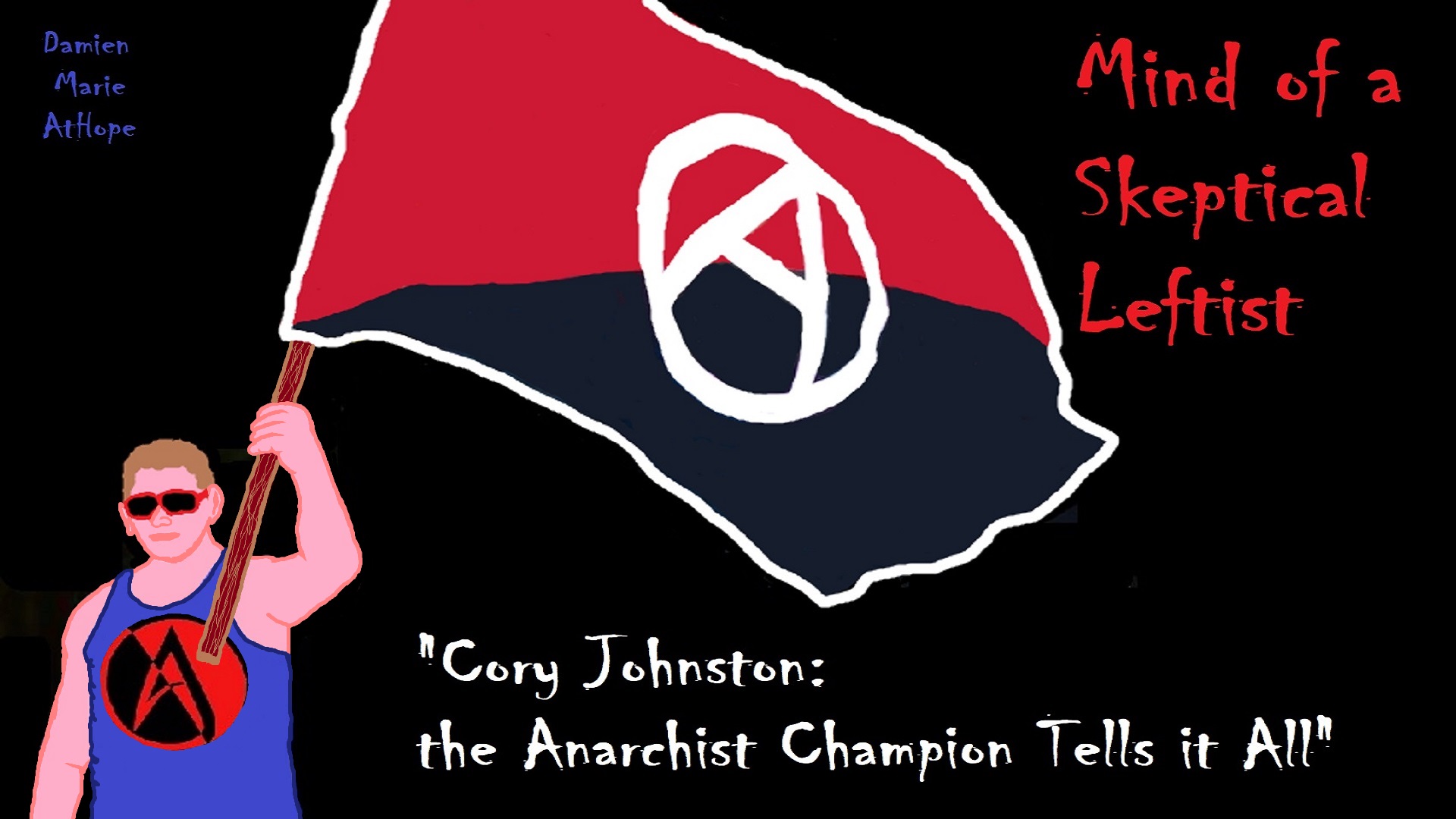
Cory Johnston ☭ Ⓐ Atheist Leftist @Skepticallefty response, “Yeah I’m not into defending Marx per se but I think you’ve got it right. Labor produces value and any profit that doesn’t go to the workers who produces that value is theft. Capitalists think that the risk of investing capital is a justification for this theft as though they have created value through their investment but they could not use that investment to create value without labor while labor can and does create value without investment from capital therefore I would say that profit is theft because that’s the word we use when a capitalist gets a return on their investment and doesn’t appropriately compensate workers.”
Cory Johnston ☭ Ⓐ @Skepticallefty Evidence-based atheist leftist (he/him) Producer, host, and co-host of 4 podcasts @skeptarchy @skpoliticspod and @AthopeMarie
@Skepticalcory Cory Johnston:
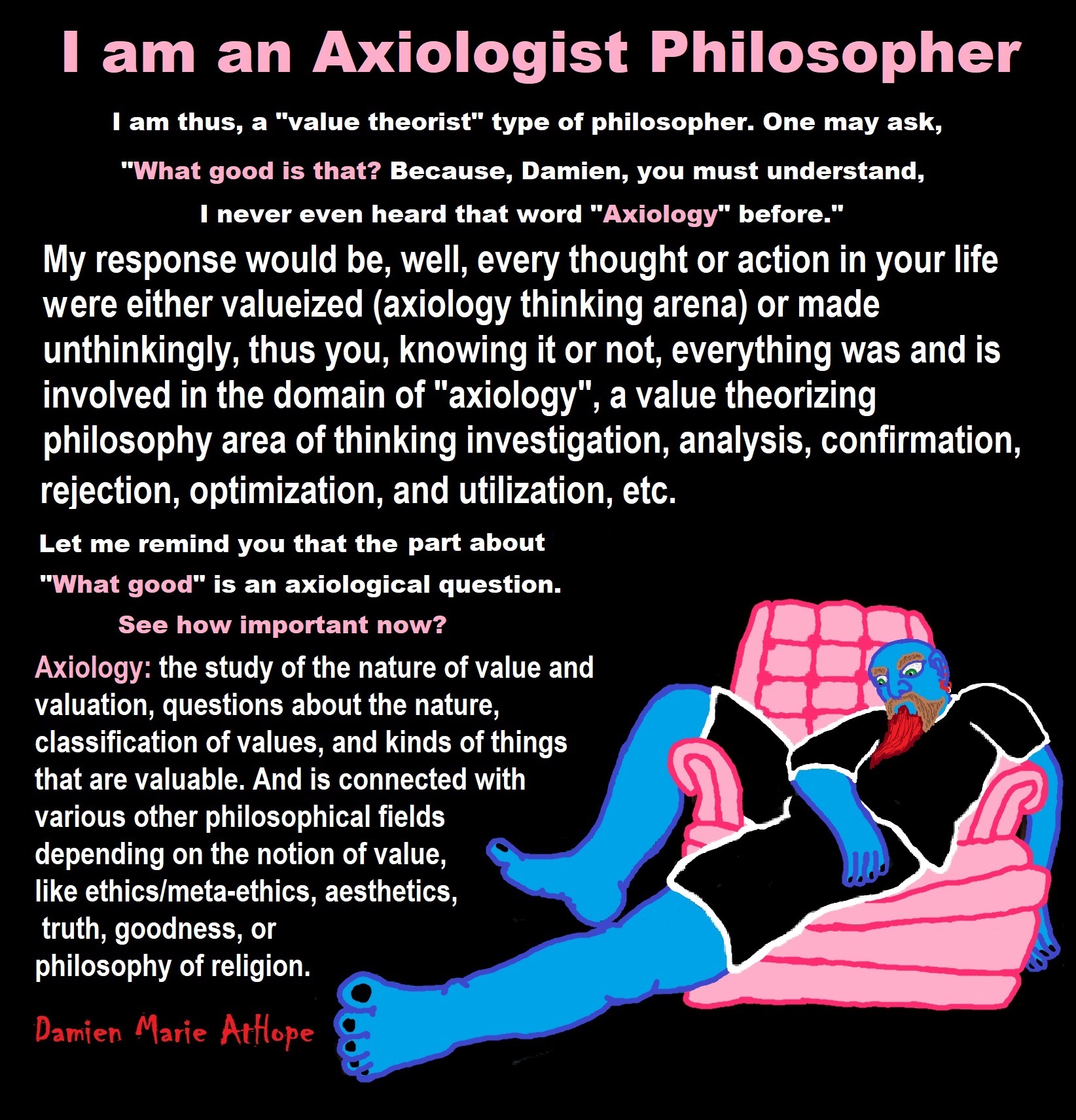
I am a Methodological Rationalist, I rarely am pushed to doubt as a default, instead, I see reason as my default and at times it may be responsible to doubt, but I get to that conclusion because of reasoning. A common saying in pseudologic is “You can’t prove a negative.” This is, simply not true. This is clearly not true because any statement can be rewritten into the negation of its negation. Any provable statement can be written as a negative. For example, “X is true” can be rewritten as “X is not false”, a negative statement! If “X is true” can be proven true, then you have also proven a negative statement “X is not false”. Moreover, even if it is widely believed that you can’t prove a negative. Going so far as to have people thinking that it is a law of logic—you can’t prove that Santa Claus, unicorns, the Loch Ness Monster, God, pink elephants, WMD in Iraq, and Bigfoot don’t exist. This widespread belief is flatly, 100% wrong. In this little essay, I show precisely how one can prove a negative, to the same extent that one can prove anything at all. Evidence of absence is evidence of any kind that suggests something is missing or that it does not exist. Per the traditional aphorism, “absence of evidence is not evidence of absence”, positive evidence of this kind is distinct from a lack of evidence or ignorance of that which should have been found already, had it existed. In this regard, Irving Copi writes: “In some circumstances, it can be safely assumed that if a certain event had occurred, evidence of it could be discovered by qualified investigators. In such circumstances, it is perfectly reasonable to take the absence of proof of its occurrence as positive proof of its non-occurrence.” — Copi, Introduction to Logic (1953), p. 95
Here is why “Reason is my only master”
The most Base Presupposition begins in reason. Reason is needed for logic (logic is realized by the aid of reason enriching its axioms). Logic is needed for axiology/value theory (axiology is realized by the aid of logic). Axiology is needed for epistemology (epistemology is realized by the aid of axiology value judge and enrich its value assumptions as valid or not). Epistemology is needed for a good ontology (ontology is realized with the aid of epistemology justified assumptions/realizations/conclusions). Then when one possesses a good ontology (fortified with valid and reliable reason and evidence) they can then say they know the ontology of that thing. Thinking is good and one claiming otherwise is indeed a person erroring in reason. Which may I remind you is terrible since the most Base Presupposition in our understanding of everything begins in reason.
So, I think, right thinking is reason. Right-reason (Sound reasoning) is logic. Right logic, can be used for mathematics, and from there we can get to science. And, by this methodological approach, we get one of the best ways of knowing the scientific method. Activating experience/event occurs, eliciting our feelings/scenes. Then naive thoughts occur, eliciting emotions as a response. Then it is our emotional intelligence over emotional hijacking, which entrance us but are unavoidable, and that it is the navigating this successfully in a methodological way we call critical thinking or as In just call right thinking. So, to me, could be termed “Right” thinking, that is referring to a kind of methodological thinking. Reason is at the base of everything and it builds up from pragmatic approaches. And, to me, there are three main approaches to truth (ontology of truth) from the very subjective (Pragmatic theory of truth), to subjective (Coherence theory of truth), then onto objective (Correspondence theory of truth) but remember that this process as limited as it can be, is the best we have and we build one truth ontop another like blocks to a wall of truth.
Soundness
“In logic, more precisely in deductive reasoning, an argument is sound if it is both valid in form and its premises are true. Soundness also has a related meaning in mathematical logic, wherein logical systems are sound if and only if every formula that can be proved in the system is logically valid with respect to the semantics of the system. In deductive reasoning, a sound argument is an argument that is both valid, and all of whose premises are true (and as a consequence its conclusion is true as well). An argument is valid if, assuming its premises are true, the conclusion must be true.” ref
An example of a sound argument is the following well-known syllogism:
“All men are mortal. Socrates is a man. Therefore, Socrates is mortal.” Because of the logical necessity of the conclusion, this argument is valid; and because the argument is valid and its premises are true, the argument is sound. However, an argument can be valid without being sound. For example: “All birds can fly. Penguins are birds. Therefore, penguins can fly.” This argument is valid because, assuming the premises are true, the conclusion must be true. However, the first premise is false. Not all birds can fly (penguins, ostriches, kiwis etc.) For an argument to be sound, the argument must be valid and its premises must be true.” ref
The soundness of a deductive system is the property that any sentence that is provable in that deductive system is also true on all interpretations or structures of the semantic theory for the language upon which that theory is based. In symbols, where S is the deductive system, L the language together with its semantic theory, and P a sentence of L: if ⊢S P, then also ⊨L P.” ref
Strong soundness
“Strong soundness of a deductive system is the property that any sentence P of the language upon which the deductive system is based that is derivable from a set Γ of sentences of that language is also a logical consequence of that set, in the sense that any model that makes all members of Γ true will also make P true. In symbols where Γ is a set of sentences of L: if Γ ⊢S P, then also Γ ⊨L P. Notice that in the statement of strong soundness, when Γ is empty, we have the statement of weak soundness.” ref
Pragmatic theory of truth, Coherence theory of truth, and Correspondence theory of truth
In a general way, all reality, in a philosophic sense, is an emergent property of reason, and knowing how reason accrues does not remove its warrant. Feelings are experienced then perceived, leading to thinking, right thinking is reason, right reason is logic, right logic is mathematics, right mathematics is physics and from there all science.
Right-(SOUND)-Reason: is reasoning to the highest soundness available.
Science is quite the opposite of just common sense. To me, common sense is experience-related interpretation, relatively, as it generally relates to the reality of things in the world, which involves “naïve realism” as well as possible psychological certainty and low epistemic certainty. Whereas, most of those who are scientific thinkers, hold typically more to scientific realism or other stances far removed from the limited common sense of naive realism. Science is a multidisciplinary methodological quest for truth. Science understands what is, while religion is wishing on what is not. Scientific realism sees external reality as described by science is what is REAL and thus TRUE with the highest epistemic certainty regardless of possible psychological certainty.
Getting Real with Logic
Logic is the result of rationalism, as what do you think gets you to logic if not starting at reason? I want to hear your justification for your claims, all the presuppositions you are evading to explain the links in your claims of truth. As it is invalid to just claim this without a justification for your professed claims and the presupposing you do to get there, that is not trying to use rationalism to refuse rationalist thinking. How are you making the statement and not appearing to what is the rationale behind it? If not, you must want to think “Logic is self-generating as valid” and this understood value is to you not reducible to reason? You are devoid of an offer of your burden of proof, first just try to keep up with the thinker’s responsibility to provide more than unjustified claims. Logic is derived by axioms and thus using rationalism to validate them, think otherwise provide your proof. My Rationalism: is two things externalistic “scientific rationalism” a belief or theory that opinions and actions should be based on reason and knowledge rather than on religious belief or emotional response. And internalistic “philosophic rationalism” the theory that reason is the most base presupposition before all others, rather than simply trying to rely on experience is the foundation of certainty in knowledge. Activating experience occurs we then have thinking, right (methodological) thinking (critical thinking) is reason, right reason is logic, right logic can be used for math, right math in response to the natural world is physics, and from there all other Sciences, physics is the foundation for chemistry and chemistry is the foundation of biology. May Right-(SOUND)-Reason be your only master and may you also master reason.
Religion vs. Science, Don’t Confuse Beliefs
A basic outline of scientific epistemology:
Science: Hypotheses (Rationalism/Deductive, Inductive, or Abductive Reasoning etc.) + Testing (Empiricism/Systematic Observation) – Checking for errors (Skepticism/Fallibilism) + Interpret/Draw a Conclusion (Rationalism/Deductive, Inductive, or Abductive Reasoning etc.) *if valid* = Scientific Laws (describes observed phenomena) or Scientific Theory (substantiated and repeatedly tested explanation of phenomena) = Justified True Belief = Scientific Knowledge = Epistemic Certainty supportive of correctability
*being epistemically certain, is believing a truth has the highest epistemic status, often with warranted psychological certainty but it may not, neither is it a requirement*
“Damien, I have a question: Who/what gives humans value?”
My response, We give value, as value is an awareness and judgment, it is an emergent property of validation; the ability to use critical thinking and logic in a useful way, to conclude worth, benefit, or good.
I am the “one” you have been waiting for. I am will to power, a deep thought so true it has taken flight to the lofty aspirations dreamed for and a care transmitted to offer hope to humanity. I believe in you and will strive to champion you with all I have for you are so worthy… I am that freak of nature, a power from the anti-power crusaders, warring against the power dynamic to return it back where it belongs- the hands of the people. I am a free-thinking invader into the shell of malignancy infecting humanity which strangles reason out of the world. A proud anarchy theorist, I breathe the fire of the heathens, a thought revolutionary and mental freedom fighter. I am a humanist atheist who desires a better world for us all, one that is kinder, more just, and more rational in its pursuits.
I am a “Scientific Axiology” minded “Philosophic Axiologist.”
*Philosophic Axiology (Value Theory)
*Scientific Axiology (Formal Axiology)
Axiological atheism can be thought to involve ethical/value theory reasoned and moral argument-driven apatheism, ignosticism, atheism, anti-theism, anti-religionism, secularism, and humanism. The valuations move up the latter as the levels of evaluation is made to value judge all the elements to better understand the value or disvalue available to reach the most accurate valuation reasonable with a sound aware value conciseness. Axiological atheism can be thought to involve Ethical Atheism. Below shows the 7 axiological atheism argument flow to show the value layers and my thoughts on it:
1. Apatheism: starts at real, we are born and by the fact reality is devoid of magic removes theological desires to understand the obvious naturalistic world, until we learn otherwise. (a “presumptive-value” failure, thus no motivation to adequately start the evaluation needed to understand if there is real value for an Axiology assessment to accurately place it in the value hierarchy). = no value
2. Ignosticism: sees theological arguments and language as equivocation, contradictory, and/or un-cognitively relatable other than emotionalism or the like. I see Ignosticism as using the Theological non-cognitivism arguments of “mind understanding issues” (rationalism challenging) and an evidentialist/verificationist arguments of “lacking evidence issues” (empiricism challenging). As an atheist, I am a person who disbelieves or lacks belief in the existence of god or gods. In my non-belief, I am also ignostic feeling that every theological position assumes too much about the concept of god(s). As an ignostic, I am a person who rational no idea of anything from reality whatever to label as “a concept of god” thus I can say I have no idea of anything that can connect to the term god and no reason to think anyone else can either. (again a “presumptive-value” failure, no good Ontology of the thing for Identifying values that could influence belief but without what is needed to understand if there is real value for an axiology assessment to accurately place it in the value hierarchy). = no value
3. Atheism: How can we not reject the concept of gods, aka: supposed supreme magical beings, when not even some simple magic is supported in reality. So how then is it not even more ridiculous to claim some supreme magic aka: gods which are even further from reality. May I remind you that faith in the acquisition of knowledge is not a valid method worth believing in. Because, what proof is “faith”, of anything religion claims by faith, as many people have different faith even in the same religion? As an atheist, I am a person who disbelieves or lacks belief in the existence of god or gods. In my non-belief, I am also ignostic feeling that every theological position assumes too much about the concept of god(s). As an ignostic, I am a person who rational no idea of anything from reality whatever to label as “a concept of god” thus I can say I have no idea of anything that can connect to the term god and no reason to think anyone else can either. Atheists talk about gods and religions for the same reason doctors talk about cancer, they are looking for a cure or a firefighter talking about fires because they burn people and they care to stop them. We atheists too often feel a need to help the victim’s of mental slavery, held in the bondage that is the false beliefs of gods and the conspiracy theories of reality found in religions. If you think you believe in a god, “what do you mean by god,” saying a name tells me not one thing about the thing I am asking to know “its” beingness / thingness / attributes / qualities. Thus, what is the thing “god” to which you are talking about and I want you to explain its beingness /thingness / attributes/ qualities? Religious/theistic people with supernatural beliefs often seem as though they haven’t thought much about and that is something we can help using ontology questions about the beingness / thingness / attributes/ qualities they are trying to refer too. What do you mean by god, when you use the term god? And, I am not asking you for the name you attach to the thing you label as a god. I don’t need to know what the god you believe is known “by.” I am asking, what is the thing you are naming as a god and what that thing is, its qualities in every detail like all things have if they are real. Are you just making stuff up or guessing/hoping or just promoting unjustified ideas you want to believe, what is a god? As an atheist, I feel more wonder than I did as a theist because I thought, “big deal” to any wonder I experienced, thinking god could do anything. So with such an unrealistic mindset, everything lost its wonder but it’s the opposite as an atheist. As a theist, the world was full of superstitions and supernatural magic possibilities and thus utilized thinking that was not in the real world. As an atheist all I have now is the real world, not that all atheists seem to get this, we all are in a real world devoid of magic anything, therefore, everything adds to my feeling of awe. There should be little debate with atheist acknowledging discernable reality compared to theists with non-reality claims. Yes, I have way more awe and wonder as an atheist than I ever had as a theist because as a theist anything was possible with god. Therefore, as a theist things where not that amazing. However, as an atheist grasping what an absolute accidental or how random things are, with a 95 to 99 % of all life ever existing on this planet went extinct. I am thoroughly amazed we are even here the evolved children of ancient exploded stars, likely born in galaxies born in super-massive black holes, it’s all amazing. There is no evidence for Gods. But is their proposition outside of reason? As always start in reality from the evidence we do know, such as never in the history of scientific research or investigation has any supernatural claims shown to be true. So it is completely outside of possibility and is utterly ridiculous. Therefore, belief should be rejected as there are no warrants at all and it is axiologically unworthy to such a preponderance to demand disbelief. (yet again a “presumptive value” failure, no good Ontology of the thing not the cognitively meaningful claims relatable to reality that must be attached to all magic and gods claims for Identifying values that could influence belief but without what is needed to understand if there is real value for an axiology assessment to accurately place it in the value hierarchy).
4. Antitheism: Anti-theism requires more than either merely disbelieving in gods or even denying the existence of gods. Anti-theism requires a couple of specific and additional beliefs: first, that theism is harmful to the believer, harmful to society, harmful to politics, harmful, to culture, etc.; second, that theism can and should be countered in order to reduce the harm it causes. If a person believes these things, then they will likely be an anti-theist who works against theism by arguing that it be abandoned, promoting alternatives, or perhaps even supporting measures to suppress it. It’s worth noting here that, however, unlikely it may be in practice, it’s possible in theory for a theist to be an anti-theist.This may sound bizarre at first, but remember that some people have argued in favor of promoting false beliefs if they are socially useful. To me, I think many may have a misconception of the term. Atheism and anti-theism so often occur together at the same time and in the same person that it’s understandable if many individuals fail to realize that they aren’t the same. Making a note of the difference is important, however, because not every atheist is anti-theistic and even those who are, aren’t anti-theistic all the time. Atheism is simply the absence of belief in gods; anti-theism is a conscious and deliberate opposition to theism.Many atheists are also anti-theists, but not all and not always. To me as an antitheist, I see the concept of gods antihumanistic and wholly harmful to a free humanity and if the so-called gods somehow do end up being real that I will switch to direct opposition as I would any tyrant oppressing humanity. Antitheism (sometimes anti-theism) is a term used to describe an opposition to theism. The term has had a range of applications and definitions. In secular contexts, it typically refers to direct opposition to the validity of theism, but not necessarily to the existence of a deity. As an anti-theist, I am a person who is active in opposition to theism: both the concepts of god(s) as well as the religions that support them.This is because theistic concepts and theistic religions are harmful and that even if theistic beliefs were true, they would be undesirable. (And, again a “presumptive value” failure, of the other value challenges of the lesser evaluations and value judgments addressed in the apatheism, ignosticism, atheism value judgment conclusion and an Axiological Atheism assessment of the god concept that must be attached to all magic and gods claims Identifying a lack of value and/or disvalue that influence harm to real value in an axiology assessment to accurately place its value violations in the value hierarchy).
5. Antireligionism: Not just Atheist, axiological atheists should be antitheists but this generally will involve anti-religionism. it would generally thus hold anti-religionist thinking. Especially, I am an anti-religionist, not just an atheist, and here is why summed up in three ideas I am against. And, in which these three things are common in all religions: “pseudo-science”, “pseudo-history”, and “pseudo-morality”. And my biggest thing of all is the widespread forced indoctrination of children, violating their free choice of what to not believe or believe, I hate forced hereditary religion. And my biggest thing of all is the widespread forced indoctrination of children, violating their free choice of what to not believe or believe, I hate forced hereditary religion. As well as wish to offer strong critiques regarding the pseudo-meaning of the “three letter noise” people call “G.o.d” (group originated delusion)!As an anti-religionist, I am a person who can look at religion on the whole and see it is detrimental to the progress of humanity thus am in opposition to all and every religion, not even just opposition to organized religion. In case you were wondering, I am anti-pseudoscience, anti-supernatural, and anti-superstition as well. May I not be a silent watcher as millions of children are subjugated almost before their birth let alone when they can understand thought and are forcibly coerced, compelled, constrained, and indoctrinated in the mental pollution that religion can be. My main goal against religion is to fully stop as much as possible forced indoctrination, one could ask but then why do I challenge all adults faith?Well, who do you think is doing the lying to children in the first place. End Hereditary religion, if its a belief let them the equal right to choose to believe. “Religion is an Evolved Product” and Yes, Religion is Like Fear Given Wings… (And, one last time a “presumptive value” failure, of the other value challenges of the lesser evaluations and value judgments addressed in the apatheism, ignosticism, atheism value judgment conclusion and an Axiological Atheism assessment of the god concept and anti-theism assessment of the god show not just a lack of value but a possibly or likely harm demonstrating bot just a lack of value but a real disvalue and that includes the religions potentially removing value in an axiology assessment to accurately place it in the value hierarchy).
6. Secularism: is the only honorable way to value the dignity of others. If it was not true that there is a large unequal distribution of religion contributing to violence then there would be equal religion and atheist secularism violence. You do not see atheists bombing agnostics the very idea is laughable however even different branches of the same religion do will and have killed one another. So, violence not who we are it’s something we need to be compelled to do. Therefore, please support secularism. We are all one connected human family, proven by DNA showing we should treat each other as fellow dignity beings, supported equally (no gods and no masters). States may often have powers, but only citizens have the glue of morality we call rights. And, as they say, in my “dream society”, lots of things are free (aka. planting free food everywhere, free to everyone); but I wonder what you mean when people say you can’t just let things be free, I think, yeah, how can I take free stuff from a free earth.If one observes the virtues of (T. R. U. E. “The Rational Universal Ethics” or “The Responsible Universal Ethics”) that connect to all things as that of the connectedness equality like those which mirror the rays of the sun, fall down equally with a blind but fair indifference. (what is being expressed is that this sun shining will not favor one over another, no, the same upon everyone offering its light to all plant, animal, human, women, men, single or married, homosexual, bisexual, heterosexual, nonreligious, religious, people of means and those without, able-bodied and those which special needs, people of color, and those who are not, those with access to resources and those which out, young and elderly, etc.) All who wish to follow T. R. U. E. thus embodying a universalize equalitarian standard of ethics should strive to be like a ray of connected light to the world, shining equally and freedom to all of the world by such efforts a nonbiased unitive ethical approach is possible, one would have an increase in positive feelings to help others understanding equalitarian connectedness. If you don’t think different you will not behave differently, if you have never lived differently it is hard to see things differently and if you do not strive to understand difference one is thus unknowingly or not bound by limited encapsulation. I am for a Free Secular Society. I am not for oppression or abuse of religious believer and want a free secular society with both freedoms of religion and freedom from religion. Even though I wish the end of faith and believing in myths and superstition, I wish this by means of informing the willing and not force of the unwilling. I will openly challenge and rebuff religious falsehoods and misunderstanding as well as rebuke and ridicule harmful or unethical religious ideology or behavior.
7. Humanism: is the philosophic thinking that humans can solve human problems by human means, without feeling a need to appeal to the likes of holy books, mystical anything, nor the belief in gods or religions. But, instead, aspires to a true belief in humanity, viewing it with a persuasion of equality. This caring realist thinking found in humanism utilizes an unstated assumption or aspiration, to do no harm as much as possible and to do good whenever one can.Moreover, we are all one connected human family, proven by DNA showing we should treat each other as fellow dignity beings, supported equally. And, no one really owns the earth, we may make claims to it even draw lines on maps thinking this makes the fantasy borders, illusion supported by force and the potential for threat. Thus the ethical truth is we need to share the earth as communally as possible. And use the resources as safe and ethically as possible striving towards sharing and caring. (do no Harm and do good = Humanism). My core definition of humanism is that humans can solve human problems by human means. I am not saying other things can’t or shouldn’t be added to it but to me, a definition of humanism must always contain something coherent to such a thinking or not contradict such as I have offered. Thus, why it is appropriate to say “good without god” when one is a humanist.
Dogmatic–Propaganda vs. Disciplined-Rationality
Religionists and fideists, promote Dogmatic-Propaganda whereas atheists and antireligionists mostly promote Disciplined-Rationality. Dogmatic–Propaganda commonly is a common motivator of flawed or irrational thinking but with over seventy belief biases identified in people, this is hardly limited to just the religious or faith inclined. Let me illustrate what I am saying, to me all theists are believing lies or irrationally in that aspect of their lives relating to god belief. So the fact of any other common intellectual indexers where there may be “right” reason in beliefs cannot remove the flawed god belief corruption being committed. What I am saying is like this if you kill one person you are a killer. If you believe in one “god” I know you are a follower of Dogmatic-Propaganda and can not completely be a follower of Disciplined-Rationality. However, I am not proclaiming all atheists are always rational as irrationally is a revolving door many people believe or otherwise seem to stumble through. It’s just that god-belief does this with intentionally.
Disciplined-Rationality is motivated by principles of correct reasoning with emphasis on valid and reliable methods or theories leading to a range of rational standpoints or conclusions understanding that concepts and beliefs often have consequences thus hold an imperative for truth or at least as close to the truth as can be acquired rejecting untruth. Disciplined-Rationality can be seen as an aid in understanding the fundamentals for knowledge, sound evidence, justified true belief and involves things like decision theory and the concern with identifying the value(s), reasonableness, verification, certainties, uncertainties, and other relevant issues resulting in the clearest optimal decision/conclusion and/or belief/disbelief. Disciplined-Rationality attempts to understand the justification or lack thereof in propositions and beliefs concerning its self with various epistemic features of belief, truth, and/or knowledge, which include the ideas of justification, warrant, rationality, reliability, validity, and probability.
ps. “Sound Thinker”, “Shallow Thinker”, “Dogmatic–Propaganda” & “Disciplined-Rationality” are concepts/terms I created*
Atheists but I have faith in gravity tho, but it isn’t exactly “faith”???
My response, “No, I don’t agree, you don’t have “faith” in gravity or gravitation, as it is “a fundamental force” you have proof or if lacking some direct proof would use inference, and if even less evidence you use conjecture, not faith. Do you gauntly thinking you need faith in gravity because you wonder or worry that when walking down a set of stairs that you going to fall back up? You don’t need faith (strong belief without evidence) as there is massive proof, almost to the point that it is easily self-evident. You don’t need faith (strong belief without evidence) for anything, as if it’s warranted it will or should have evidence or it doesn’t deserve not only strong belief but any amount of belief at all as sound beliefs need something to ground their worthiness in relation to reality; the only place evidence comes. “Gravity, or gravitation, is a natural phenomenon by which all things with mass are brought toward (or gravitate toward) one another, including planets, stars, and galaxies.” Ref
“Gravity is responsible for various phenomena observed on Earth and throughout the Universe; for example, it causes the Earth and the other planets to orbit the Sun, the Moon to orbit the Earth, the formation of tides, the formation and evolution of the Solar System, stars and galaxies. Since energy and mass are equivalent, all forms of energy, including light, also cause gravitation and are under the influence of it. On Earth, gravity gives weight to physical objects and causes the ocean tides. The gravitational attraction of the original gaseous matter present in the Universe caused it to begin coalescing, forming stars – and the stars to group together into galaxies – so gravity is responsible for many of the large-scale structures in the Universe.” Ref
Axiological “Presumptive-Value”
Your god myth is an Axiological “Presumptive-Value” Failure, and I as an Axiological (value theorist) Atheist am compelled to speak out on how Claims of god are a Presumptive-Value failure. Simply, if you presume a thing is of value that you can’t justify, then you have committed an axiological presumptive value failure.
Axiological “presumptive-value” Success: Sound Thinker: uses disciplined rationality (sound axiological judgment the evaluation of evidence to make a decision) supporting a valid and reliable justification.
Axiological “presumptive-value” Failure: Shallow Thinker: undisciplined, situational, sporadic, or limited thinking (unsound axiological judgment, lacking required evidence to make a “presumptive-value” success decision) lacking the support of a needed valid and reliable justification.
Often I get disheartened to see that so many people can look at the unknown or that which is devoid of any and all understanding and claim to know that this is evidence for some god or another. How can they with all honesty even say that they somehow already know about an established scientific unknown, when all along it is what it ever was, which I will remind you, is currently holding a confirmed status of unknown. Thus, still fully intact as currently unknowable (I.e. you simply cannot justifiability claim that such unknown is god or evidence of god). What really is a god anyway? The term god equals mystery that is used to explain the mysterious leaving us with yet more mystery, thus explains nothing. Claims of god are a Presumptive-Value failure. Simply, if you presume a thing is of value that you can’t justify, then you have committed an axiological presumptive value failure. Axiological “presumptive-value” Success: Sound Thinker: uses disciplined rationality (sound axiological judgment the evaluation of evidence to make a decision) supporting a valid and reliable justification.
“Ok, So basically, the difference between reasoning with evidence and without?” – Questioner
My response, Well with or without valid justification because of evidence. As in you can’t claim to know the value of something you can’t demonstrate as having good qualities to attach the value claim too so if you lack evidence of the thing in question then you cannot validate its value. So it’s addressing a kind of justificationism (uncountable) Theory of justification, An (philosophy standard) approach that regards the justification of a claim as primary, while the claim itself is secondary; thus, criticism consists of trying to show that a claim cannot be reduced to the authority or criteria that it appeals to. Think of is as a use-matrix. If I say this is of great use for that, can you validate its use or value, and can I use this as a valid method to state a valid justification for my claims without evidence to value judge from? No, thus an axiological presumptive-value failure as a valid anything.
Theory of justification is a part of epistemology that attempts to understand the justification of propositions and beliefs. Epistemologists are concerned with various epistemic features of belief, which include the ideas of justification, warrant, rationality, and probability. Loosely speaking, justification is the reason that someone (properly) holds a belief. When a claim is in doubt, justification can be used to support the claim and reduce or remove the doubt. Justification can use empiricism (the evidence of the senses), authoritative testimony (the appeal to criteria and authority), or reason. – Wikipedia
“Presumptions are things that are credited as being true until evidence of their falsity is presented. Presumptions have many forms and value (Axiology) is just one. In ethics, value denotes the degree of importance of something or action, with the aim of determining what actions are best to do or what way is best to live (normative ethics), or to describe the significance of different actions. It may be described as treating actions as abstract objects, putting VALUE to them.
It deals with right conduct and living a good life, in the sense that a highly, or at least relatively high valuable action may be regarded as ethically “good” (adjective sense), and that an action of low value, or relatively low in value, may be regarded as “bad”. What makes an action valuable may, in turn, depend on the ethical values of the objects it increases, decreases, or alters. An object with “ethic value” may be termed an “ethic or philosophic good” (noun sense). Values can be defined as broad preferences concerning appropriate courses of actions or outcomes. As such, values reflect a person’s sense of right and wrong or what “ought” to be.
“Equal rights for all”, “Excellence deserves admiration”, and “People should be treated with respect and dignity” are representatives of values. Values tend to influence attitudes and behavior and these types include ethical/moral values, doctrinal/ideological(religious, political) values, social values, and aesthetic values. It is debated whether some values that are not clearly physiologically determined, such as altruism, are intrinsic, and whether some, such as acquisitiveness, should be classified as vices or virtues.” ref, ref
The Way of a Sound Thinker?
“Sound thinking to me, in a general way, is thinking, reasoning, or belief that tends to make foresight a desire to be as accurate as one can with valid and reliable reason and evidence.”
Sound axiological judgment, to me, a “presumptive-value” success, is value judged opinions expressed as facts with a valid and reliable justification. In an informal and psychological sense, it is used in reference to the quality of cognitive faculties and adjudicational (relating to adjudication) capabilities of particular individuals, typically called wisdom or discernment. In a legal sense, – used in the context of a legal trial, to refer to a final finding, statement, or ruling, based on a considered weighing of evidence, called, “adjudication“.
A shallow thinker (i.e. not a Deep Thinker, a person whose thoughts are reasoned, methodological, logical, empirical, profound; an intellectual) quickly talks, often with boastful postulations, likely just as often pushed strongly and loudly as if this adds substance, and they do this before fully understanding what’s is really involved. Whereas, a Sound Thinker is reasoned (comparative more reasoned, superlative most reasoned) generally based on reasoning; being the result of logical thought. As a first debate process, a Sound Thinker commonly poses Questions to understand slowing down and assessing all the facts or factors involved and then builds their argument or ideas. In classical logic, the law of non-contradiction (LNC) (also known as the law of contradiction, the principle of non-contradiction (PNC), or the principle of contradiction) states that contradictory statements cannot both be true in the same sense at the same time, e.g. the two propositions “A is B” and “A is not B” are mutually exclusive. It is the second of the three classic laws of thought.
Here are examples of theoretical philosophy subjects I delve into:
Ontology
Epistemology
Axiology
Ignosticism
Atheism
Rationalism
Antitheism
Antireligion
Anarchism
Secularism
Secular humanism
Humanism
Theories of truth
Questions on knowledge
Practical philosophy
Logic
Questions on Morality
Feminist philosophy
Philosophy of science
Philosophy of language
Philosophy of mind
Metaphysics
Axiology and Value Theory?
“Value theory is a range of approaches to understanding how, why, and to what degree persons value things; whether the object or subject of valuing is a person, idea, object, or anything else. This investigation began in ancient philosophy, where it is called axiology or ethics.”– Wikipedia
“The term “Value Theory” is used in at least three different ways in philosophy. In its broadest sense, “value theory” is a catch-all label used to encompass all branches of moral philosophy, social and political philosophy, aesthetics, and sometimes feminist philosophy and the philosophy of religion — whatever areas of philosophy are deemed to encompass some “evaluative” aspect. In its narrowest sense, “value theory” is used for a relatively narrow area of normative ethical theory particularly, but not exclusively, of concern to consequentialists. In this narrow sense, “value theory” is roughly synonymous with “axiology”. Axiology can be thought of as primarily concerned with classifying what things are good, and how good they are. – (Stanford Encyclopedia of Philosophy)
For instance, a traditional question of axiology concerns whether the objects of value are subjective psychological states or objective states of the world. But in a more useful sense, “value theory” designates the area of moral philosophy that is concerned with theoretical questions about value and goodness of all varieties — the theory of value. The theory of value, so construed, encompasses axiology, but also includes many other questions about the nature of value and its relation to other moral categories. – (Stanford Encyclopedia of Philosophy)
The division of moral theory into the theory of value, as contrasting with other areas of investigation, cross-cuts the traditional classification of moral theory into normative and metaethical inquiry, but is a worthy distinction in its own right; theoretical questions about value constitute a core domain of interest in moral theory, often cross the boundaries between the normative and the metaethical, and have a distinguished history of investigation.” – (Stanford Encyclopedia of Philosophy)
Normative Philosophy? – Wikipedia
“Normative generally means relating to an evaluative standard. Normativity is the phenomenon in human societies of designating some actions or outcomes as good or desirable or permissible and others as bad or undesirable or impermissible. A norm in this normative sense means a standard for evaluating or making judgments about behavior or outcomes. – Wikipedia
Normative is sometimes also used, somewhat confusingly, to mean relating to a descriptive standard: doing what is normally done or what most others are expected to do in practice. In this sense a norm is not evaluative, a basis for judging behavior or outcomes; it is simply a fact or observation about behavior or outcomes, without judgment. Many researchers in this field try to restrict the use of the term normative to the evaluative sense and refer to the description of behavior and outcomes as positive, descriptive, predictive, or empirical. – Wikipedia
In philosophy, normative statements make claims about how things should or ought to be, how to value them, which things are good or bad, and which actions are right or wrong. Normative claims are usually contrasted with positive (i.e. descriptive, explanatory, or constative) claims when describing types of theories, beliefs, or propositions. Positive statements are (purportedly) factual statements that attempt to describe reality. Normative statements and norms, as well as their meanings, are an integral part of human life. – Wikipedia
They are fundamental for prioritizing goals and organizing and planning. Thought, belief, emotion, and action are the basis of much ethical and political discourse; indeed, normativity is arguably the key feature distinguishing ethical and political discourse from other discourses (such as natural science). Much modern moral/ethical philosophy takes as its starting point the apparent variance between peoples and cultures regarding the ways they define what is considered to be appropriate/desirable/praiseworthy/valuable/good etc. (In other words, variance in how individuals, groups, and societies define what is in accordance with their normative standards.) – Wikipedia
This has led philosophers such as A.J. Ayer and J.L. Mackie (for different reasons and in different ways) to cast doubt on the meaningfulness of normative statements. Philosophers, such as Christine Korsgaard, have argued for a source of normative value which is independent of individuals’ subjective morality and which consequently attains (a lesser or greater degree of) objectivity. In the social sciences, the term “normative” has broadly the same meaning as its usage in philosophy, but may also relate, in a sociological context, to the role of cultural ‘norms‘; the shared values or institutions that structural functionalists regard as constitutive of the social structure and social cohesion. – Wikipedia
These values and units of socialization thus act to encourage or enforce social activity and outcomes that ought to (with respect to the norms implicit in those structures) occur, while discouraging or preventing social activity that ought not to occur. That is, they promote social activity that is socially valued. While there are always anomalies in social activity (typically described as “crime” or anti-social behavior, see also normality (behavior)) the normative effects of popularly endorsed beliefs (such as “family values” or “common sense“) push most social activity towards a generally homogeneous set.” – Wikipedia
Theoretical philosophy? – Wikipedia
“The division of philosophy into a practical and a theoretical discipline has its origin in Aristotle‘s moral philosophy and natural philosophy categories. Theoretical philosophy is sometimes confused with Analytic philosophy, but the latter is a philosophical movement, embracing certain ideas and methods but dealing with all philosophical subject matters, while the former is a way of sorting philosophical questions into two different categories in the context of a curriculum. – Wikipedia
Hammer of Truth that lying pig RELIGION: challenged by an archaeologist
“The Hammer of Truth” -ontology question- What do You Mean by That?
Hammer of Truth: Investigate (ONTOLOGY), Expose (EPISTEMOLOGY), and Judge (AXIOLOGY)
Hammer of Truth: Yes, you too, have lots of beliefs…
“The Hammer of Truth” Process
“Hammer of Truth” response to “Do you Believe in god?”
“The Hammer of Truth” (scientific philosophy: Ontology, Epistemology, & Axiology) in action.
Error Crushing Force of the Dialectic Questions and the Hammer of Truth
Atheist Rationalist Talking on “TRUTH” with a Spiritualist Philosopher
Damien AtHope: Pre-Historical Writer/Researcher chats with Lisa For Truth: Origins of Religion and Anthropology of Religion
Truth Navigation: “Belief-Etiquette”
Truth Navigation and the fallacy of Fideism “faith-ism”
Truth Navigation: Techniques for Discussions or Debates
Science and the word “TRUTH”
Truth Navigation and the fallacy of Fideism “faith-ism”
Truth is a Value (axiological) Judgment.
Why are lies more appealing than the truth?
The Battle of Truth
To Find Truth You Must First Look
Pragmatic theory of truth, Coherence theory of truth, and Correspondence theory of truth
I use a kind of Dialectical Rhetoric = truth persuasion (motivational teaching)
Religion is not about truth
#rationalism #philosapgy #atheism

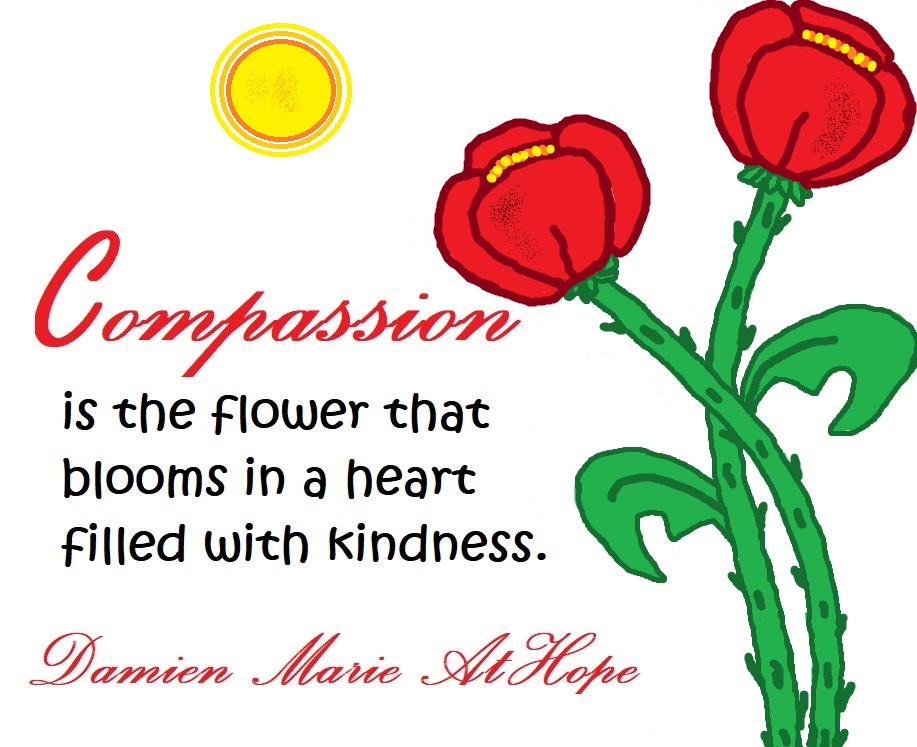
Check out my political page on Facebook: Axiological Leftist
Check out my Atheist page on Facebook: Axiological Atheist
Check out my Atheist Sexuality page on Facebook: Atheist for Non-monogamy
Check out my Facebook: Damien Marie AtHope
Check out my Anti-Trump Atheist group on Facebook: Atheists Against Trump
Check out my Atheist Anarcho-Humanist group on Facebook: HARP
Noam Chomsky: The Kind of Anarchism I Believe in, and What’s Wrong with Libertarians
Anarchism “assumes that the burden of proof for anyone in a position of power and authority lies on them,” explains Chomsky.
The following is the adapted text of an interview that first appeared in Modern Success magazine.
So many things have been written about, and discussed by, Professor Chomsky, it was a challenge to think of anything new to ask him: like the grandparent you can’t think of what to get for Christmas because they already have everything.
Michael S. Wilson: You are, among many other things, a self-described anarchist — an anarcho-syndicalist, specifically. Most people think of anarchists as disenfranchised punks throwing rocks at store windows, or masked men tossing ball-shaped bombs at fat industrialists. Is this an accurate view? What is anarchy to you?
Noam Chomsky: Well, anarchism is, in my view, basically a kind of tendency in human thought which shows up in different forms in different circumstances, and has some leading characteristics. Primarily it is a tendency that is suspicious and skeptical of domination, authority, and hierarchy. It seeks structures of hierarchy and domination in human life over the whole range, extending from, say, patriarchal families to, say, imperial systems, and it asks whether those systems are justified. It assumes that the burden of proof for anyone in a position of power and authority lies on them. Their authority is not self-justifying. They have to give a reason for it, a justification. And if they can’t justify that authority and power and control, which is the usual case, then the authority ought to be dismantled and replaced by something more free and just. And, as I understand it, anarchy is just that tendency. It takes different forms at different times.Anarcho-syndicalism is a particular variety of anarchism which was concerned primarily, though not solely, but primarily with control over work, over the work place, over production. It took for granted that working people ought to control their own work, its conditions, [that] they ought to control the enterprises in which they work, along with communities, so they should be associated with one another in free associations, and … democracy of that kind should be the foundational elements of a more general free society. And then, you know, ideas are worked out about how exactly that should manifest itself, but I think that is the core of anarcho-syndicalist thinking. I mean it’s not at all the general image that you described — people running around the streets, you know, breaking store windows — but [anarcho-syndicalism] is a conception of a very organized society, but organized from below by direct participation at every level, with as little control and domination as is feasible, maybe none.
Wilson: With the apparent ongoing demise of the capitalist state, many people are looking at other ways to be successful, to run their lives, and I’m wondering what you would say anarchy and syndicalism have to offer, things that others ideas — say, for example, state-run socialism — have failed to offer? Why should we choose anarchy, as opposed to, say, libertarianism?
Chomsky: Well what’s called libertarian in the United States, which is a special U. S. phenomenon, it doesn’t really exist anywhere else — a little bit in England — permits a very high level of authority and domination but in the hands of private power: so private power should be unleashed to do whatever it likes. The assumption is that by some kind of magic, concentrated private power will lead to a more free and just society. Actually that has been believed in the past. Adam Smith for example, one of his main arguments for markets was the claim that under conditions of perfect liberty, markets would lead to perfect equality. Well, we don’t have to talk about that! That kind of —
Wilson: It seems to be a continuing contention today …
Chomsky: Yes, and so well that kind of libertarianism, in my view, in the current world, is just a call for some of the worst kinds of tyranny, namely unaccountable private tyranny. Anarchism is quite different from that. It calls for an elimination to tyranny, all kinds of tyranny. Including the kind of tyranny that’s internal to private power concentrations. So why should we prefer it? Well I think because freedom is better than subordination. It’s better to be free than to be a slave. It’s better to be able to make your own decisions than to have someone else make decisions and force you to observe them. I mean, I don’t think you really need an argument for that. It seems like … transparent.
The thing you need an argument for, and should give an argument for, is, How can we best proceed in that direction? And there are lots of ways within the current society. One way, incidentally, is through use of the state, to the extent that it is democratically controlled. I mean in the long run, anarchists would like to see the state eliminated. But it exists, alongside of private power, and the state is, at least to a certain extent, under public influence and control — could be much more so. And it provides devices to constrain the much more dangerous forces of private power. Rules for safety and health in the workplace for example. Or insuring that people have decent health care, let’s say. Many other things like that. They’re not going to come about through private power. Quite the contrary. But they can come about through the use of the state system under limited democratic control … to carry forward reformist measures. I think those are fine things to do. they should be looking forward to something much more, much beyond, — namely actual, much larger-scale democratization. And that’s possible to not only think about, but to work on. So one of the leading anarchist thinkers, Bakunin in the 19th cent, pointed out that it’s quite possible to build the institutions of a future society within the present one. And he was thinking about far more autocratic societies than ours. And that’s being done. So for example, worker- and community- controlled enterprises are germs of a future society within the present one. And those not only can be developed, but are being developed. There’s some important work on this by Gar Alperovitz who’s involved in the enterprise systems around the Cleveland area which are worker and community controlled. There’s a lot of theoretical discussion of how it might work out, from various sources. Some of the most worked out ideas are in what’s called the “parecon” — participatory economics — literature and discussions. And there are others. These are at the planning and thinking level. And at the practical implementation level, there are steps that can be taken, while also pressing to overcome the worst … the major harms … caused by … concentration of private power through the use of state system, as long as the current system exists. So there’s no shortage of means to pursue.
As for state socialism, depends what one means by the term. If it’s tyranny of the Bolshevik variety (and its descendants), we need not tarry on it. If it’s a more expanded social democratic state, then the comments above apply. If something else, then what? Will it place decision-making in the hands of working people and communities, or in hands of some authority? If the latter, then — once again — freedom is better than subjugation, and the latter carries a very heavy burden of justification.
Wilson: Many people know you because of your and Edward Herman’s development of the Propaganda Model. Could you briefly describe that model and why it might be important to [college] students?
Chomsky: Well first look back a bit — a little historical framework — back in the late 19th-, early 20th century, a good deal of freedom had been won in some societies. At the peak of this were in fact the United States and Britain. By no means free societies, but by comparative standards quite advanced in this respect. In fact so advanced, that power systems — state and private — began to recognize that things were getting to a point where they can’t control the population by force as easily as before, so they are going to have to turn to other means of control. And the other means of control are control of beliefs and attitudes. And out of that grew the public relations industry, which in those days described itself honestly as an industry of propaganda.
The guru of the PR industry, Edward Bernays — incidentally, not a reactionary, but a Wilson-Roosevelt-Kennedy liberal — the maiden handbook of the PR industry which he wrote back in the 1920s was calledPropaganda. And in it he described, correctly, the goal of the industry. He said our goal is to insure that the “intelligent minority” — and of course anyone who writes about these things is part of that intelligent minority by definition, by stipulation, so we, the intelligent minority, are the only people capable of running things, and there’s that great population out there, the “unwashed masses,” who, if they’re left alone will just get into trouble: so we have to, as he put it, “engineer their consent,” figure out ways to insure they consent to our rule and domination. And that’s the goal of the PR industry. And it works in many ways. Its primary commitment is commercial advertising. In fact, Bernays made his name right at that time — late 20s — by running an advertising campaign to convince women to smoke cigarettes: women weren’t smoking cigarettes, this big group of people who the tobacco industry isn’t able to kill, so we’ve got to do something about that. And he very successfully ran campaigns that induced women to smoke cigarettes: that would be, in modern terms, the cool thing to do, you know, that’s the way you get to be a modern, liberated woman. It was very successful —
Wilson: Is there a correlation between that campaign and what’s happening with the big oil industry right now and climate change?
Chomsky: These are just a few examples. These are the origins of what became a huge industry of controlling attitudes and opinions. Now the oil industry today, and in fact the business world generally, are engaged in comparable campaigns to try to undermine efforts to deal with a problem that’s even greater than the mass murder that was caused by the tobacco industry; and it was mass murder. We are facing a threat, a serious threat, of catastrophic climate change. And it’s no joke. And [the oil industry is] trying to impede measures to deal with it for their own short-term profit interests. And that includes not only the petroleum industry, but the American Chamber of Commerce — the leading business lobby — and others, who’ve stated quite openly that they’re conducting … they don’t call it propaganda … but what would amount to propaganda campaigns to convince people that there’s no real danger and we shouldn’t really do much about it, and that we should concentrate on really important things like the deficit and economic growth — what they call ‘growth’ — and not worry about the fact that the human species is marching over a cliff which could be something like [human] species destruction; or at least the destruction of the possibility of a decent life for huge numbers of people. And there are many other correlations.
In fact quite generally, commercial advertising is fundamentally an effort to undermine markets. We should recognize that. If you’ve taken an economics course, you know that markets are supposed to be based on informed consumers making rational choices. You take a look at the first ad you see on television and ask yourself … is that its purpose? No it’s not. It’s to create uninformed consumers making irrational choices. And these same institutions run political campaigns. It’s pretty much the same: you have to undermine democracy by trying to get uninformed people to make irrational choices. And so this is only one aspect of the PR industry. What Herman and I were discussing was another aspect of the whole propaganda system that developed roughly at that period, and that’s “manufacture of consent,” as it was called, [consent] to the decisions of our political leaders, or the leaders of the private economy, to try to insure that people have the right beliefs and don’t try to comprehend the way decisions are being made that may not only harm them, but harm many others. That’s propaganda in the normal sense. And so we were talking about mass media, and the intellectual community of the world in general, which is to a large extent dedicated to this. Not that people see themselves as propagandists, but … that they are themselves deeply indoctrinated into the principles of the system, which prevent them from perceiving many things that are really right on the surface, [things] that would be subversive to power if understood. We give plenty of examples there and there’s plenty more you can mention up to the present moment, crucial ones in fact. That’s a large part of a general system of indoctrination and control that runs parallel to controlling attitudes and … consumeristic commitments, and other devices to control people.
You mentioned students before. Well one of the main problems for students today — a huge problem — is sky-rocketing tuitions. Why do we have tuitions that are completely out-of-line with other countries, even with our own history? In the 1950s the United States was a much poorer country than it is today, and yet higher education was … pretty much free, or low fees or no fees for huge numbers of people. There hasn’t been an economic change that’s made it necessary, now, to have very high tuitions, far more than when we were a poor country. And to drive the point home even more clearly, if we look just across the borders, Mexico is a poor country yet has a good educational system with free tuition. There was an effort by the Mexican state to raise tuition, maybe some 15 years ago or so, and there was a national student strike which had a lot of popular support, and the government backed down. Now that’s just happened recently in Quebec, on our other border. Go across the ocean: Germany is a rich country. Free tuition. Finland has the highest-ranked education system in the world. Free … virtually free. So I don’t think you can give an argument that there are economic necessities behind the incredibly high increase in tuition. I think these are social and economic decisions made by the people who set policy. And [these hikes] are part of, in my view, part of a backlash that developed in the 1970s against the liberatory tendencies of the 1960s. Students became much freer, more open, they were pressing for opposition to the war, for civil rights, women’s rights … and the country just got too free. In fact, liberal intellectuals condemned this, called it a “crisis of democracy:” we’ve got to have more moderation of democracy. They called, literally, for more commitment to indoctrination of the young, their phrase … we have to make sure that the institutions responsible for the indoctrination of the young do their work, so we don’t have all this freedom and independence. And many developments took place after that. I don’t think we have enough direct documentation to prove causal relations, but you can see what happened. One of the things that happened was controlling students — in fact, controlling students for the rest of their lives, by simply trapping them in debt. That’s a very effective technique of control and indoctrination. And I suspect — I can’t prove — but I suspect that that’s a large part of the reason behind [high tuitions]. Many other parallel things happened. The whole economy changed in significant ways to concentrate power, to undermine workers’ rights and freedom. In fact the economist who chaired the Federal Reserve around the Clinton years, Alan Greenspan — St. Alan as he was called then, the great genius of the economics profession who was running the economy, highly honored — he testified proudly before congress that the basis for the great economy that he was running was what he called “growing worker insecurity.” If workers are more insecure, they won’t do things, like asking for better wages and better benefits. And that’s healthy for the economy from a certain point of view, a point of view that says workers ought to be oppressed and controlled, and that wealth ought to be concentrated in a very few pockets. So yeah, that’s a healthy economy, and we need growing worker insecurity, and we need growing student insecurity, for similar reasons. I think all of these things line up together as part of a general reaction — a bipartisan reaction, incidentally — against liberatory tendencies which manifested themselves in the 60s and have continued since.
Wilson: [Finally, ]I’m wondering if you could [end with some advice for today’s college students].
Chomsky: There are plenty of problems in the world today, and students face a number of them, including the ones I mentioned — the joblessness, insecurity and so on. Yet on the other hand, there has been progress. In a lot of respects things are a lot more free and advanced than they were … not many years ago. So many things that were really matters of struggle, in fact even some barely even mentionable, say, in the 1960s, are now … partially resolved. Things like women’s rights. Gay rights. Opposition to aggression. Concern for the environment — which is nowhere near where it ought to be, but far beyond the 1960s. These victories for freedom didn’t come from gifts from above. They came from people struggling under conditions that are harsher than they are now. There is state repression now. But it doesn’t begin to compare with, say, Cointelpro in the 1960s. People that don’t know about that ought to read and think to find out. And that leaves lots of opportunities. Students, you know, are relatively privileged as compared with the rest of the population. They are also in a period of their lives where they are relatively free. Well that provides for all sorts of opportunities. In the past, such opportunities have been taken by students who have often been in the forefront of progressive change, and they have many more opportunities now. It’s never going to be easy. There’s going to be repression. There’s going to be backlash. But that’s the way society moves forward. Ref
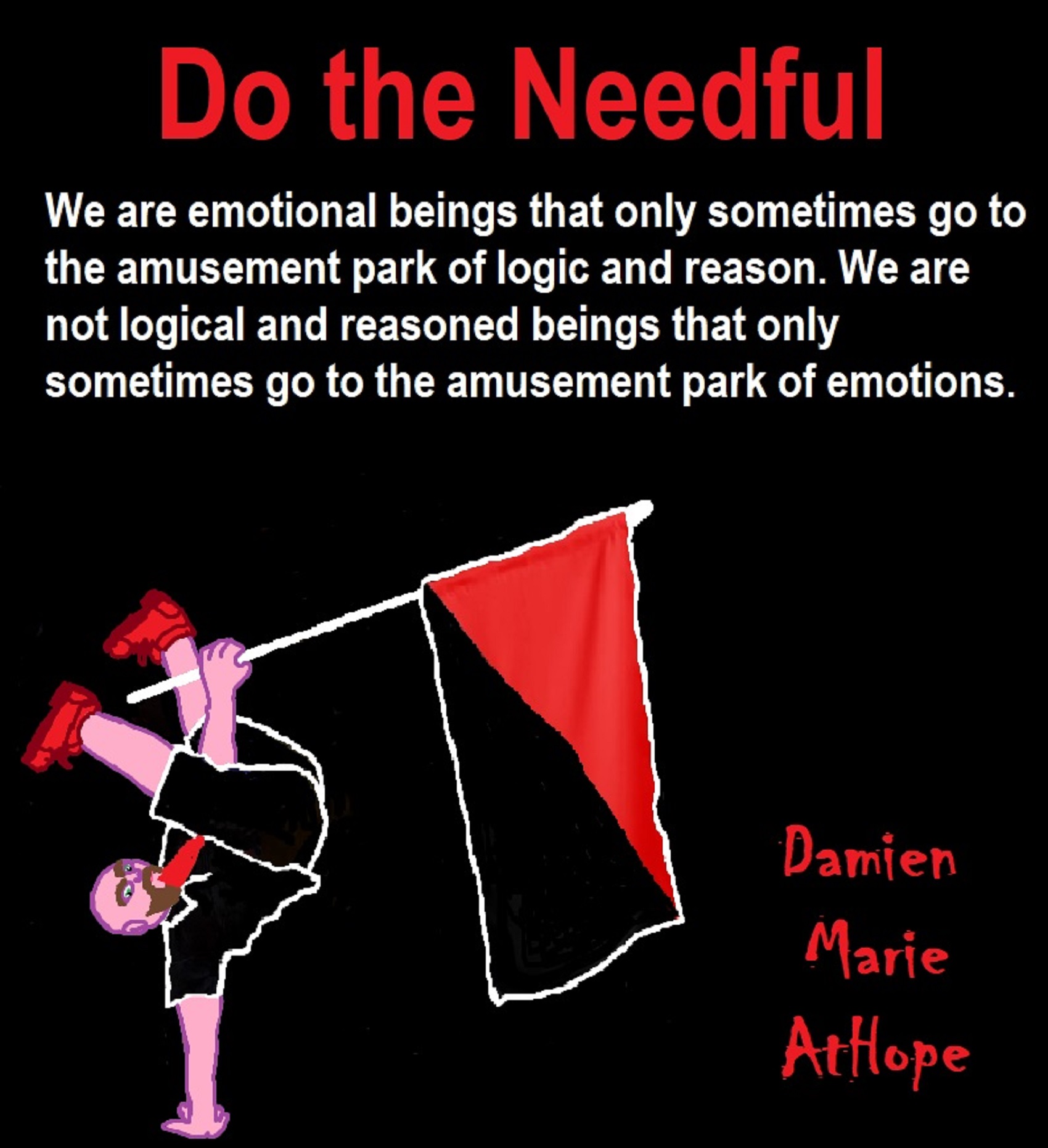

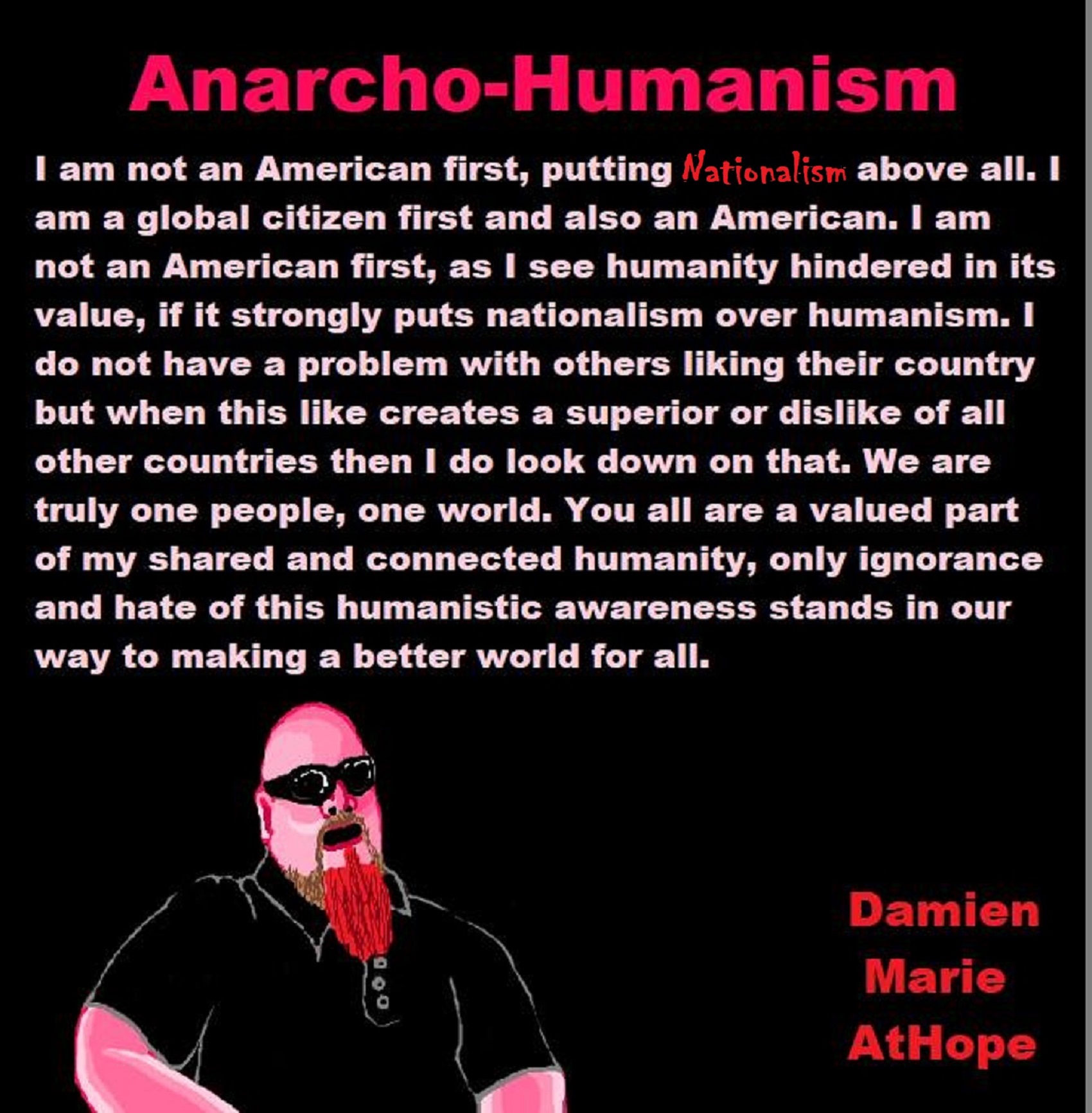
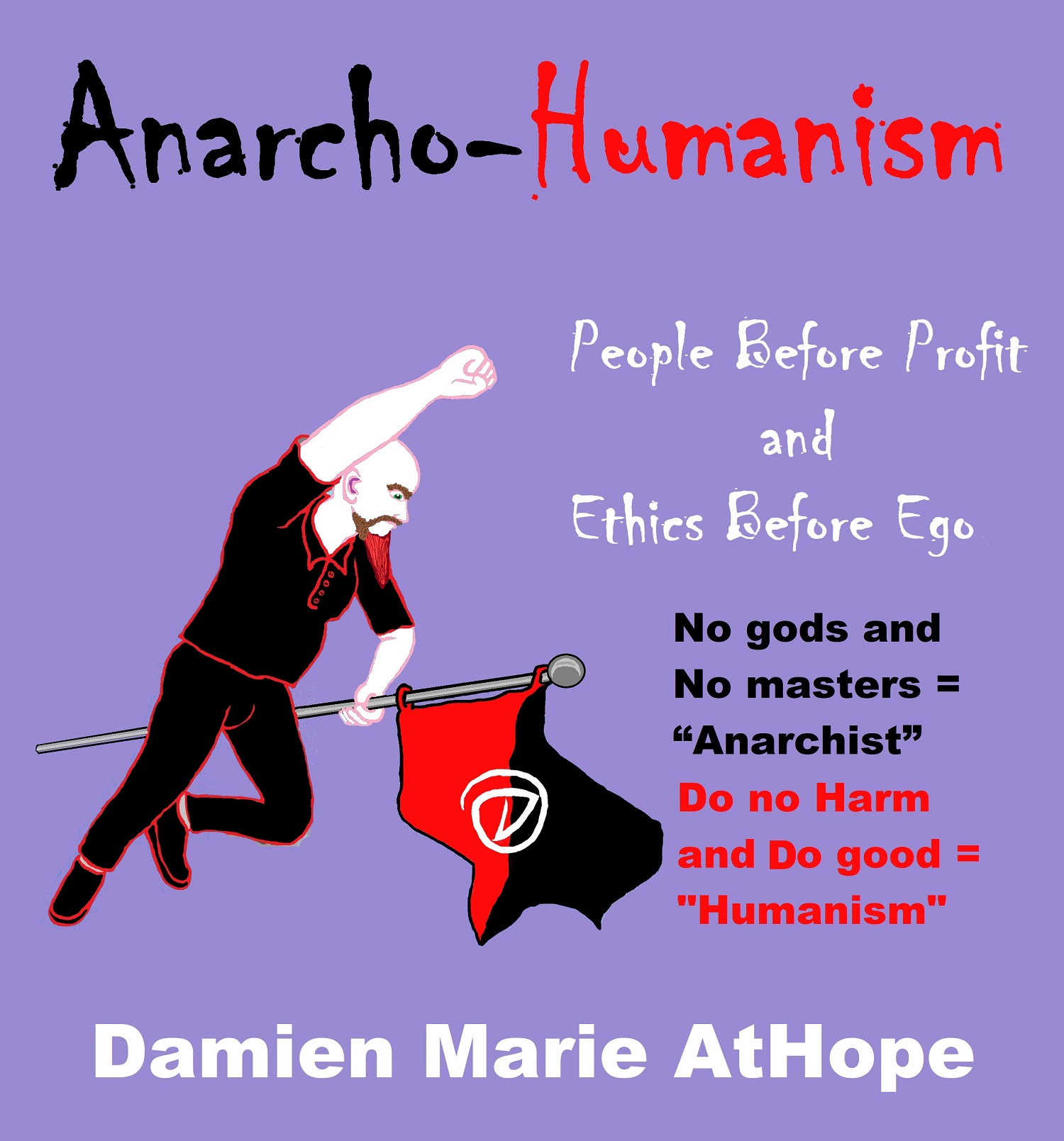
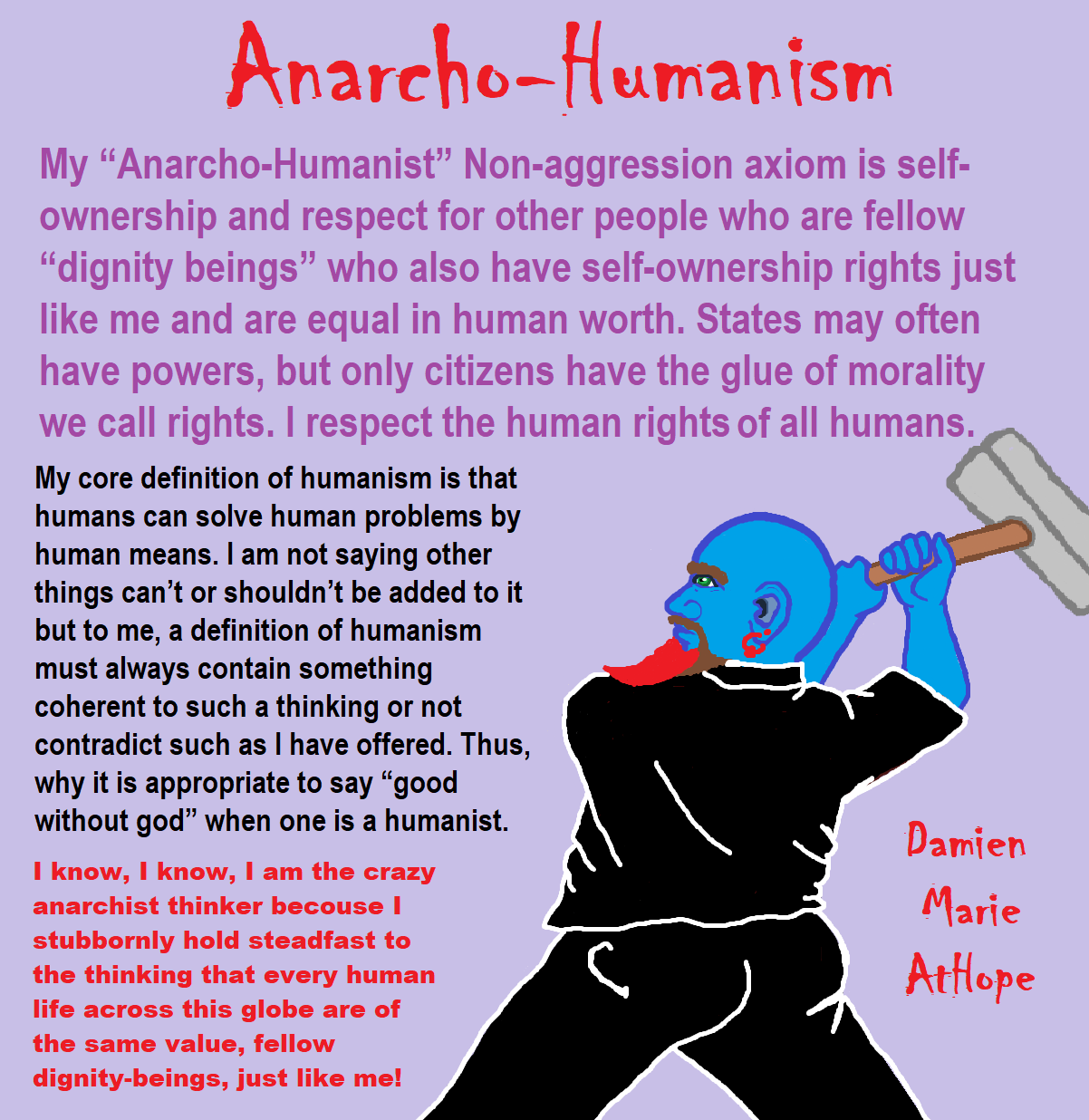

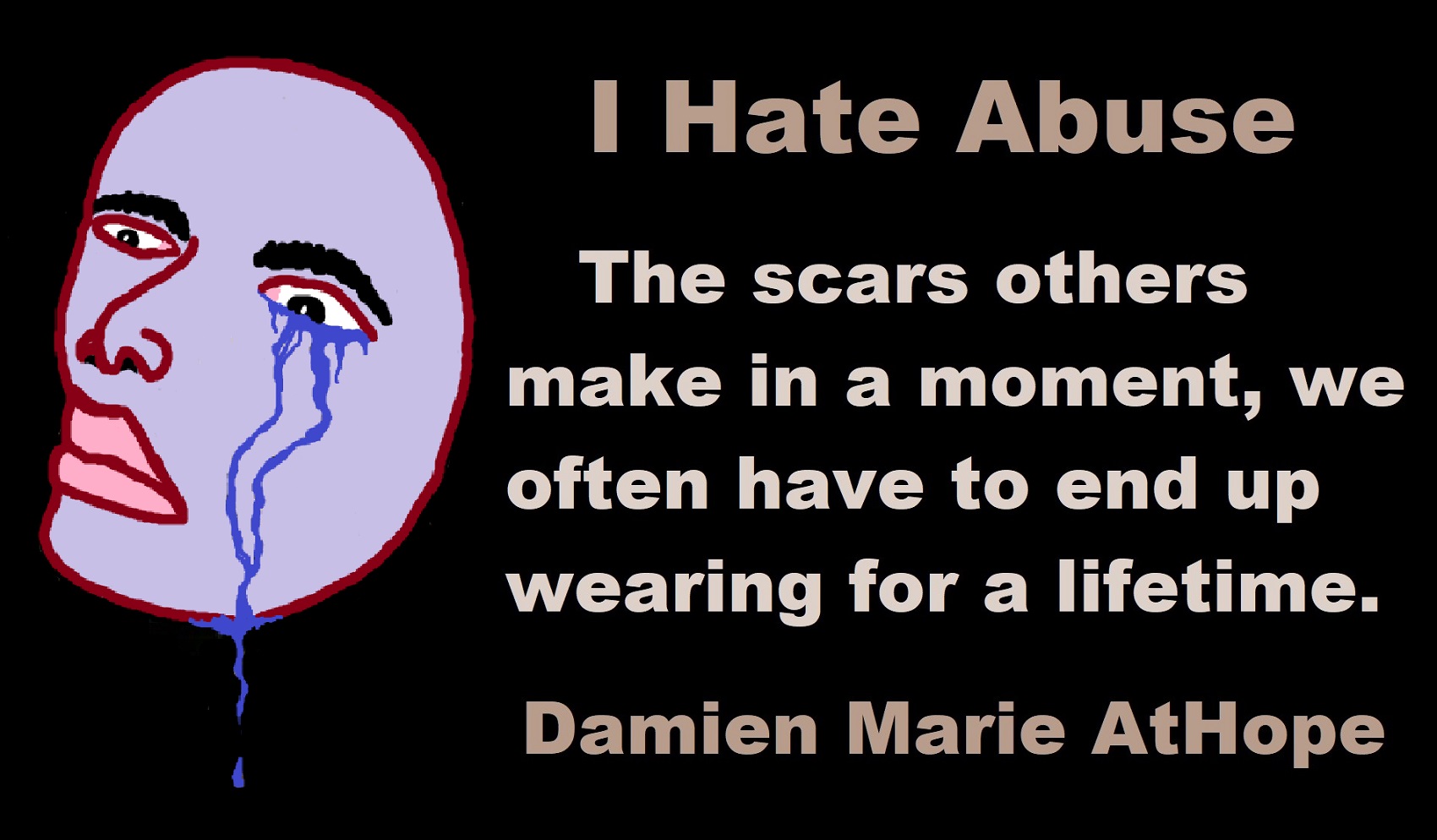
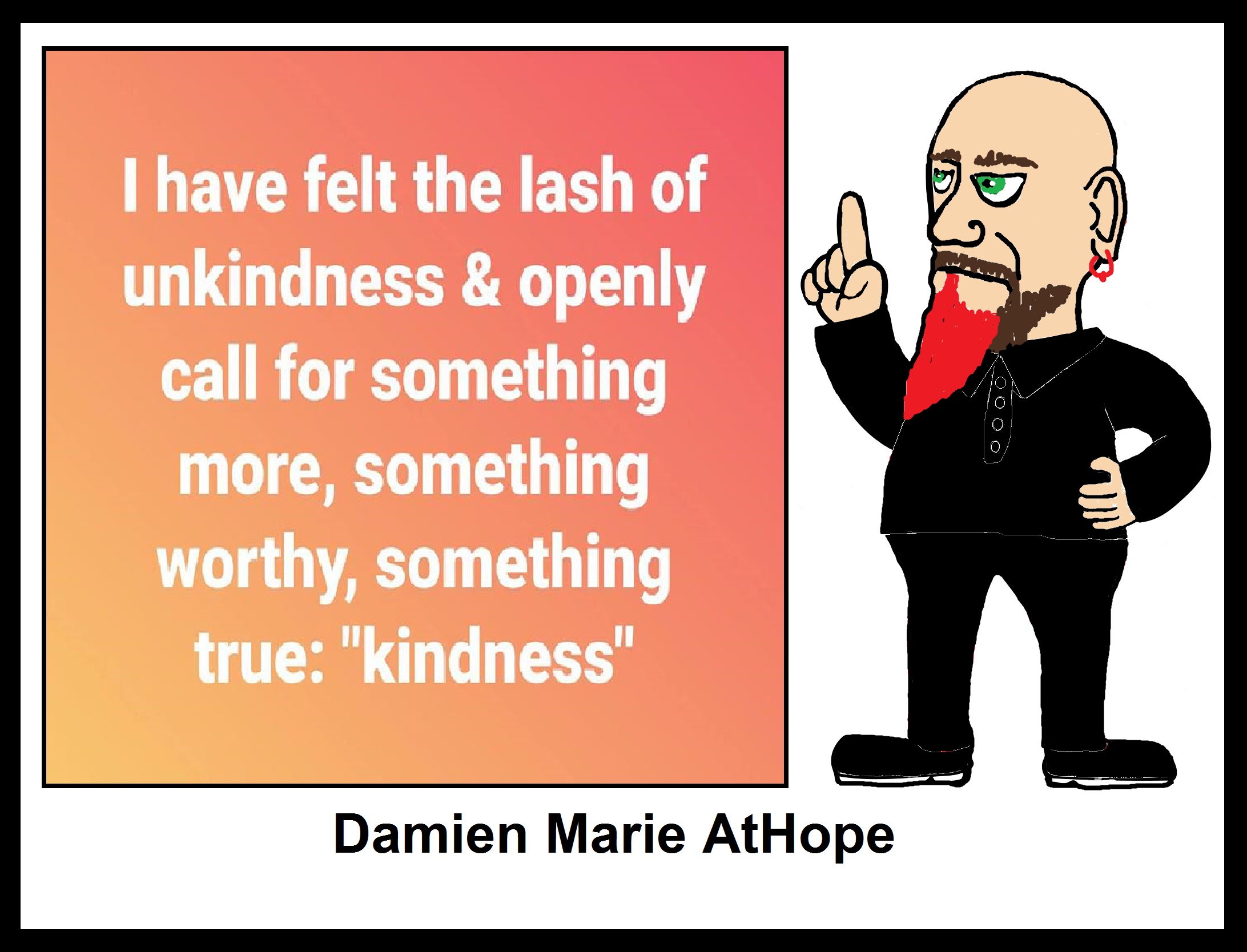
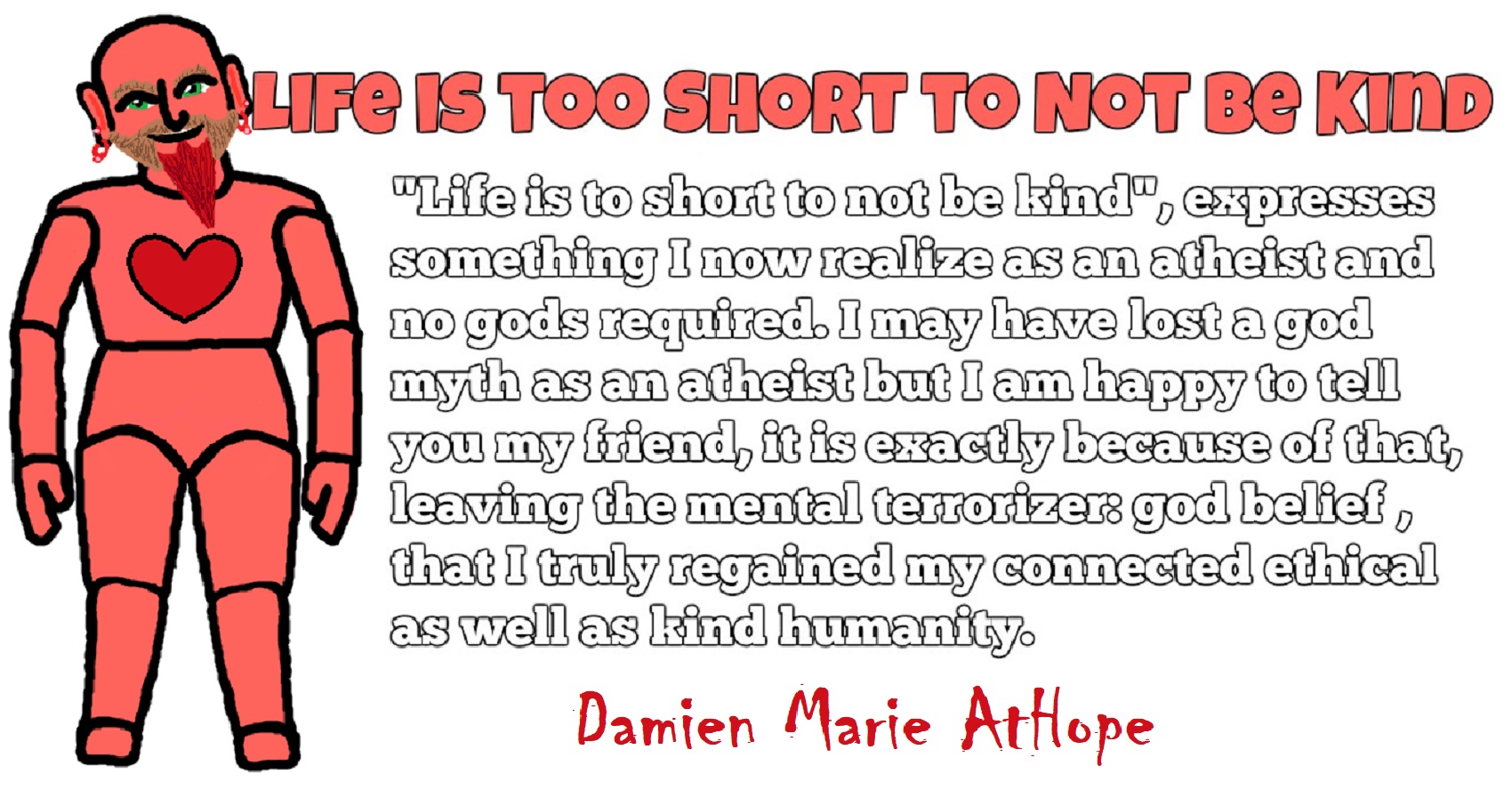
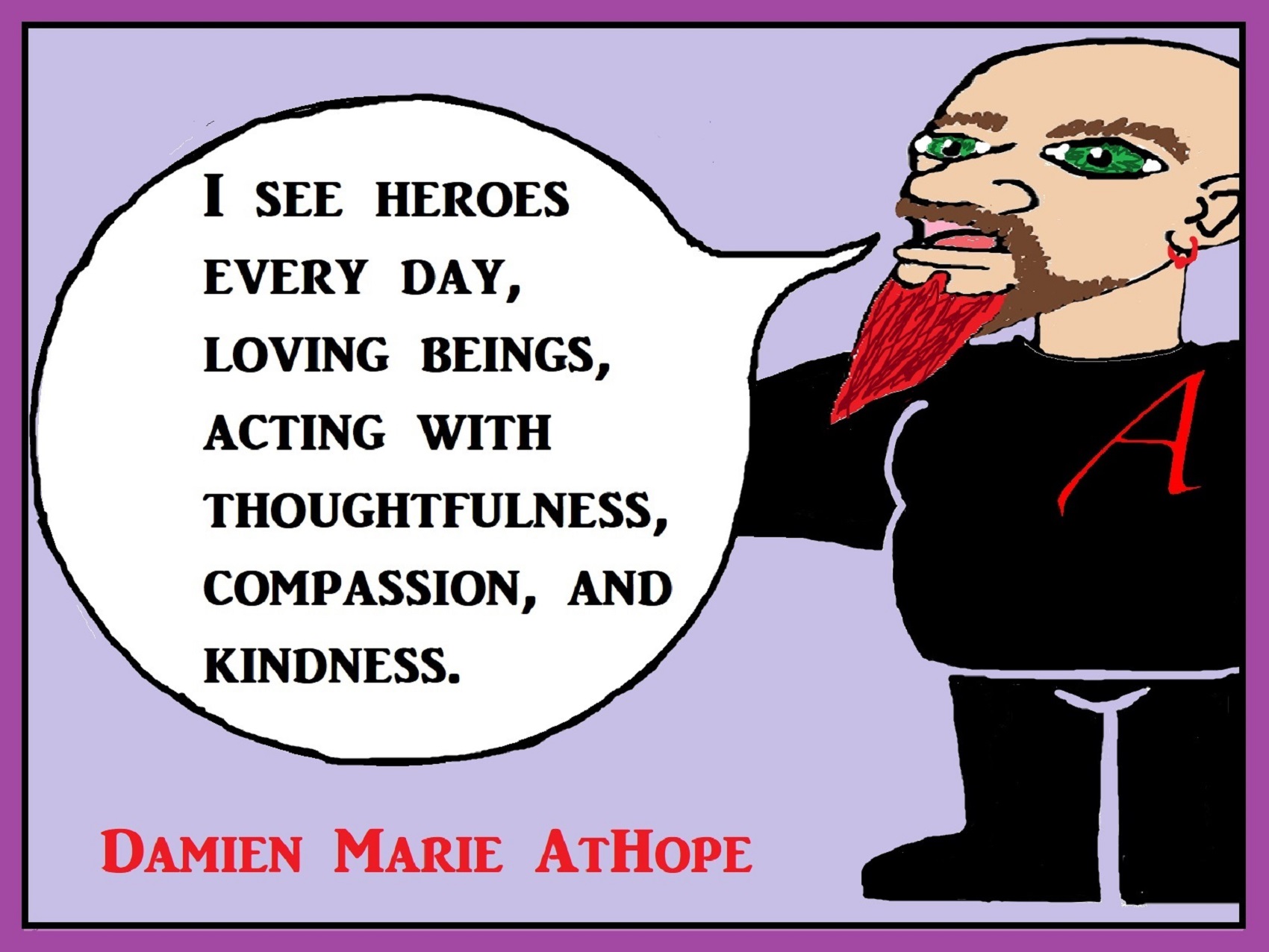

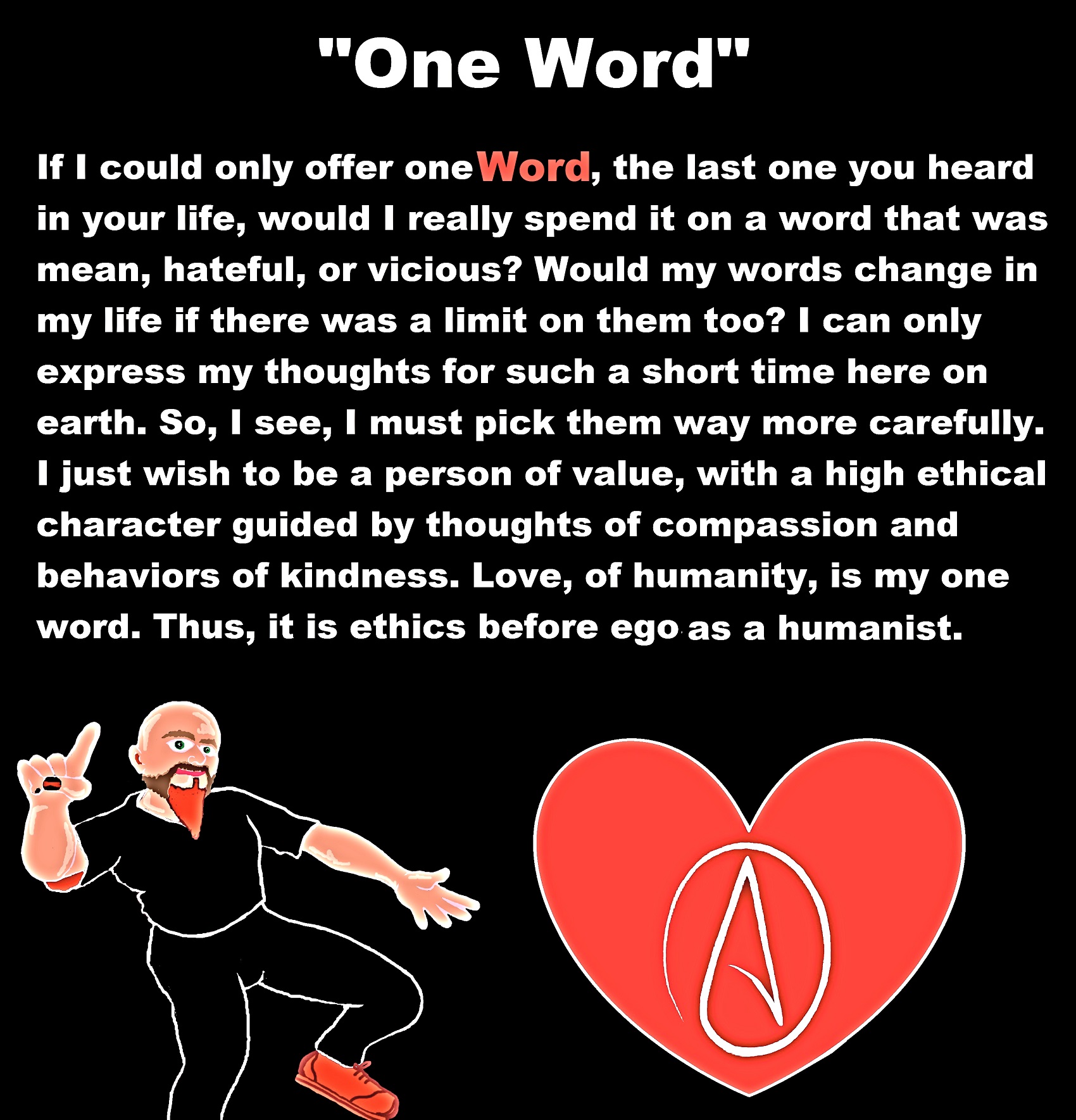
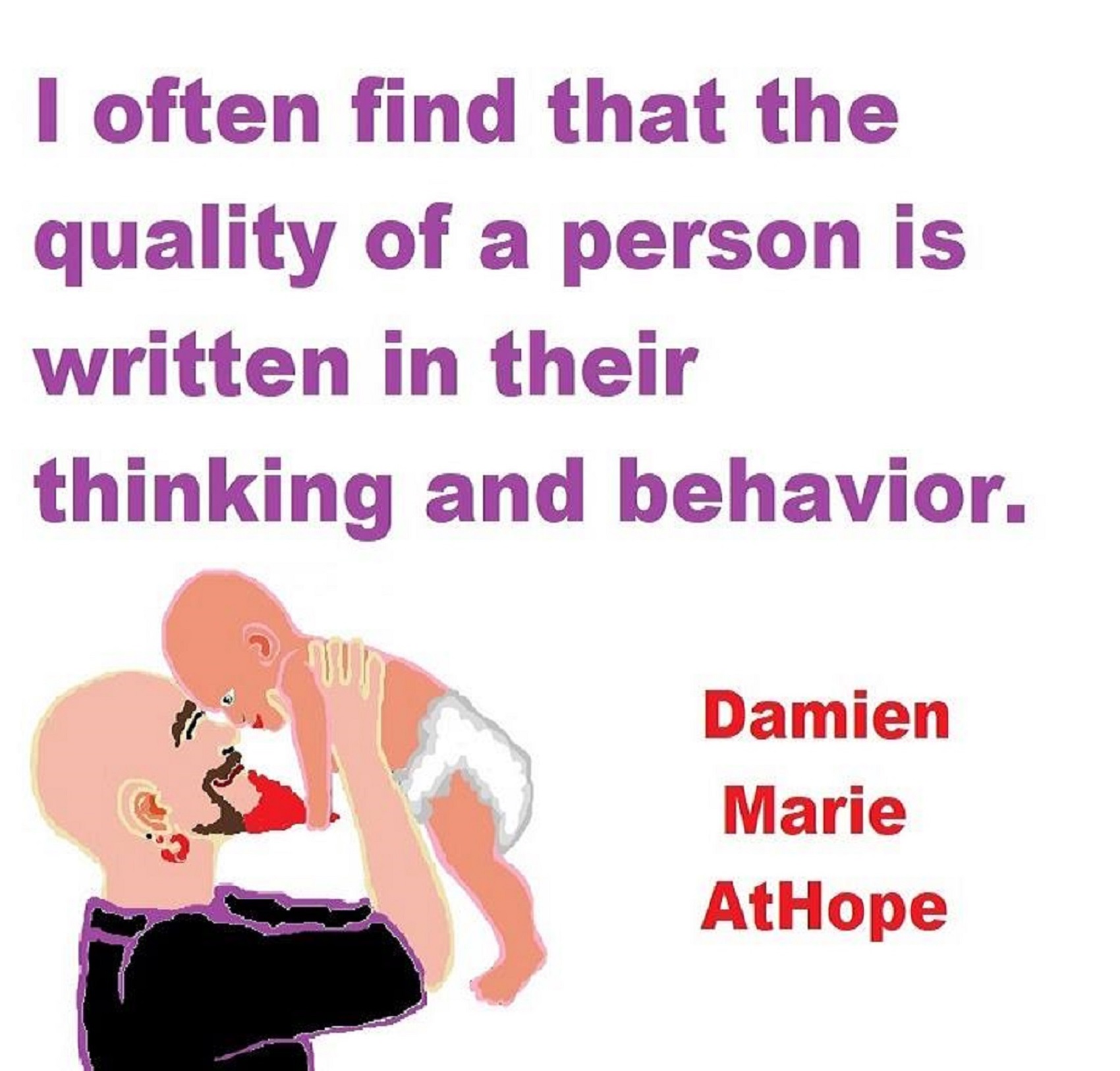

Debunking Austrian Economics 101
Here a basic division of modern Austrians would be as follows:
(1) The Anarcho-capitalists
E.g., Murray Rothbard, Hans-Hermann Hoppe and Jörg Guido Hülsmann;
(2) The minimal state/classical liberal Austrians in the tradition of Mises
This variety often supports praxeology and utilitarianism;
(3) Hayek’s economics, with a minimal state, and with an empirical (or Popperian) approach to economic method, in place of praxeology;
(4) Moderate subjectivist Austrians
E.g., Israel Kirzner and Roger Garrison;
(5) Radical subjectivists like Ludwig M. Lachmann (1906–1990), and Austrians influenced by him.
Self-ownership: Abortion, Genital Mutilation, Prostitution, Drugs, and the Right to Die
The Need for Consent and the value of Body Ownership: Healthy Sex Talk with Kids
Ethical Thinking or Moral Reasoning Should be Rational AND Emotional
Why care? Because we are Dignity Beings.
Taxonomy of Race? Construct or a biological reality?
Turning a Theist Attack into a Chance for Their New Learning: “an open dialog”
Muslim Terrorists and Christian Terrorists?
Atheism is Bad Because North Korea & Religion is Good Because Sikhism?
Liberal, Progressive, and Leftist
Individualism, Represents Self-Reliance and Hostility to a Connected Humanity
Non-statism Governance?
There is hardly anything a government can do that a non-government group of people equally funded cannot do under the same circumstances but under non-statism governance. There are even powerful Non-state actor (NSA) entities that participate or act in international relations today. They are organizations with sufficient power to influence and cause a change even though they do not belong to any established institution of a state. Such as Non-governmental organizations (NGOs)—typically considered a part of civil society. Or Multinational corporations (MNCs)—for-profit organizations that operate in multiple sovereign states. The proliferation of non-state actors in the post–Cold War era has been one of the factors leading to the Cobweb Paradigm in international politics. Under this paradigm, the traditional Westphalian nation-state experiences an erosion of power and sovereignty, and non-state actors are part of the cause. Facilitated by globalization, NSAs challenge nation-state borders and sovereignty claims. MNCs are not always sympathetic to national interests, but instead are loyal to the corporation’s interests. NSAs challenge the nation-state’s sovereignty over internal matters through advocacy for societal issues, e.g. human rights and the environment. Non-state actors can aid in opinion building in international affairs, such as the Human Rights Council. Formal international organizations may also rely on non-state actors, particularly NGOs in the form of implementing partners in the national context. An example is the contribution of COHRE (Centre on Housing Rights and Evictions), to the protection of land and property (HLP) rights in Kosovo by conceptualizing the Housing and Property Directorate (now Kosovo Property Agency) within the framework of the United Nations Interim Administration Mission in Kosovo. ref
Kindly do the Needful
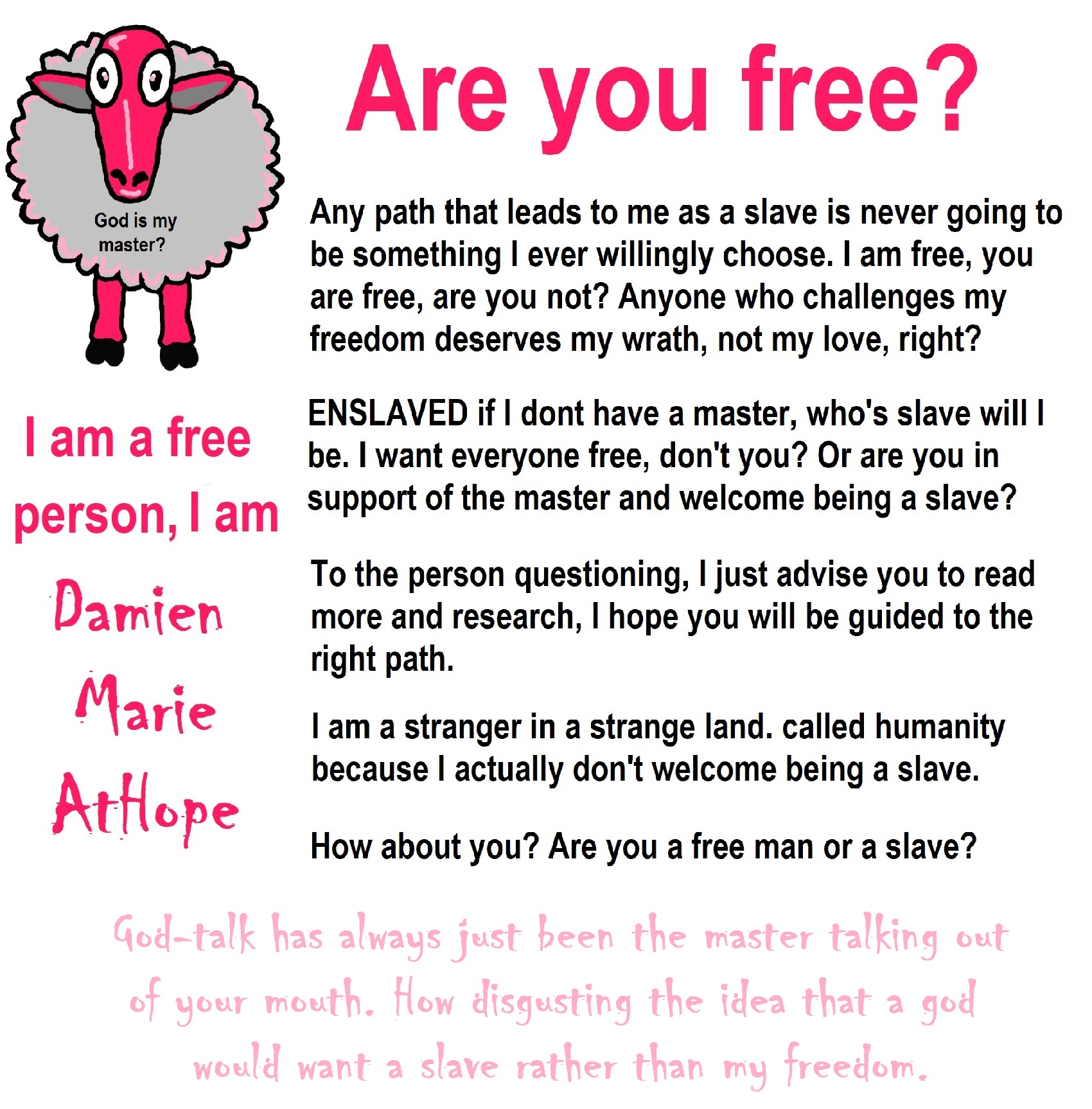
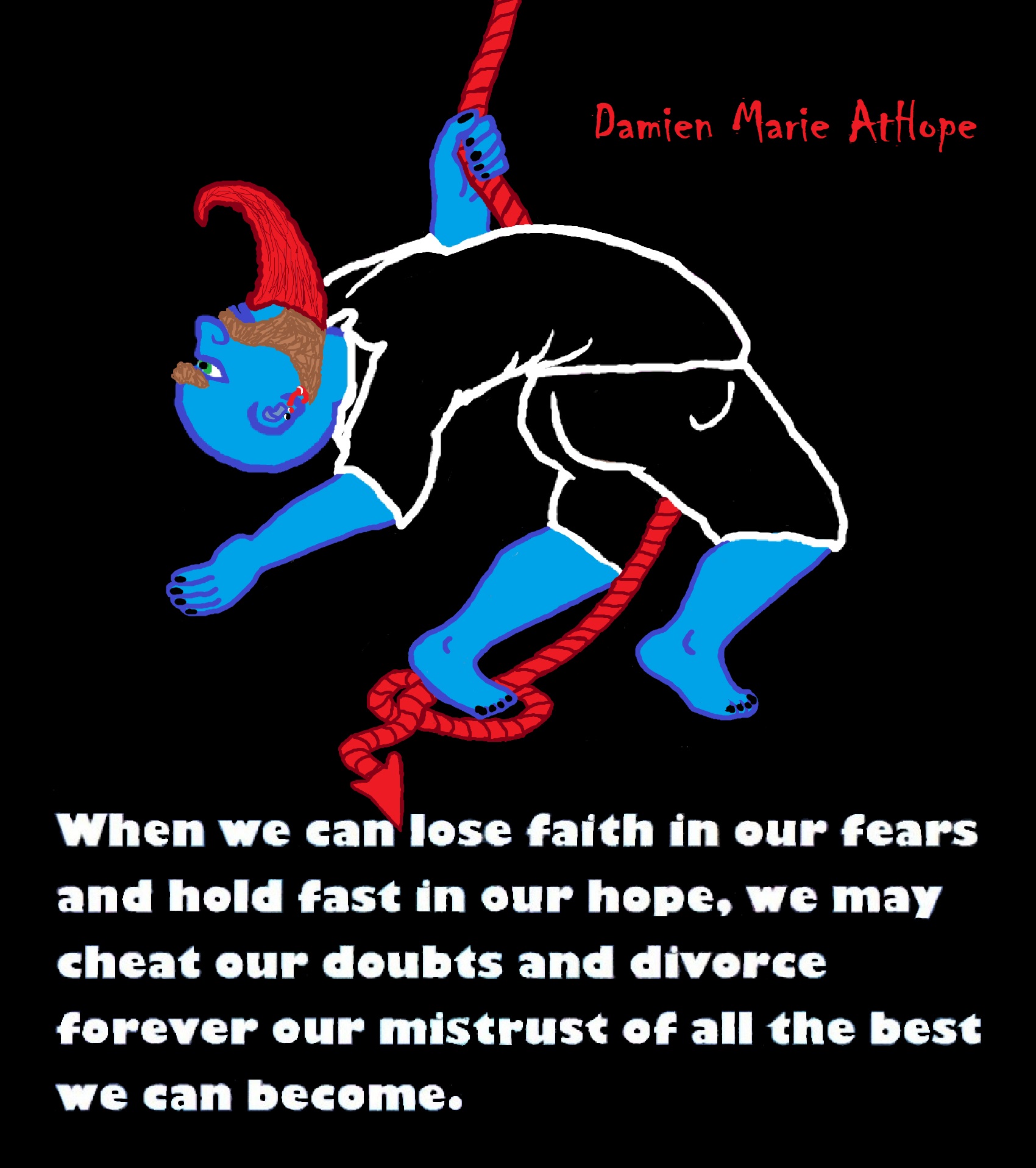
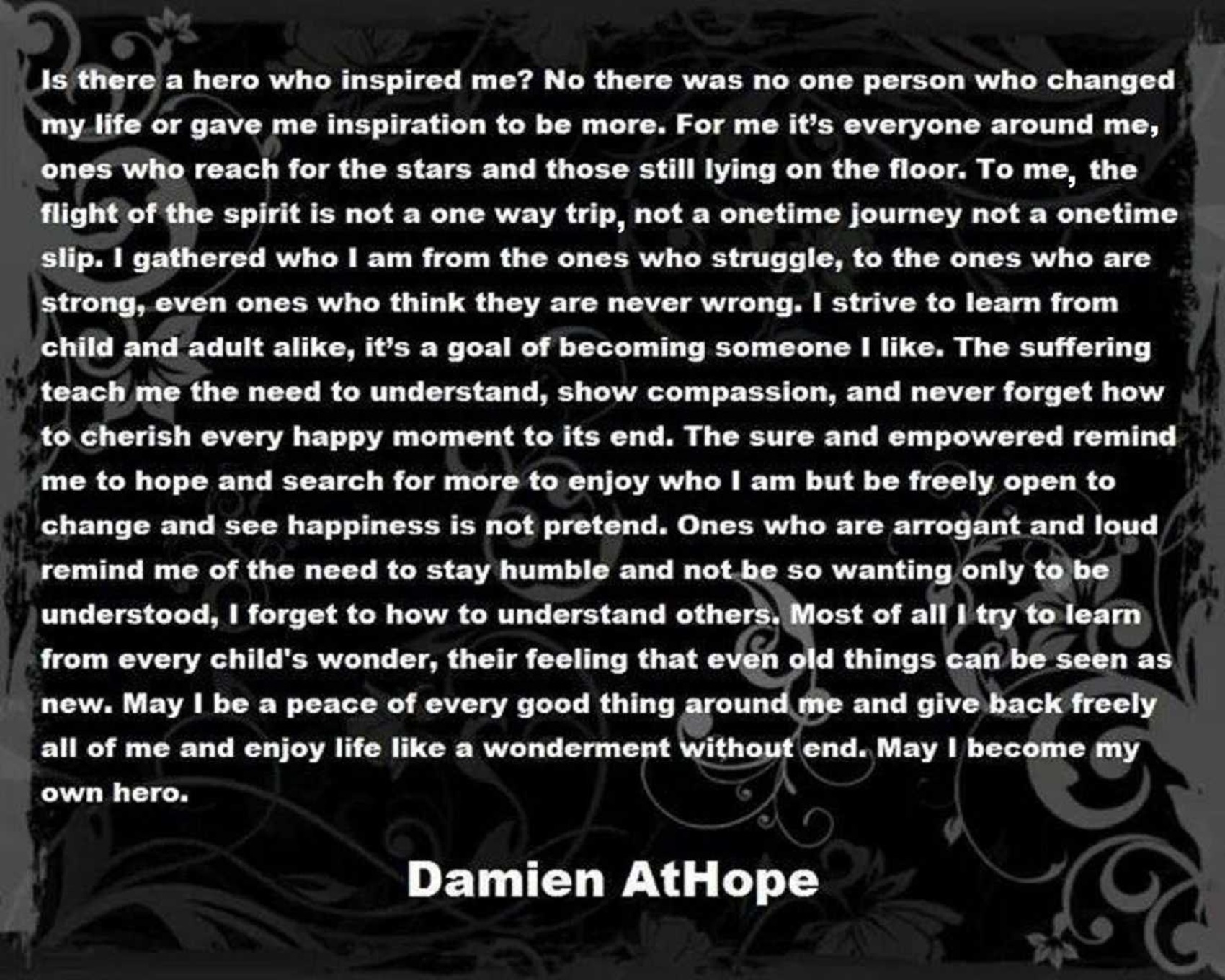

People don’t commonly teach religious history, even that of their own claimed religion. No, rather they teach a limited “pro their religion” history of their religion from a religious perspective favorable to the religion of choice.

Do you truly think “Religious Belief” is only a matter of some personal choice?
Do you not see how coercive one’s world of choice is limited to the obvious hereditary belief, in most religious choices available to the child of religious parents or caregivers? Religion is more commonly like a family, culture, society, etc. available belief that limits the belief choices of the child and that is when “Religious Belief” is not only a matter of some personal choice and when it becomes hereditary faith, not because of the quality of its alleged facts or proposed truths but because everyone else important to the child believes similarly so they do as well simply mimicking authority beliefs handed to them. Because children are raised in religion rather than being presented all possible choices but rather one limited dogmatic brand of “Religious Belief” where children only have a choice of following the belief as instructed, and then personally claim the faith hereditary belief seen in the confirming to the belief they have held themselves all their lives. This is obvious in statements asked and answered by children claiming a faith they barely understand but they do understand that their family believes “this or that” faith, so they feel obligated to believe it too. While I do agree that “Religious Belief” should only be a matter of some personal choice, it rarely is… End Hereditary Religion!

Animism: Respecting the Living World by Graham Harvey
“How have human cultures engaged with and thought about animals, plants, rocks, clouds, and other elements in their natural surroundings? Do animals and other natural objects have a spirit or soul? What is their relationship to humans? In this new study, Graham Harvey explores current and past animistic beliefs and practices of Native Americans, Maori, Aboriginal Australians, and eco-pagans. He considers the varieties of animism found in these cultures as well as their shared desire to live respectfully within larger natural communities. Drawing on his extensive casework, Harvey also considers the linguistic, performative, ecological, and activist implications of these different animisms.” ref

We are like believing machines we vacuum up ideas, like Velcro sticks to almost everything. We accumulate beliefs that we allow to negatively influence our lives, often without realizing it. Our willingness must be to alter skewed beliefs that impend our balance or reason, which allows us to achieve new positive thinking and accurate outcomes.

My thoughts on Religion Evolution with external links for more info:
- (Pre-Animism Africa mainly, but also Europe, and Asia at least 300,000 years ago), (Pre-Animism – Oxford Dictionaries)
- (Animism Africa around 100,000 years ago), (Animism – Britannica.com)
- (Totemism Europe around 50,000 years ago), (Totemism – Anthropology)
- (Shamanism Siberia around 30,000 years ago), (Shamanism – Britannica.com)
- (Paganism Turkey around 12,000 years ago), (Paganism – BBC Religion)
- (Progressed Organized Religion “Institutional Religion” Egypt around 5,000 years ago), (Ancient Egyptian Religion – Britannica.com)
- (CURRENT “World” RELIGIONS after 4,000 years ago) (Origin of Major Religions – Sacred Texts)
- (Early Atheistic Doubting at least by 2,600 years ago) (History of Atheism – Wikipedia)
“Religion is an Evolved Product” and Yes, Religion is Like Fear Given Wings…
Atheists talk about gods and religions for the same reason doctors talk about cancer, they are looking for a cure, or a firefighter talks about fires because they burn people and they care to stop them. We atheists too often feel a need to help the victims of mental slavery, held in the bondage that is the false beliefs of gods and the conspiracy theories of reality found in religions.
Understanding Religion Evolution:
- Pre-Animism (at least 300,000 years ago)
- Animism (Africa: 100,000 years ago)
- Totemism (Europe: 50,000 years ago)
- Shamanism (Siberia: 30,000 years ago)
- Paganism (Turkey: 12,000 years ago)
- Progressed organized religion (Egypt: 5,000 years ago), (Egypt, the First Dynasty 5,150 years ago)
- CURRENT “World” RELIGIONS (after 4,000 years ago)
- Early Atheistic Doubting (at least by 2,600 years ago)
“An Archaeological/Anthropological Understanding of Religion Evolution”
It seems ancient peoples had to survived amazing threats in a “dangerous universe (by superstition perceived as good and evil),” and human “immorality or imperfection of the soul” which was thought to affect the still living, leading to ancestor worship. This ancestor worship presumably led to the belief in supernatural beings, and then some of these were turned into the belief in gods. This feeble myth called gods were just a human conceived “made from nothing into something over and over, changing, again and again, taking on more as they evolve, all the while they are thought to be special,” but it is just supernatural animistic spirit-belief perceived as sacred.
Quick Evolution of Religion?
Pre-Animism (at least 300,000 years ago) pre-religion is a beginning that evolves into later Animism. So, Religion as we think of it, to me, all starts in a general way with Animism (Africa: 100,000 years ago) (theoretical belief in supernatural powers/spirits), then this is physically expressed in or with Totemism (Europe: 50,000 years ago) (theoretical belief in mythical relationship with powers/spirits through a totem item), which then enlists a full-time specific person to do this worship and believed interacting Shamanism (Siberia/Russia: 30,000 years ago) (theoretical belief in access and influence with spirits through ritual), and then there is the further employment of myths and gods added to all the above giving you Paganism (Turkey: 12,000 years ago) (often a lot more nature-based than most current top world religions, thus hinting to their close link to more ancient religious thinking it stems from). My hypothesis is expressed with an explanation of the building of a theatrical house (modern religions development). Progressed organized religion (Egypt: 5,000 years ago) with CURRENT “World” RELIGIONS (after 4,000 years ago).
Historically, in large city-state societies (such as Egypt or Iraq) starting around 5,000 years ago culminated to make religion something kind of new, a sociocultural-governmental-religious monarchy, where all or at least many of the people of such large city-state societies seem familiar with and committed to the existence of “religion” as the integrated life identity package of control dynamics with a fixed closed magical doctrine, but this juggernaut integrated religion identity package of Dogmatic-Propaganda certainly did not exist or if developed to an extent it was highly limited in most smaller prehistoric societies as they seem to lack most of the strong control dynamics with a fixed closed magical doctrine (magical beliefs could be at times be added or removed). Many people just want to see developed religious dynamics everywhere even if it is not. Instead, all that is found is largely fragments until the domestication of religion.
Religions, as we think of them today, are a new fad, even if they go back to around 6,000 years in the timeline of human existence, this amounts to almost nothing when seen in the long slow evolution of religion at least around 70,000 years ago with one of the oldest ritual worship. Stone Snake of South Africa: “first human worship” 70,000 years ago. This message of how religion and gods among them are clearly a man-made thing that was developed slowly as it was invented and then implemented peace by peace discrediting them all. Which seems to be a simple point some are just not grasping how devastating to any claims of truth when we can see the lie clearly in the archeological sites.
I wish people fought as hard for the actual values as they fight for the group/clan names political or otherwise they think support values. Every amount spent on war is theft to children in need of food or the homeless kept from shelter.
Here are several of my blog posts on history:
- To Find Truth You Must First Look
- (Magdalenian/Iberomaurusian) Connections to the First Paganists of the early Neolithic Near East Dating from around 17,000 to 12,000 Years Ago
- Natufians: an Ancient People at the Origins of Agriculture and Sedentary Life
- Possible Clan Leader/Special “MALE” Ancestor Totem Poles At Least 13,500 years ago?
- Jewish People with DNA at least 13,200 years old, Judaism, and the Origins of Some of its Ideas
- Baltic Reindeer Hunters: Swiderian, Lyngby, Ahrensburgian, and Krasnosillya cultures 12,020 to 11,020 years ago are evidence of powerful migratory waves during the last 13,000 years and a genetic link to Saami and the Finno-Ugric peoples.
- The Rise of Inequality: patriarchy and state hierarchy inequality
- Fertile Crescent 12,500 – 9,500 Years Ago: fertility and death cult belief system?
- 12,400 – 11,700 Years Ago – Kortik Tepe (Turkey) Pre/early-Agriculture Cultic Ritualism
- Ritualistic Bird Symbolism at Gobekli Tepe and its “Ancestor Cult”
- Male-Homosexual (female-like) / Trans-woman (female) Seated Figurine from Gobekli Tepe
- Could a 12,000-year-old Bull Geoglyph at Göbekli Tepe relate to older Bull and Female Art 25,000 years ago and Later Goddess and the Bull cults like Catal Huyuk?
- Sedentism and the Creation of goddesses around 12,000 years ago as well as male gods after 7,000 years ago.
- Alcohol, where Agriculture and Religion Become one? Such as Gobekli Tepe’s Ritualistic use of Grain as Food and Ritual Drink
- Neolithic Ritual Sites with T-Pillars and other Cultic Pillars
- Paganism: Goddesses around 12,000 years ago then Male Gods after 7,000 years ago
- First Patriarchy: Split of Women’s Status around 12,000 years ago & First Hierarchy: fall of Women’s Status around 5,000 years ago.
- Natufians: an Ancient People at the Origins of Agriculture and Sedentary Life
- J DNA and the Spread of Agricultural Religion (paganism)
- Paganism: an approximately 12,000-year-old belief system
- Paganism 12,000 years old: related to “Anarchism and Socialism” (Pre-Capitalism)
- Shaman burial in Israel 12,000 years ago and the Shamanism Phenomena
- Need to Mythicized: gods and goddesses
- 12,000 – 7,000 Years Ago – Paleo-Indian Culture (The Americas)
- 12,000 – 2,000 Years Ago – Indigenous-Scandinavians (Nordic)
- Norse did not wear helmets with horns?
- Pre-Pottery Neolithic Skull Cult around 11,500 to 8,400 Years Ago?
- 10,400 – 10,100 Years Ago, in Turkey the Nevail Cori Religious Settlement
- 9,000-6,500 Years Old Submerged Pre-Pottery/Pottery Neolithic Ritual Settlements off Israel’s Coast
- Catal Huyuk “first religious designed city” around 9,500 to 7,700 years ago (Turkey)
- Cultic Hunting at Catal Huyuk “first religious designed city”
- Special Items and Art as well as Special Elite Burials at Catal Huyuk
- New Rituals and Violence with the appearance of Pottery and People?
- Haplogroup N and its related Uralic Languages and Cultures
- Ainu people, Sámi people, Native Americans, the Ancient North Eurasians, and Paganistic-Shamanism with Totemism
- Ideas, Technology and People from Turkey, Europe, to China and Back again 9,000 to 5,000 years ago?
- First Pottery of Europe and the Related Cultures
- 9,000 years old Neolithic Artifacts Judean Desert and Hills Israel
- 9,000-7,000 years-old Sex and Death Rituals: Cult Sites in Israel, Jordan, and the Sinai
- 9,000-8500 year old Horned Female shaman Bad Dürrenberg Germany
- Neolithic Jewelry and the Spread of Farming in Europe Emerging out of West Turkey
- 8,600-year-old Tortoise Shells in Neolithic graves in central China have Early Writing and Shamanism
- Swing of the Mace: the rise of Elite, Forced Authority, and Inequality begin to Emerge 8,500 years ago?
- Migrations and Changing Europeans Beginning around 8,000 Years Ago
- My “Steppe-Anatolian-Kurgan hypothesis” 8,000/7,000 years ago
- Around 8,000-year-old Shared Idea of the Mistress of Animals, “Ritual” Motif
- Pre-Columbian Red-Paint (red ochre) Maritime Archaic Culture 8,000-3,000 years ago
- 7,522-6,522 years ago Linear Pottery culture which I think relates to Arcane Capitalism’s origins
- Arcane Capitalism: Primitive socialism, Primitive capital, Private ownership, Means of production, Market capitalism, Class discrimination, and Petite bourgeoisie (smaller capitalists)
- 7,500-4,750 years old Ritualistic Cucuteni-Trypillian culture of Moldova, Romania, and Ukraine
- Roots of a changing early society 7,200-6,700 years ago Jordan and Israel
- Agriculture religion (Paganism) with farming reached Britain between about 7,000 to 6,500 or so years ago and seemingly expressed in things like Western Europe’s Long Barrows
- My Thoughts on Possible Migrations of “R” DNA and Proto-Indo-European?
- “Millet” Spreading from China 7,022 years ago to Europe and related Language may have Spread with it leading to Proto-Indo-European
- Proto-Indo-European (PIE), ancestor of Indo-European languages: DNA, Society, Language, and Mythology
- The Dnieper–Donets culture and Asian varieties of Millet from China to the Black Sea region of Europe by 7,022 years ago
- Kurgan 6,000 years ago/dolmens 7,000 years ago: funeral, ritual, and other?
- 7,020 to 6,020-year-old Proto-Indo-European Homeland of Urheimat or proposed home of their Language and Religion
- Ancient Megaliths: Kurgan, Ziggurat, Pyramid, Menhir, Trilithon, Dolman, Kromlech, and Kromlech of Trilithons
- The Mytheme of Ancient North Eurasian Sacred-Dog belief and similar motifs are found in Indo-European, Native American, and Siberian comparative mythology
- Elite Power Accumulation: Ancient Trade, Tokens, Writing, Wealth, Merchants, and Priest-Kings
- Sacred Mounds, Mountains, Kurgans, and Pyramids may hold deep connections?
- Between 7,000-5,000 Years ago, rise of unequal hierarchy elite, leading to a “birth of the State” or worship of power, strong new sexism, oppression of non-elites, and the fall of Women’s equal status
- Paganism 7,000-5,000 years old: related to “Anarchism and Socialism” (Capitalism) (World War 0) Elite & their slaves
- Hell and Underworld mythologies starting maybe as far back as 7,000 to 5,000 years ago with the Proto-Indo-Europeans?
- The First Expression of the Male God around 7,000 years ago?
- White (light complexion skin) Bigotry and Sexism started 7,000 years ago?
- Around 7,000-year-old Shared Idea of the Divine Bird (Tutelary and/or Trickster spirit/deity), “Ritual” Motif
- Nekhbet an Ancient Egyptian Vulture Goddess and Tutelary Deity
- 6,720 to 4,920 years old Ritualistic Hongshan Culture of Inner Mongolia with 5,000-year-old Pyramid Mounds and Temples
- First proto-king in the Balkans, Varna culture around 6,500 years ago?
- 6,500–5,800 years ago in Israel Late Chalcolithic (Copper Age) Period in the Southern Levant Seems to Express Northern Levant Migrations, Cultural and Religious Transfer
- KING OF BEASTS: Master of Animals “Ritual” Motif, around 6,000 years old or older…
- Around 6000-year-old Shared Idea of the Solid Wheel & the Spoked Wheel-Shaped Ritual Motif
- “The Ghassulian Star,” a mysterious 6,000-year-old mural from Jordan; a Proto-Star of Ishtar, Star of Inanna or Star of Venus?
- Religious/Ritual Ideas, including goddesses and gods as well as ritual mounds or pyramids from Northeastern Asia at least 6,000 years old, seemingly filtering to Iran, Iraq, the Mediterranean, Europe, Egypt, and the Americas?
- Maykop (5,720–5,020 years ago) Caucasus region Bronze Age culture-related to Copper Age farmers from the south, influenced by the Ubaid period and Leyla-Tepe culture, as well as influencing the Kura-Araxes culture
- 5-600-year-old Tomb, Mummy, and First Bearded Male Figurine in a Grave
- Kura-Araxes Cultural 5,520 to 4,470 years old DNA traces to the Canaanites, Arabs, and Jews
- Minoan/Cretan (Keftiu) Civilization and Religion around 5,520 to 3,120 years ago
- Evolution Of Science at least by 5,500 years ago
- 5,500 Years old birth of the State, the rise of Hierarchy, and the fall of Women’s status
- “Jiroft culture” 5,100 – 4,200 years ago and the History of Iran
- Stonehenge: Paganistic Burial and Astrological Ritual Complex, England (5,100-3,600 years ago)
- Around 5,000-year-old Shared Idea of the “Tree of Life” Ritual Motif
- Complex rituals for elite, seen from China to Egypt, at least by 5,000 years ago
- Around 5,000 years ago: “Birth of the State” where Religion gets Military Power and Influence
- The Center of the World “Axis Mundi” and/or “Sacred Mountains” Mythology Could Relate to the Altai Mountains, Heart of the Steppe
- Progressed organized religion starts, an approximately 5,000-year-old belief system
- China’s Civilization between 5,000-3,000 years ago, was a time of war and class struggle, violent transition from free clans to a Slave or Elite society
- Origin of Logics is Naturalistic Observation at least by around 5,000 years ago.
- Paganism 5,000 years old: progressed organized religion and the state: related to “Anarchism and Socialism” (Kings and the Rise of the State)
- Ziggurats (multi-platform temples: 4,900 years old) to Pyramids (multi-platform tombs: 4,700 years old)
- Did a 4,520–4,420-year-old Volcano In Turkey Inspire the Bible God?
- Finland’s Horned Shaman and Pre-Horned-God at least 4,500 years ago?
- 4,000-year-Old Dolmens in Israel: A Connected Dolmen Religious Phenomenon?
- Creation myths: From chaos, Ex nihilo, Earth-diver, Emergence, World egg, and World parent
- Bronze Age “Ritual” connections of the Bell Beaker culture with the Corded Ware/Single Grave culture, which were related to the Yamnaya culture and Proto-Indo-European Languages/Religions
- Low Gods (Earth/ Tutelary deity), High Gods (Sky/Supreme deity), and Moralistic Gods (Deity enforcement/divine order)
- The exchange of people, ideas, and material-culture including, to me, the new god (Sky Father) and goddess (Earth Mother) religion between the Cucuteni-Trypillians and others which is then spread far and wide
- Koryaks: Indigenous People of the Russian Far East and Big Raven myths also found in Tlingit, Haida, Tsimshian, and other Indigenous People of North America
- 42 Principles Of Maat (Egyptian Goddess of the justice) around 4,400 years ago, 2000 Years Before Ten Commandments
- “Happy Easter” Well Happy Eostre/Ishter
- 4,320-3,820 years old “Shimao” (North China) site with Totemistic-Shamanistic Paganism and a Stepped Pyramid
- 4,250 to 3,400 Year old Stonehenge from Russia: Arkaim?
- 4,100-year-old beaker with medicinal & flowering plants in a grave of a woman in Scotland
- Early European Farmer ancestry, Kelif el Boroud people with the Cardial Ware culture, and the Bell Beaker culture Paganists too, spread into North Africa, then to the Canary Islands off West Africa
- Flood Accounts: Gilgamesh epic (4,100 years ago) Noah in Genesis (2,600 years ago)
- Paganism 4,000 years old: related to “Anarchism and Socialism” (First Moralistic gods, then the Origin time of Monotheism)
- When was the beginning: TIMELINE OF CURRENT RELIGIONS, which start around 4,000 years ago.
- Early Religions Thought to Express Proto-Monotheistic Systems around 4,000 years ago
- Kultepe? An archaeological site with a 4,000 years old women’s rights document.
- Single God Religions (Monotheism) = “Man-o-theism” started around 4,000 years ago with the Great Sky Spirit/God Tiān (天)?
- Confucianism’s Tiān (Shangdi god 4,000 years old): Supernaturalism, Pantheism or Theism?
- Yes, Your Male God is Ridiculous
- Mythology, a Lunar Deity is a Goddess or God of the Moon
- Sacred Land, Hills, and Mountains: Sami Mythology (Paganistic Shamanism)
- Horse Worship/Sacrifice: mythical union of Ruling Elite/Kingship and the Horse
- The Amorite/Amurru people’s God Amurru “Lord of the Steppe”, relates to the Origins of the Bible God?
- Bronze Age Exotic Trade Routes Spread Quite Far as well as Spread Religious Ideas with Them
- Sami and the Northern Indigenous Peoples Landscape, Language, and its Connection to Religion
- Prototype of Ancient Analemmatic Sundials around 3,900-3,150 years ago and a Possible Solar Connection to gods?
- Judaism is around 3,450 or 3,250 years old. (“Paleo-Hebrew” 3,000 years ago and Torah 2,500 years ago)
- The Weakening of Ancient Trade and the Strengthening of Religions around 3000 years ago?
- Are you aware that there are religions that worship women gods, explain now religion tears women down?
- Animistic, Totemistic, and Paganistic Superstition Origins of bible god and the bible’s Religion.
- Myths and Folklore: “Trickster gods and goddesses”
- Jews, Judaism, and the Origins of Some of its Ideas
- An Old Branch of Religion Still Giving Fruit: Sacred Trees
- Dating the BIBLE: naming names and telling times (written less than 3,000 years ago, provable to 2,200 years ago)
- Did a Volcano Inspire the bible god?
- Dené–Yeniseian language, Old Copper Complex, and Pre-Columbian Mound Builders?
- No “dinosaurs and humans didn’t exist together just because some think they are in the bible itself”
- Sacred Shit and Sacred Animals?
- Everyone Killed in the Bible Flood? “Nephilim” (giants)?
- Hey, Damien dude, I have a question for you regarding “the bible” Exodus.
- Archaeology Disproves the Bible
- Bible Battle, Just More, Bible Babble
- The Jericho Conquest lie?
- Canaanites and Israelites?
- Accurate Account on how did Christianity Began?
- Let’s talk about Christianity.
- So the 10 commandments isn’t anything to go by either right?
- Misinformed christian
- Debunking Jesus?
- Paulism vs Jesus
- Ok, you seem confused so let’s talk about Buddhism.
- Unacknowledged Buddhism: Gods, Savior, Demons, Rebirth, Heavens, Hells, and Terrorism
- His Foolishness The Dalai Lama
- Yin and Yang is sexist with an ORIGIN around 2,300 years ago?
- I Believe Archaeology, not Myths & Why Not, as the Religious Myths Already Violate Reason!
- Archaeological, Scientific, & Philosophic evidence shows the god myth is man-made nonsense.
- Aquatic Ape Theory/Hypothesis? As Always, Just Pseudoscience.
- Ancient Aliens Conspiracy Theorists are Pseudohistorians
- The Pseudohistoric and Pseudoscientific claims about “Bakoni Ruins” of South Africa
- Why do people think Religion is much more than supernaturalism and superstitionism?
- Religion is an Evolved Product
- Was the Value of Ancient Women Different?
- 1000 to 1100 CE, human sacrifice Cahokia Mounds a pre-Columbian Native American site
- Feminist atheists as far back as the 1800s?
- Promoting Religion as Real is Mentally Harmful to a Flourishing Humanity
- Screw All Religions and Their Toxic lies, they are all fraud
- Forget Religions’ Unfounded Myths, I Have Substantiated “Archaeology Facts.”
- Religion Dispersal throughout the World
- I Hate Religion Just as I Hate all Pseudoscience
- Exposing Scientology, Eckankar, Wicca and Other Nonsense?
- Main deity or religious belief systems
- Quit Trying to Invent Your God From the Scraps of Science.
- Archaeological, Scientific, & Philosophic evidence shows the god myth is man-made nonsense.
- Ancient Alien Conspiracy Theorists: Misunderstanding, Rhetoric, Misinformation, Fabrications, and Lies
- Misinformation, Distortion, and Pseudoscience in Talking with a Christian Creationist
- Judging the Lack of Goodness in Gods, Even the Norse God Odin
- Challenging the Belief in God-like Aliens and Gods in General
- A Challenge to Christian use of Torture Devices?
- Yes, Hinduism is a Religion
- Trump is One of the Most Reactionary Forces of Far-right Christian Extremism
- Was the Bull Head a Symbol of God? Yes!
- Primate Death Rituals
- Christian – “God and Christianity are objectively true”
- Australopithecus afarensis Death Ritual?
- You Claim Global Warming is a Hoax?
- Doubter of Science and Defamer of Atheists?
- I think that sounds like the Bible?
- History of the Antifa (“anti-fascist”) Movements
- Indianapolis Anti-Blasphemy Laws #Free Soheil Rally
- Damien, you repeat the golden rule in so many forms then you say religion is dogmatic?
- Science is a Trustable Methodology whereas Faith is not Trustable at all!
- Was I ever a believer, before I was an atheist?
- Atheists rise in reason
- Mistrust of science?
- Open to Talking About the Definition of ‘God’? But first, we address Faith.
- ‘United Monarchy’ full of splendor and power – Saul, David, and Solomon? Most likely not.
- Is there EXODUS ARCHAEOLOGY? The short answer is “no.”
- Lacking Proof of Bigfoots, Unicorns, and Gods is Just a Lack of Research?
- Religion and Politics: Faith Beliefs vs. Rational Thinking
- Hammer of Truth that lying pig RELIGION: challenged by an archaeologist
- “The Hammer of Truth” -ontology question- What do You Mean by That?
- Navigation of a bad argument: Ad Hominem vs. Attack
- Why is it Often Claimed that Gods have a Gender?
- Why are basically all monotheistic religions ones that have a male god?
- Shifting through the Claims in support of Faith
- Dear Mr. AtHope, The 20th Century is an Indictment of Secularism and a Failed Atheist Century
- An Understanding of the Worldwide Statistics and Dynamics of Terrorist Incidents and Suicide Attacks
- Intoxication and Evolution? Addressing and Assessing the “Stoned Ape” or “Drunken Monkey” Theories as Catalysts in Human Evolution
- Sacred Menstrual cloth? Inanna’s knot, Isis knot, and maybe Ma’at’s feather?
- Damien, why don’t the Hebrews accept the bible stories?
- Dealing with a Troll and Arguing Over Word Meaning
- Knowledge without Belief? Justified beliefs or disbeliefs worthy of Knowledge?
- Afrocentrism and African Religions
- Crecganford @crecganford offers history & stories of the people, places, gods, & culture
- Empiricism-Denier?
I am not an academic. I am a revolutionary that teaches in public, in places like social media, and in the streets. I am not a leader by some title given but from my commanding leadership style of simply to start teaching everywhere to everyone, all manner of positive education.

ref, ref, ref, ref, ref, ref, ref, ref, ref, ref, ref, ref, ref, ref, ref, ref, ref, ref, ref, ref, ref
Low Gods “Earth” or Tutelary deity and High Gods “Sky” or Supreme deity
“An Earth goddess is a deification of the Earth. Earth goddesses are often associated with the “chthonic” deities of the underworld. Ki and Ninhursag are Mesopotamian earth goddesses. In Greek mythology, the Earth is personified as Gaia, corresponding to Roman Terra, Indic Prithvi/Bhūmi, etc. traced to an “Earth Mother” complementary to the “Sky Father” in Proto-Indo-European religion. Egyptian mythology exceptionally has a sky goddess and an Earth god.” ref
“A mother goddess is a goddess who represents or is a personification of nature, motherhood, fertility, creation, destruction or who embodies the bounty of the Earth. When equated with the Earth or the natural world, such goddesses are sometimes referred to as Mother Earth or as the Earth Mother. In some religious traditions or movements, Heavenly Mother (also referred to as Mother in Heaven or Sky Mother) is the wife or feminine counterpart of the Sky father or God the Father.” ref
“Any masculine sky god is often also king of the gods, taking the position of patriarch within a pantheon. Such king gods are collectively categorized as “sky father” deities, with a polarity between sky and earth often being expressed by pairing a “sky father” god with an “earth mother” goddess (pairings of a sky mother with an earth father are less frequent). A main sky goddess is often the queen of the gods and may be an air/sky goddess in her own right, though she usually has other functions as well with “sky” not being her main. In antiquity, several sky goddesses in ancient Egypt, Mesopotamia, and the Near East were called Queen of Heaven. Neopagans often apply it with impunity to sky goddesses from other regions who were never associated with the term historically. The sky often has important religious significance. Many religions, both polytheistic and monotheistic, have deities associated with the sky.” ref
“In comparative mythology, sky father is a term for a recurring concept in polytheistic religions of a sky god who is addressed as a “father”, often the father of a pantheon and is often either a reigning or former King of the Gods. The concept of “sky father” may also be taken to include Sun gods with similar characteristics, such as Ra. The concept is complementary to an “earth mother“. “Sky Father” is a direct translation of the Vedic Dyaus Pita, etymologically descended from the same Proto-Indo-European deity name as the Greek Zeûs Pater and Roman Jupiter and Germanic Týr, Tir or Tiwaz, all of which are reflexes of the same Proto-Indo-European deity’s name, *Dyēus Ph₂tḗr. While there are numerous parallels adduced from outside of Indo-European mythology, there are exceptions (e.g. In Egyptian mythology, Nut is the sky mother and Geb is the earth father).” ref
Tutelary deity
“A tutelary (also tutelar) is a deity or spirit who is a guardian, patron, or protector of a particular place, geographic feature, person, lineage, nation, culture, or occupation. The etymology of “tutelary” expresses the concept of safety and thus of guardianship. In late Greek and Roman religion, one type of tutelary deity, the genius, functions as the personal deity or daimon of an individual from birth to death. Another form of personal tutelary spirit is the familiar spirit of European folklore.” ref
“A tutelary (also tutelar) in Korean shamanism, jangseung and sotdae were placed at the edge of villages to frighten off demons. They were also worshiped as deities. Seonangshin is the patron deity of the village in Korean tradition and was believed to embody the Seonangdang. In Philippine animism, Diwata or Lambana are deities or spirits that inhabit sacred places like mountains and mounds and serve as guardians. Such as: Maria Makiling is the deity who guards Mt. Makiling and Maria Cacao and Maria Sinukuan. In Shinto, the spirits, or kami, which give life to human bodies come from nature and return to it after death. Ancestors are therefore themselves tutelaries to be worshiped. And similarly, Native American beliefs such as Tonás, tutelary animal spirit among the Zapotec and Totems, familial or clan spirits among the Ojibwe, can be animals.” ref
“A tutelary (also tutelar) in Austronesian beliefs such as: Atua (gods and spirits of the Polynesian peoples such as the Māori or the Hawaiians), Hanitu (Bunun of Taiwan‘s term for spirit), Hyang (Kawi, Sundanese, Javanese, and Balinese Supreme Being, in ancient Java and Bali mythology and this spiritual entity, can be either divine or ancestral), Kaitiaki (New Zealand Māori term used for the concept of guardianship, for the sky, the sea, and the land), Kawas (mythology) (divided into 6 groups: gods, ancestors, souls of the living, spirits of living things, spirits of lifeless objects, and ghosts), Tiki (Māori mythology, Tiki is the first man created by either Tūmatauenga or Tāne and represents deified ancestors found in most Polynesian cultures). ” ref, ref, ref, ref, ref, ref, ref
Mesopotamian Tutelary Deities can be seen as ones related to City-States
“Historical city-states included Sumerian cities such as Uruk and Ur; Ancient Egyptian city-states, such as Thebes and Memphis; the Phoenician cities (such as Tyre and Sidon); the five Philistine city-states; the Berber city-states of the Garamantes; the city-states of ancient Greece (the poleis such as Athens, Sparta, Thebes, and Corinth); the Roman Republic (which grew from a city-state into a vast empire); the Italian city-states from the Middle Ages to the early modern period, such as Florence, Siena, Ferrara, Milan (which as they grew in power began to dominate neighboring cities) and Genoa and Venice, which became powerful thalassocracies; the Mayan and other cultures of pre-Columbian Mesoamerica (including cities such as Chichen Itza, Tikal, Copán and Monte Albán); the central Asian cities along the Silk Road; the city-states of the Swahili coast; Ragusa; states of the medieval Russian lands such as Novgorod and Pskov; and many others.” ref
“The Uruk period (ca. 4000 to 3100 BCE; also known as Protoliterate period) of Mesopotamia, named after the Sumerian city of Uruk, this period saw the emergence of urban life in Mesopotamia and the Sumerian civilization. City-States like Uruk and others had a patron tutelary City Deity along with a Priest-King.” ref
“Chinese folk religion, both past, and present, includes myriad tutelary deities. Exceptional individuals, highly cultivated sages, and prominent ancestors can be deified and honored after death. Lord Guan is the patron of military personnel and police, while Mazu is the patron of fishermen and sailors. Such as Tu Di Gong (Earth Deity) is the tutelary deity of a locality, and each individual locality has its own Earth Deity and Cheng Huang Gong (City God) is the guardian deity of an individual city, worshipped by local officials and locals since imperial times.” ref
“A tutelary (also tutelar) in Hinduism, personal tutelary deities are known as ishta-devata, while family tutelary deities are known as Kuladevata. Gramadevata are guardian deities of villages. Devas can also be seen as tutelary. Shiva is the patron of yogis and renunciants. City goddesses include: Mumbadevi (Mumbai), Sachchika (Osian); Kuladevis include: Ambika (Porwad), and Mahalakshmi. In NorthEast India Meitei mythology and religion (Sanamahism) of Manipur, there are various types of tutelary deities, among which Lam Lais are the most predominant ones. Tibetan Buddhism has Yidam as a tutelary deity. Dakini is the patron of those who seek knowledge.” ref
“A tutelary (also tutelar) The Greeks also thought deities guarded specific places: for instance, Athena was the patron goddess of the city of Athens. Socrates spoke of hearing the voice of his personal spirit or daimonion:
You have often heard me speak of an oracle or sign which comes to me … . This sign I have had ever since I was a child. The sign is a voice which comes to me and always forbids me to do something which I am going to do, but never commands me to do anything, and this is what stands in the way of my being a politician.” ref
“Tutelary deities who guard and preserve a place or a person are fundamental to ancient Roman religion. The tutelary deity of a man was his Genius, that of a woman her Juno. In the Imperial era, the Genius of the Emperor was a focus of Imperial cult. An emperor might also adopt a major deity as his personal patron or tutelary, as Augustus did Apollo. Precedents for claiming the personal protection of a deity were established in the Republican era, when for instance the Roman dictator Sulla advertised the goddess Victory as his tutelary by holding public games (ludi) in her honor.” ref
“Each town or city had one or more tutelary deities, whose protection was considered particularly vital in time of war and siege. Rome itself was protected by a goddess whose name was to be kept ritually secret on pain of death (for a supposed case, see Quintus Valerius Soranus). The Capitoline Triad of Juno, Jupiter, and Minerva were also tutelaries of Rome. The Italic towns had their own tutelary deities. Juno often had this function, as at the Latin town of Lanuvium and the Etruscan city of Veii, and was often housed in an especially grand temple on the arx (citadel) or other prominent or central location. The tutelary deity of Praeneste was Fortuna, whose oracle was renowned.” ref
“The Roman ritual of evocatio was premised on the belief that a town could be made vulnerable to military defeat if the power of its tutelary deity were diverted outside the city, perhaps by the offer of superior cult at Rome. The depiction of some goddesses such as the Magna Mater (Great Mother, or Cybele) as “tower-crowned” represents their capacity to preserve the city. A town in the provinces might adopt a deity from within the Roman religious sphere to serve as its guardian, or syncretize its own tutelary with such; for instance, a community within the civitas of the Remi in Gaul adopted Apollo as its tutelary, and at the capital of the Remi (present-day Rheims), the tutelary was Mars Camulus.” ref
Household deity (a kind of or related to a Tutelary deity)
“A household deity is a deity or spirit that protects the home, looking after the entire household or certain key members. It has been a common belief in paganism as well as in folklore across many parts of the world. Household deities fit into two types; firstly, a specific deity – typically a goddess – often referred to as a hearth goddess or domestic goddess who is associated with the home and hearth, such as the ancient Greek Hestia.” ref
“The second type of household deities are those that are not one singular deity, but a type, or species of animistic deity, who usually have lesser powers than major deities. This type was common in the religions of antiquity, such as the Lares of ancient Roman religion, the Gashin of Korean shamanism, and Cofgodas of Anglo-Saxon paganism. These survived Christianisation as fairy-like creatures existing in folklore, such as the Anglo-Scottish Brownie and Slavic Domovoy.” ref
“Household deities were usually worshipped not in temples but in the home, where they would be represented by small idols (such as the teraphim of the Bible, often translated as “household gods” in Genesis 31:19 for example), amulets, paintings, or reliefs. They could also be found on domestic objects, such as cosmetic articles in the case of Tawaret. The more prosperous houses might have a small shrine to the household god(s); the lararium served this purpose in the case of the Romans. The gods would be treated as members of the family and invited to join in meals, or be given offerings of food and drink.” ref
“In many religions, both ancient and modern, a god would preside over the home. Certain species, or types, of household deities, existed. An example of this was the Roman Lares. Many European cultures retained house spirits into the modern period. Some examples of these include:
- Brownie (Scotland and England) or Hob (England) / Kobold (Germany) / Goblin / Hobgoblin
- Domovoy (Slavic)
- Nisse (Norwegian or Danish) / Tomte (Swedish) / Tonttu (Finnish)
- Húsvættir (Norse)” ref
“Although the cosmic status of household deities was not as lofty as that of the Twelve Olympians or the Aesir, they were also jealous of their dignity and also had to be appeased with shrines and offerings, however humble. Because of their immediacy they had arguably more influence on the day-to-day affairs of men than the remote gods did. Vestiges of their worship persisted long after Christianity and other major religions extirpated nearly every trace of the major pagan pantheons. Elements of the practice can be seen even today, with Christian accretions, where statues to various saints (such as St. Francis) protect gardens and grottos. Even the gargoyles found on older churches, could be viewed as guardians partitioning a sacred space.” ref
“For centuries, Christianity fought a mop-up war against these lingering minor pagan deities, but they proved tenacious. For example, Martin Luther‘s Tischreden have numerous – quite serious – references to dealing with kobolds. Eventually, rationalism and the Industrial Revolution threatened to erase most of these minor deities, until the advent of romantic nationalism rehabilitated them and embellished them into objects of literary curiosity in the 19th century. Since the 20th century this literature has been mined for characters for role-playing games, video games, and other fantasy personae, not infrequently invested with invented traits and hierarchies somewhat different from their mythological and folkloric roots.” ref
“In contradistinction to both Herbert Spencer and Edward Burnett Tylor, who defended theories of animistic origins of ancestor worship, Émile Durkheim saw its origin in totemism. In reality, this distinction is somewhat academic, since totemism may be regarded as a particularized manifestation of animism, and something of a synthesis of the two positions was attempted by Sigmund Freud. In Freud’s Totem and Taboo, both totem and taboo are outward expressions or manifestations of the same psychological tendency, a concept which is complementary to, or which rather reconciles, the apparent conflict. Freud preferred to emphasize the psychoanalytic implications of the reification of metaphysical forces, but with particular emphasis on its familial nature. This emphasis underscores, rather than weakens, the ancestral component.” ref
“William Edward Hearn, a noted classicist, and jurist, traced the origin of domestic deities from the earliest stages as an expression of animism, a belief system thought to have existed also in the neolithic, and the forerunner of Indo-European religion. In his analysis of the Indo-European household, in Chapter II “The House Spirit”, Section 1, he states:
The belief which guided the conduct of our forefathers was … the spirit rule of dead ancestors.” ref
“In Section 2 he proceeds to elaborate:
It is thus certain that the worship of deceased ancestors is a vera causa, and not a mere hypothesis. …
In the other European nations, the Slavs, the Teutons, and the Kelts, the House Spirit appears with no less distinctness. … [T]he existence of that worship does not admit of doubt. … The House Spirits had a multitude of other names which it is needless here to enumerate, but all of which are more or less expressive of their friendly relations with man. … In [England] … [h]e is the Brownie. … In Scotland this same Brownie is well known. He is usually described as attached to particular families, with whom he has been known to reside for centuries, threshing the corn, cleaning the house, and performing similar household tasks. His favorite gratification was milk and honey.” ref

ref, ref, ref, ref, ref, ref, ref, ref, ref, ref, ref, ref, ref, ref, ref, ref, ref
“These ideas are my speculations from the evidence.”
I am still researching the “god‘s origins” all over the world. So you know, it is very complicated but I am smart and willing to look, DEEP, if necessary, which going very deep does seem to be needed here, when trying to actually understand the evolution of gods and goddesses. I am sure of a few things and less sure of others, but even in stuff I am not fully grasping I still am slowly figuring it out, to explain it to others. But as I research more I am understanding things a little better, though I am still working on understanding it all or something close and thus always figuring out more.
Sky Father/Sky God?
“Egyptian: (Nut) Sky Mother and (Geb) Earth Father” (Egypt is different but similar)
Turkic/Mongolic: (Tengri/Tenger Etseg) Sky Father and (Eje/Gazar Eej) Earth Mother *Transeurasian*
Hawaiian: (Wākea) Sky Father and (Papahānaumoku) Earth Mother *Austronesian*
New Zealand/ Māori: (Ranginui) Sky Father and (Papatūānuku) Earth Mother *Austronesian*
Proto-Indo-European: (Dyḗus/Dyḗus ph₂tḗr) Sky Father and (Dʰéǵʰōm/Pleth₂wih₁) Earth Mother
Indo-Aryan: (Dyaus Pita) Sky Father and (Prithvi Mata) Earth Mother *Indo-European*
Italic: (Jupiter) Sky Father and (Juno) Sky Mother *Indo-European*
Etruscan: (Tinia) Sky Father and (Uni) Sky Mother *Tyrsenian/Italy Pre–Indo-European*
Hellenic/Greek: (Zeus) Sky Father and (Hera) Sky Mother who started as an “Earth Goddess” *Indo-European*
Nordic: (Dagr) Sky Father and (Nótt) Sky Mother *Indo-European*
Slavic: (Perun) Sky Father and (Mokosh) Earth Mother *Indo-European*
Illyrian: (Deipaturos) Sky Father and (Messapic Damatura’s “earth-mother” maybe) Earth Mother *Indo-European*
Albanian: (Zojz) Sky Father and (?) *Indo-European*
Baltic: (Perkūnas) Sky Father and (Saulė) Sky Mother *Indo-European*
Germanic: (Týr) Sky Father and (?) *Indo-European*
Colombian-Muisca: (Bochica) Sky Father and (Huythaca) Sky Mother *Chibchan*
Aztec: (Quetzalcoatl) Sky Father and (Xochiquetzal) Sky Mother *Uto-Aztecan*
Incan: (Viracocha) Sky Father and (Mama Runtucaya) Sky Mother *Quechuan*
China: (Tian/Shangdi) Sky Father and (Dì) Earth Mother *Sino-Tibetan*
Sumerian, Assyrian and Babylonian: (An/Anu) Sky Father and (Ki) Earth Mother
Finnish: (Ukko) Sky Father and (Akka) Earth Mother *Finno-Ugric*
Sami: (Horagalles) Sky Father and (Ravdna) Earth Mother *Finno-Ugric*
Puebloan-Zuni: (Ápoyan Ta’chu) Sky Father and (Áwitelin Tsíta) Earth Mother
Puebloan-Hopi: (Tawa) Sky Father and (Kokyangwuti/Spider Woman/Grandmother) Earth Mother *Uto-Aztecan*
Puebloan-Navajo: (Tsohanoai) Sky Father and (Estsanatlehi) Earth Mother *Na-Dene*
ref, ref, ref, ref, ref, ref, ref, ref, ref, ref, ref, ref, ref, ref, ref, ref, ref, ref, ref, ref, ref, ref, ref, ref, ref, ref, ref
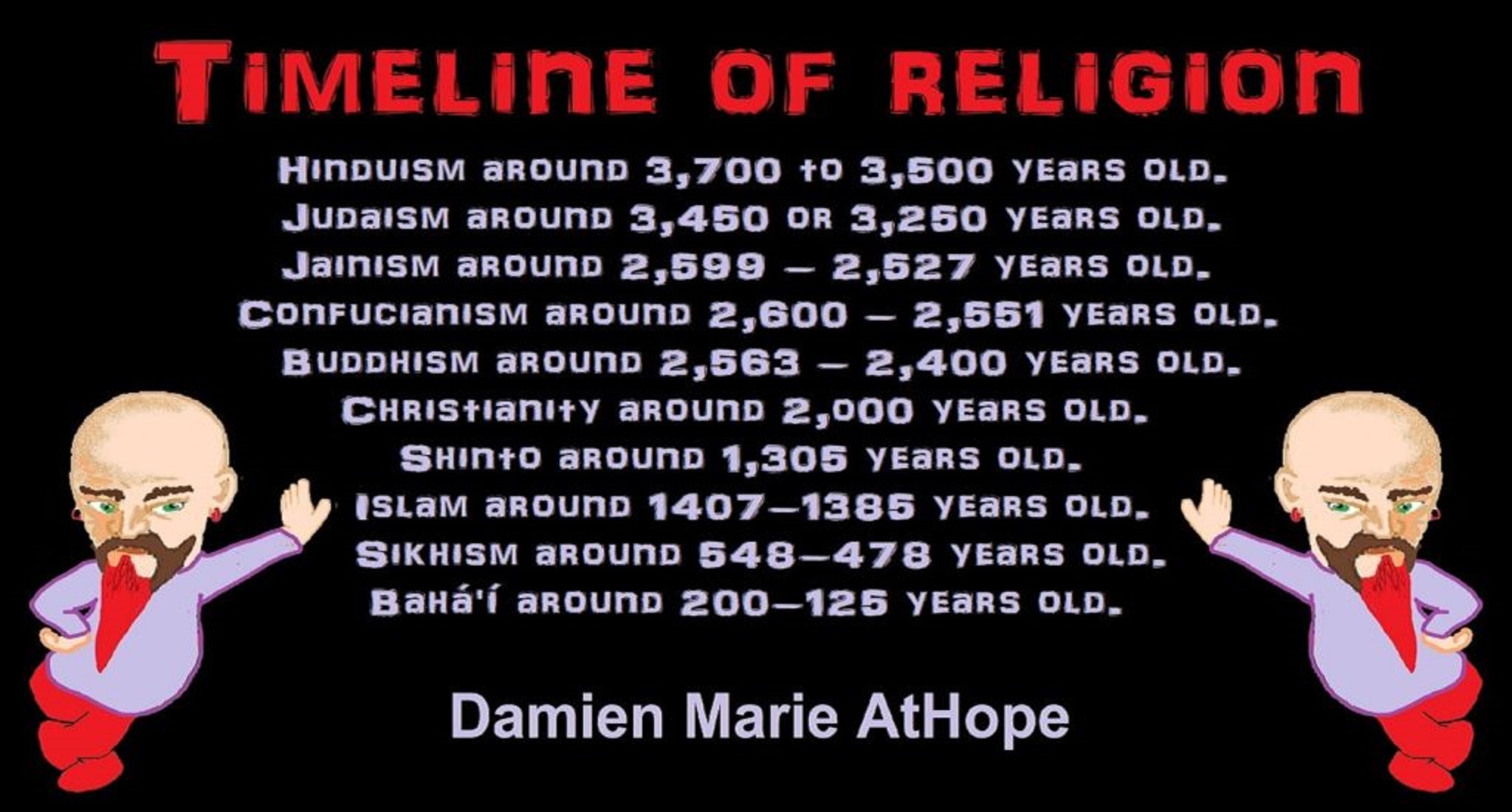
Hinduism around 3,700 to 3,500 years old. ref
Judaism around 3,450 or 3,250 years old. (The first writing in the bible was “Paleo-Hebrew” dated to around 3,000 years ago Khirbet Qeiyafa is the site of an ancient fortress city overlooking the Elah Valley. And many believe the religious Jewish texts were completed around 2,500) ref, ref
Judaism is around 3,450 or 3,250 years old. (“Paleo-Hebrew” 3,000 years ago and Torah 2,500 years ago)
“Judaism is an Abrahamic, its roots as an organized religion in the Middle East during the Bronze Age. Some scholars argue that modern Judaism evolved from Yahwism, the religion of ancient Israel and Judah, by the late 6th century BCE, and is thus considered to be one of the oldest monotheistic religions.” ref
“Yahwism is the name given by modern scholars to the religion of ancient Israel, essentially polytheistic, with a plethora of gods and goddesses. Heading the pantheon was Yahweh, the national god of the Israelite kingdoms of Israel and Judah, with his consort, the goddess Asherah; below them were second-tier gods and goddesses such as Baal, Shamash, Yarikh, Mot, and Astarte, all of whom had their own priests and prophets and numbered royalty among their devotees, and a third and fourth tier of minor divine beings, including the mal’ak, the messengers of the higher gods, who in later times became the angels of Judaism, Christianity and Islam. Yahweh, however, was not the ‘original’ god of Israel “Isra-El”; it is El, the head of the Canaanite pantheon, whose name forms the basis of the name “Israel”, and none of the Old Testament patriarchs, the tribes of Israel, the Judges, or the earliest monarchs, have a Yahwistic theophoric name (i.e., one incorporating the name of Yahweh).” ref
“El is a Northwest Semitic word meaning “god” or “deity“, or referring (as a proper name) to any one of multiple major ancient Near Eastern deities. A rarer form, ‘ila, represents the predicate form in Old Akkadian and in Amorite. The word is derived from the Proto-Semitic *ʔil-, meaning “god”. Specific deities known as ‘El or ‘Il include the supreme god of the ancient Canaanite religion and the supreme god of East Semitic speakers in Mesopotamia’s Early Dynastic Period. ʼĒl is listed at the head of many pantheons. In some Canaanite and Ugaritic sources, ʼĒl played a role as father of the gods, of creation, or both. For example, in the Ugaritic texts, ʾil mlk is understood to mean “ʼĒl the King” but ʾil hd as “the god Hadad“. The Semitic root ʾlh (Arabic ʾilāh, Aramaic ʾAlāh, ʾElāh, Hebrew ʾelōah) may be ʾl with a parasitic h, and ʾl may be an abbreviated form of ʾlh. In Ugaritic the plural form meaning “gods” is ʾilhm, equivalent to Hebrew ʾelōhîm “powers”. In the Hebrew texts this word is interpreted as being semantically singular for “god” by biblical commentators. However the documentary hypothesis for the Old Testament (corresponds to the Jewish Torah) developed originally in the 1870s, identifies these that different authors – the Jahwist, Elohist, Deuteronomist, and the Priestly source – were responsible for editing stories from a polytheistic religion into those of a monotheistic religion. Inconsistencies that arise between monotheism and polytheism in the texts are reflective of this hypothesis.” ref
Jainism around 2,599 – 2,527 years old. ref
Confucianism around 2,600 – 2,551 years old. ref
Buddhism around 2,563/2,480 – 2,483/2,400 years old. ref
Christianity around 2,o00 years old. ref
Shinto around 1,305 years old. ref
Islam around 1407–1385 years old. ref

Knowledge to Ponder:
Stars/Astrology:
- Possibly, around 30,000 years ago (in simpler form) to 6,000 years ago, Stars/Astrology are connected to Ancestors, Spirit Animals, and Deities.
- The star also seems to be a possible proto-star for Star of Ishtar, Star of Inanna, or Star of Venus.
- Around 7,000 to 6,000 years ago, Star Constellations/Astrology have connections to the “Kurgan phenomenon” of below-ground “mound” stone/wood burial structures and “Dolmen phenomenon” of above-ground stone burial structures.
- Around 6,500–5,800 years ago, The Northern Levant migrations into Jordon and Israel in the Southern Levant brought new cultural and religious transfer from Turkey and Iran.
- “The Ghassulian Star,” a mysterious 6,000-year-old mural from Jordan may have connections to the European paganstic kurgan/dolmens phenomenon.
“Astrology is a range of divinatory practices, recognized as pseudoscientific since the 18th century, that claim to discern information about human affairs and terrestrial events by studying the apparent positions of celestial objects. Different cultures have employed forms of astrology since at least the 2nd millennium BCE, these practices having originated in calendrical systems used to predict seasonal shifts and to interpret celestial cycles as signs of divine communications. Most, if not all, cultures have attached importance to what they observed in the sky, and some—such as the Hindus, Chinese, and the Maya—developed elaborate systems for predicting terrestrial events from celestial observations. Western astrology, one of the oldest astrological systems still in use, can trace its roots to 19th–17th century BCE Mesopotamia, from where it spread to Ancient Greece, Rome, the Islamicate world and eventually Central and Western Europe. Contemporary Western astrology is often associated with systems of horoscopes that purport to explain aspects of a person’s personality and predict significant events in their lives based on the positions of celestial objects; the majority of professional astrologers rely on such systems.” ref
Around 5,500 years ago, Science evolves, The first evidence of science was 5,500 years ago and was demonstrated by a body of empirical, theoretical, and practical knowledge about the natural world. ref
Around 5,000 years ago, Origin of Logics is a Naturalistic Observation (principles of valid reasoning, inference, & demonstration) ref
Around 4,150 to 4,000 years ago: The earliest surviving versions of the Sumerian Epic of Gilgamesh, which was originally titled “He who Saw the Deep” (Sha naqba īmuru) or “Surpassing All Other Kings” (Shūtur eli sharrī) were written. ref
Hinduism:
- 3,700 years ago or so, the oldest of the Hindu Vedas (scriptures), the Rig Veda was composed.
- 3,500 years ago or so, the Vedic Age began in India after the collapse of the Indus Valley Civilization.
Judaism:
- around 3,000 years ago, the first writing in the bible was “Paleo-Hebrew”
- around 2,500 years ago, many believe the religious Jewish texts were completed
Myths: The bible inspired religion is not just one religion or one myth but a grouping of several religions and myths
- Around 3,450 or 3,250 years ago, according to legend, is the traditionally accepted period in which the Israelite lawgiver, Moses, provided the Ten Commandments.
- Around 2,500 to 2,400 years ago, a collection of ancient religious writings by the Israelites based primarily upon the Hebrew Bible, Tanakh, or Old Testament is the first part of Christianity’s bible.
- Around 2,400 years ago, the most accepted hypothesis is that the canon was formed in stages, first the Pentateuch (Torah).
- Around 2,140 to 2,116 years ago, the Prophets was written during the Hasmonean dynasty, and finally the remaining books.
- Christians traditionally divide the Old Testament into four sections:
- The first five books or Pentateuch (Torah).
- The proposed history books telling the history of the Israelites from their conquest of Canaan to their defeat and exile in Babylon.
- The poetic and proposed “Wisdom books” dealing, in various forms, with questions of good and evil in the world.
- The books of the biblical prophets, warning of the consequences of turning away from God:
- Henotheism:
- Exodus 20:23 “You shall not make other gods besides Me (not saying there are no other gods just not to worship them); gods of silver or gods of gold, you shall not make for yourselves.”
- Polytheism:
- Judges 10:6 “Then the sons of Israel again did evil in the sight of the LORD, served the Baals and the Ashtaroth, the gods of Aram, the gods of Sidon, the gods of Moab, the gods of the sons of Ammon, and the gods of the Philistines; thus they forsook the LORD and did not serve Him.”
- 1 Corinthians 8:5 “For even if there are so-called gods whether in heaven or on earth, as indeed there are many gods and many lords.”
- Monotheism:
- Isaiah 43:10 “You are my witnesses,” declares the LORD, “and my servant whom I have chosen, so that you may know and believe me and understand that I am he. Before me no god was formed, nor will there be one after me.
Around 2,570 to 2,270 Years Ago, there is a confirmation of atheistic doubting as well as atheistic thinking, mainly by Greek philosophers. However, doubting gods is likely as old as the invention of gods and should destroy the thinking that belief in god(s) is the “default belief”. The Greek word is apistos (a “not” and pistos “faithful,”), thus not faithful or faithless because one is unpersuaded and unconvinced by a god(s) claim. Short Definition: unbelieving, unbeliever, or unbelief.

Expressions of Atheistic Thinking:
- Around 2,600 years ago, Ajita Kesakambali, ancient Indian philosopher, who is the first known proponent of Indian materialism. ref
- Around 2,535 to 2,475 years ago, Heraclitus, Greek pre-Socratic philosopher, a native of the Greek city Ephesus, Ionia, on the coast of Anatolia, also known as Asia Minor or modern Turkey. ref
- Around 2,500 to 2,400 years ago, according to The Story of Civilization book series certain African pygmy tribes have no identifiable gods, spirits, or religious beliefs or rituals, and even what burials accrue are without ceremony. ref
- Around 2,490 to 2,430 years ago, Empedocles, Greek pre-Socratic philosopher and a citizen of Agrigentum, a Greek city in Sicily. ref
- Around 2,460 to 2,370 years ago, Democritus, Greek pre-Socratic philosopher considered to be the “father of modern science” possibly had some disbelief amounting to atheism. ref
- Around 2,399 years ago or so, Socrates, a famous Greek philosopher was tried for sinfulness by teaching doubt of state gods. ref
- Around 2,341 to 2,270 years ago, Epicurus, a Greek philosopher known for composing atheistic critics and famously stated, “Is God willing to prevent evil, but not able? Then he is not omnipotent. Is he able, but not willing? Then he is malevolent. Is he both able and willing? Then whence cometh evil? Is he neither able nor willing? Then why call him god?” ref
This last expression by Epicurus, seems to be an expression of Axiological Atheism. To understand and utilize value or actually possess “Value Conscious/Consciousness” to both give a strong moral “axiological” argument (the problem of evil) as well as use it to fortify humanism and positive ethical persuasion of human helping and care responsibilities. Because value-blindness gives rise to sociopathic/psychopathic evil.

While hallucinogens are associated with shamanism, it is alcohol that is associated with paganism.
The Atheist-Humanist-Leftist Revolutionaries Shows in the prehistory series:
Show two: Pre-animism 300,000 years old and animism 100,000 years old: related to “Anarchism and Socialism”
Show tree: Totemism 50,000 years old: related to “Anarchism and Socialism”
Show four: Shamanism 30,000 years old: related to “Anarchism and Socialism”
Show five: Paganism 12,000 years old: related to “Anarchism and Socialism”
Show six: Emergence of hierarchy, sexism, slavery, and the new male god dominance: Paganism 7,000-5,000 years old: related to “Anarchism and Socialism” (Capitalism) (World War 0) Elite and their slaves!
Prehistory: related to “Anarchism and Socialism” the division of labor, power, rights, and recourses: VIDEO
Pre-animism 300,000 years old and animism 100,000 years old: related to “Anarchism and Socialism”: VIDEO
Totemism 50,000 years old: related to “Anarchism and Socialism”: VIDEO
Shamanism 30,000 years old: related to “Anarchism and Socialism”: VIDEO
Paganism 12,000 years old: related to “Anarchism and Socialism” (Pre-Capitalism): VIDEO
Paganism 7,000-5,000 years old: related to “Anarchism and Socialism” (Capitalism) (World War 0) Elite and their slaves: VIEDO
Paganism 5,000 years old: progressed organized religion and the state: related to “Anarchism and Socialism” (Kings and the Rise of the State): VIEDO
Paganism 4,000 years old: related to “Anarchism and Socialism” (First Moralistic gods, then the Origin time of Monotheism): VIEDO
I do not hate simply because I challenge and expose myths or lies any more than others being thought of as loving simply because of the protection and hiding from challenge their favored myths or lies.
The truth is best championed in the sunlight of challenge.
An archaeologist once said to me “Damien religion and culture are very different”
My response, So are you saying that was always that way, such as would you say Native Americans’ cultures are separate from their religions? And do you think it always was the way you believe?
I had said that religion was a cultural product. That is still how I see it and there are other archaeologists that think close to me as well. Gods too are the myths of cultures that did not understand science or the world around them, seeing magic/supernatural everywhere.
I personally think there is a goddess and not enough evidence to support a male god at Çatalhöyük but if there was both a male and female god and goddess then I know the kind of gods they were like Proto-Indo-European mythology.
This series idea was addressed in, Anarchist Teaching as Free Public Education or Free Education in the Public: VIDEO
Our 12 video series: Organized Oppression: Mesopotamian State Force and the Politics of power (9,000-4,000 years ago), is adapted from: The Complete and Concise History of the Sumerians and Early Bronze Age Mesopotamia (7000-2000 BC): https://www.youtube.com/watch?v=szFjxmY7jQA by “History with Cy“
Show #1: Mesopotamian State Force and the Politics of Power (Samarra, Halaf, Ubaid)
Show #2: Mesopotamian State Force and the Politics of Power
Show #3: Mesopotamian State Force and the Politics of Power (Uruk and the First Cities)
Show #4: Mesopotamian State Force and the Politics of Power (First Kings)
Show #5: Mesopotamian State Force and the Politics of Power (Early Dynastic Period)
Show #6: Mesopotamian State Force and the Politics of Power
Show #7: Mesopotamian State Force and the Politics of Power (Sargon and Akkadian Rule)
Show #9: Mesopotamian State Force and the Politics of Power (Gudea of Lagash and Utu-hegal)
Show #12: Mesopotamian State Force and the Politics of Power (Aftermath and Legacy of Sumer)

The “Atheist-Humanist-Leftist Revolutionaries”
Cory Johnston ☭ Ⓐ Atheist Leftist @Skepticallefty & I (Damien Marie AtHope) @AthopeMarie (my YouTube & related blog) are working jointly in atheist, antitheist, antireligionist, antifascist, anarchist, socialist, and humanist endeavors in our videos together, generally, every other Saturday.
Why Does Power Bring Responsibility?
Think, how often is it the powerless that start wars, oppress others, or commit genocide? So, I guess the question is to us all, to ask, how can power not carry responsibility in a humanity concept? I know I see the deep ethical responsibility that if there is power their must be a humanistic responsibility of ethical and empathic stewardship of that power. Will I be brave enough to be kind? Will I possess enough courage to be compassionate? Will my valor reach its height of empathy? I as everyone, earns our justified respect by our actions, that are good, ethical, just, protecting, and kind. Do I have enough self-respect to put my love for humanity’s flushing, over being brought down by some of its bad actors? May we all be the ones doing good actions in the world, to help human flourishing.
I create the world I want to live in, striving for flourishing. Which is not a place but a positive potential involvement and promotion; a life of humanist goal precision. To master oneself, also means mastering positive prosocial behaviors needed for human flourishing. I may have lost a god myth as an atheist, but I am happy to tell you, my friend, it is exactly because of that, leaving the mental terrorizer, god belief, that I truly regained my connected ethical as well as kind humanity.
Cory and I will talk about prehistory and theism, addressing the relevance to atheism, anarchism, and socialism.
At the same time as the rise of the male god, 7,000 years ago, there was also the very time there was the rise of violence, war, and clans to kingdoms, then empires, then states. It is all connected back to 7,000 years ago, and it moved across the world.
Cory Johnston: https://damienmarieathope.com/2021/04/cory-johnston-mind-of-a-skeptical-leftist/?v=32aec8db952d
The Mind of a Skeptical Leftist (YouTube)
Cory Johnston: Mind of a Skeptical Leftist @Skepticallefty
The Mind of a Skeptical Leftist By Cory Johnston: “Promoting critical thinking, social justice, and left-wing politics by covering current events and talking to a variety of people. Cory Johnston has been thoughtfully talking to people and attempting to promote critical thinking, social justice, and left-wing politics.” http://anchor.fm/skepticalleft
Cory needs our support. We rise by helping each other.
Cory Johnston ☭ Ⓐ @Skepticallefty Evidence-based atheist leftist (he/him) Producer, host, and co-host of 4 podcasts @skeptarchy @skpoliticspod and @AthopeMarie
Damien Marie AtHope (“At Hope”) Axiological Atheist, Anti-theist, Anti-religionist, Secular Humanist. Rationalist, Writer, Artist, Poet, Philosopher, Advocate, Activist, Psychology, and Armchair Archaeology/Anthropology/Historian.
Damien is interested in: Freedom, Liberty, Justice, Equality, Ethics, Humanism, Science, Atheism, Antiteism, Antireligionism, Ignosticism, Left-Libertarianism, Anarchism, Socialism, Mutualism, Axiology, Metaphysics, LGBTQI, Philosophy, Advocacy, Activism, Mental Health, Psychology, Archaeology, Social Work, Sexual Rights, Marriage Rights, Woman’s Rights, Gender Rights, Child Rights, Secular Rights, Race Equality, Ageism/Disability Equality, Etc. And a far-leftist, “Anarcho-Humanist.”
I am not a good fit in the atheist movement that is mostly pro-capitalist, I am anti-capitalist. Mostly pro-skeptic, I am a rationalist not valuing skepticism. Mostly pro-agnostic, I am anti-agnostic. Mostly limited to anti-Abrahamic religions, I am an anti-religionist.
To me, the “male god” seems to have either emerged or become prominent around 7,000 years ago, whereas the now favored monotheism “male god” is more like 4,000 years ago or so. To me, the “female goddess” seems to have either emerged or become prominent around 11,000-10,000 years ago or so, losing the majority of its once prominence around 2,000 years ago due largely to the now favored monotheism “male god” that grow in prominence after 4,000 years ago or so.
My Thought on the Evolution of Gods?
Animal protector deities from old totems/spirit animal beliefs come first to me, 13,000/12,000 years ago, then women as deities 11,000/10,000 years ago, then male gods around 7,000/8,000 years ago. Moralistic gods around 5,000/4,000 years ago, and monotheistic gods around 4,000/3,000 years ago.
To me, animal gods were likely first related to totemism animals around 13,000 to 12,000 years ago or older. Female as goddesses was next to me, 11,000 to 10,000 years ago or so with the emergence of agriculture. Then male gods come about 8,000 to 7,000 years ago with clan wars. Many monotheism-themed religions started in henotheism, emerging out of polytheism/paganism.

Damien Marie AtHope (Said as “At” “Hope”)/(Autodidact Polymath but not good at math):
Axiological Atheist, Anti-theist, Anti-religionist, Secular Humanist, Rationalist, Writer, Artist, Jeweler, Poet, “autodidact” Philosopher, schooled in Psychology, and “autodidact” Armchair Archaeology/Anthropology/Pre-Historian (Knowledgeable in the range of: 1 million to 5,000/4,000 years ago). I am an anarchist socialist politically. Reasons for or Types of Atheism
My Website, My Blog, & Short-writing or Quotes, My YouTube, Twitter: @AthopeMarie, and My Email: damien.marie.athope@gmail.com

